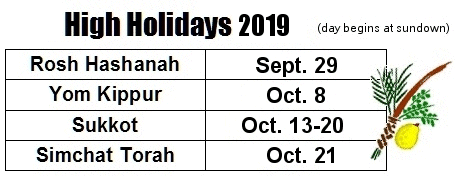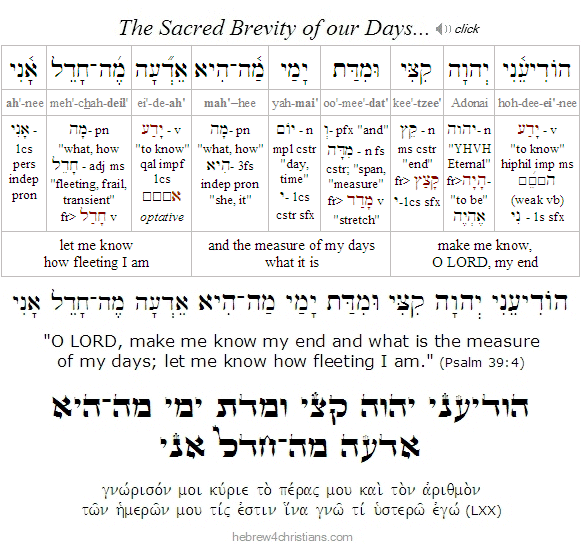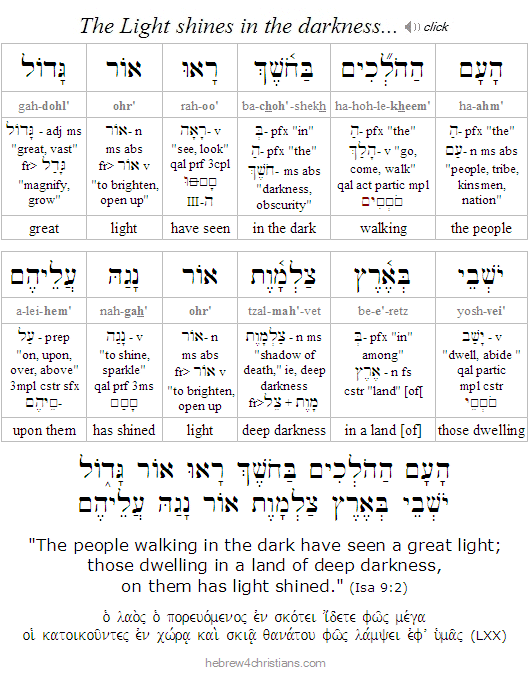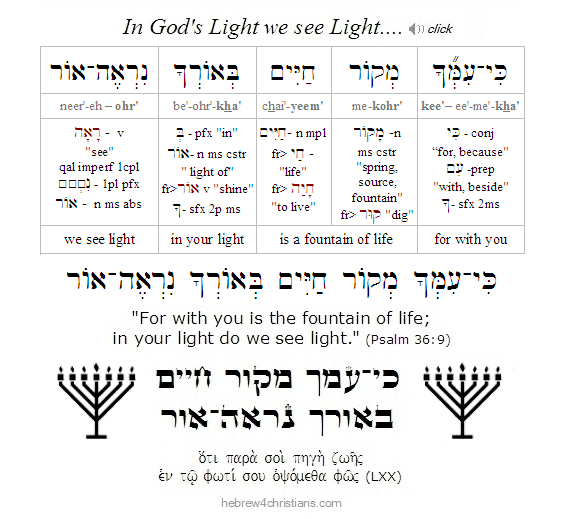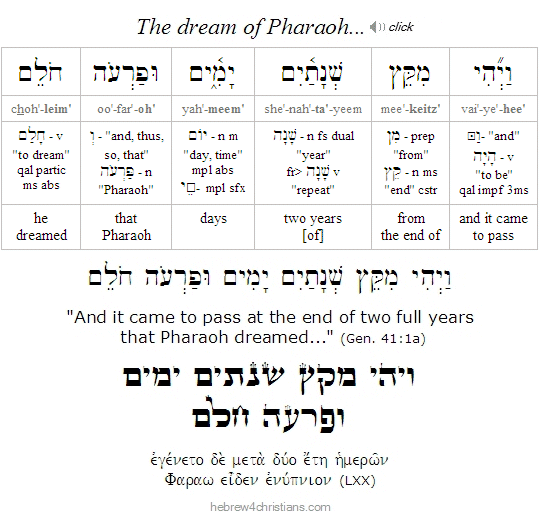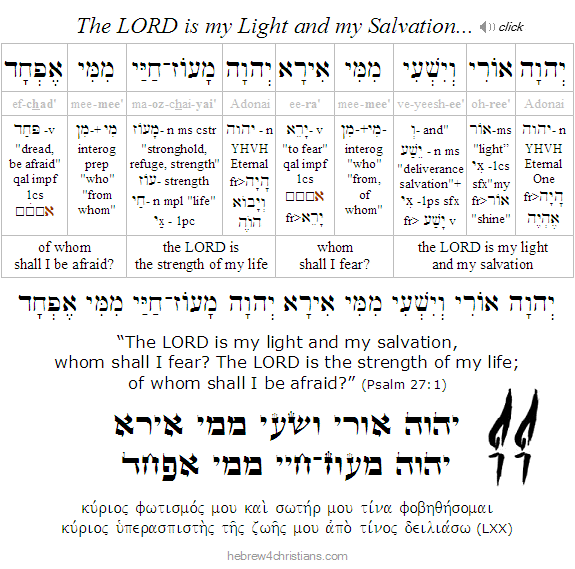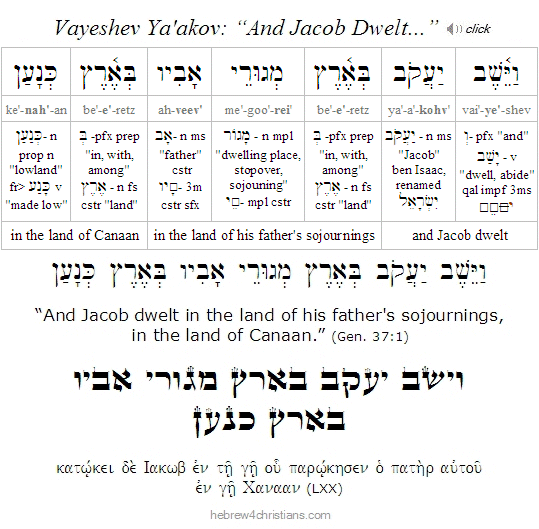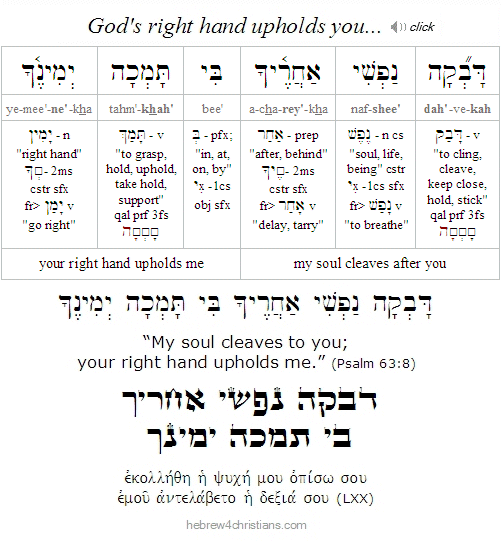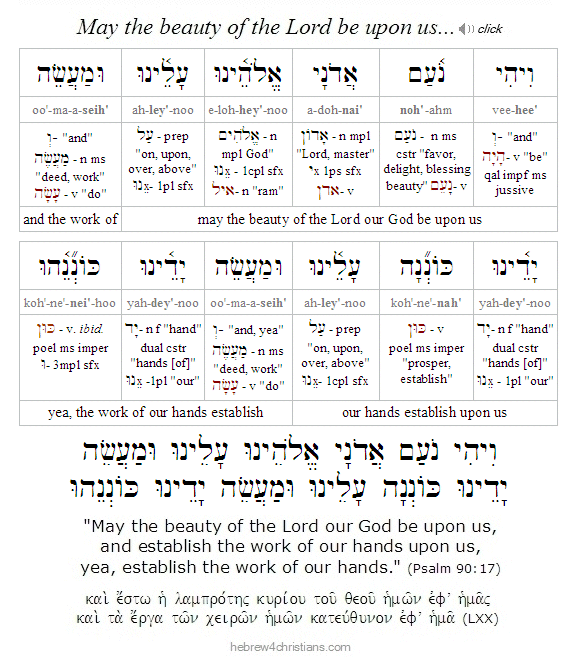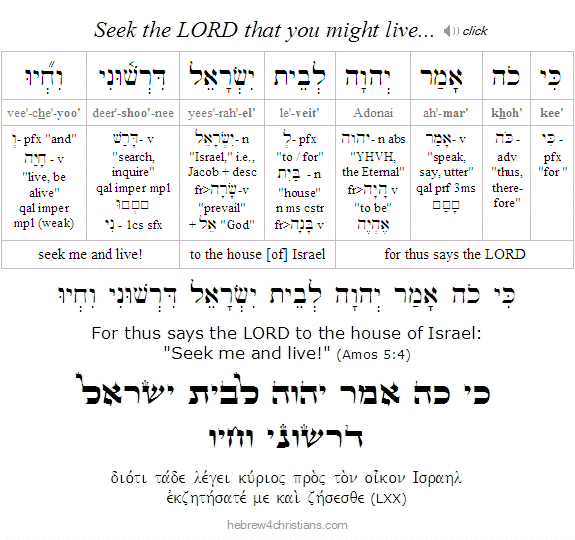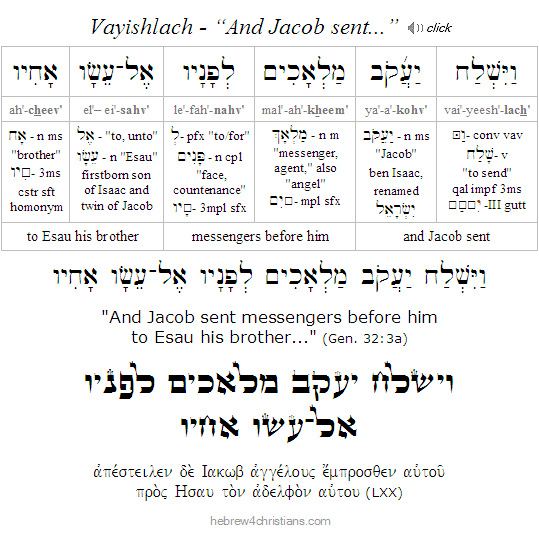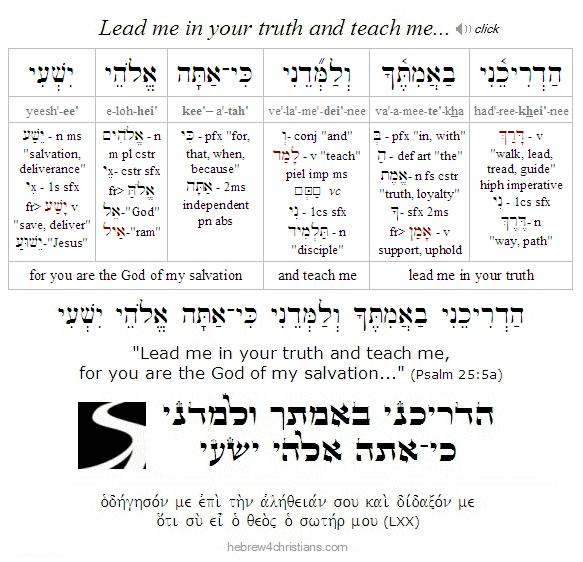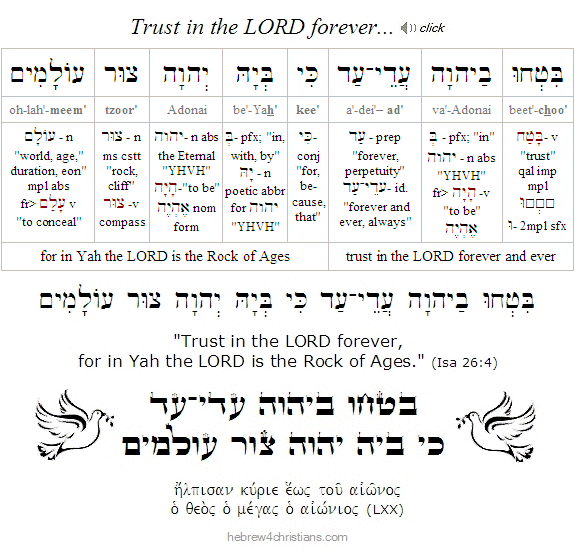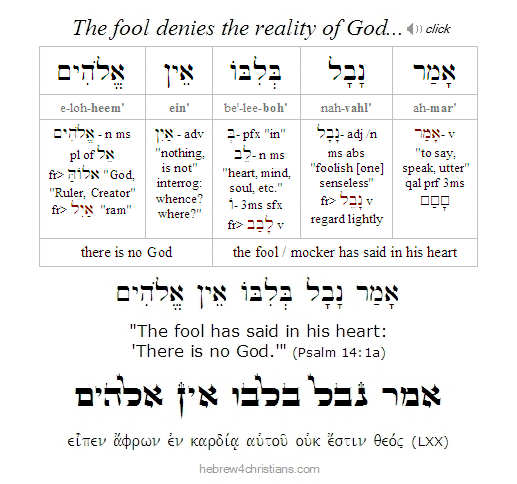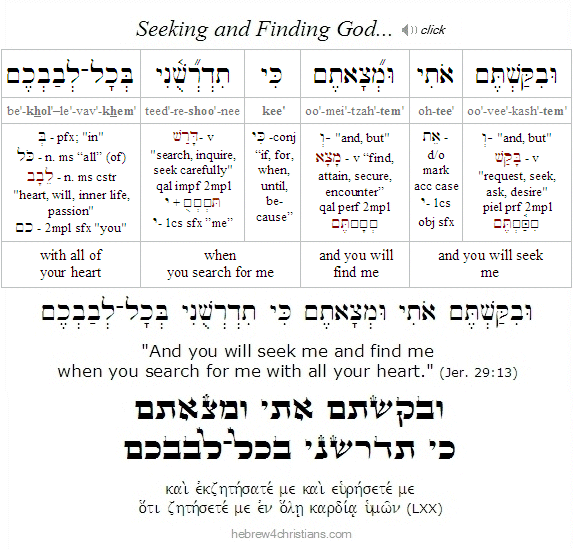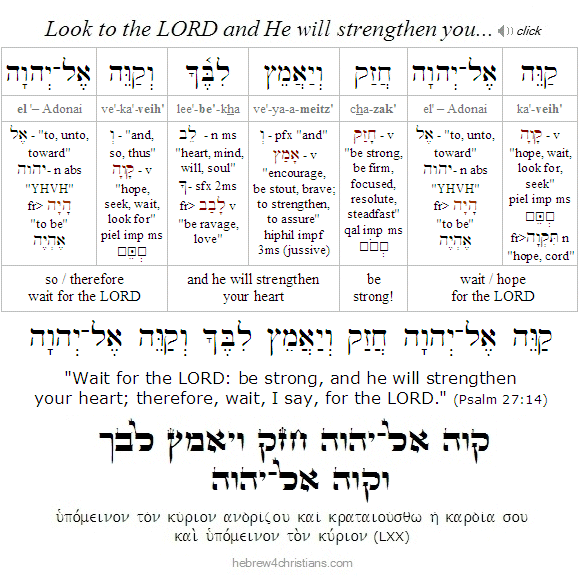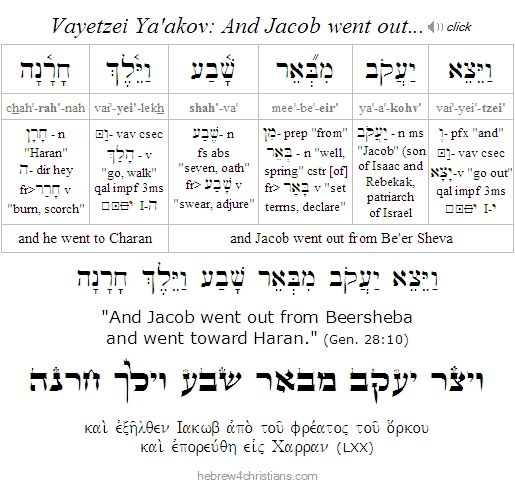|
Jewish Holiday Calendar
For December 2019 site updates, please scroll past this entry....
The Torah divides the calendar into two symmetrical halves: the Spring and the Fall, indicating the two advents of Messiah. The Biblical year officially begins during the month of the Passover from Egypt (called Rosh Chodashim, see Exod. 12:2), and the spring holidays of Passover, Unleavened Bread, and Firstfruits both recall our deliverance from Egypt and also our greater deliverance given by means of the death, burial, and resurrection of the Messiah, the great Passover Lamb of God. Yeshua was crucified on erev Pesach, buried during Unleavened Bread, and was resurrected on Yom Habikkurim (Firstfruits). The holiday of Shavuot (i.e., "Pentecost") both commemorates the revelation of the Torah at Sinai as well as the revelation of the Ruach HaKodesh (Holy Spirit) at Zion, in fulfillment of the promise given by our Lord....
The intermediate months of summer end with the advent of the sixth month of the calendar, called the month of Elul, which recalls the time Moses interceded on behalf of Israel after the sin of the Golden Calf. To commemorate this time of our history, we likewise focus on teshuvah (repentance) in anticipation of Rosh Hashanah and especially in anticipation of Yom Kippur, the great "Day of Atonement." In Jewish tradition the 30 days of Elul are combined with the first ten days of the seventh month (called the "Days of Awe") to set apart "Forty Days of Teshuvah" leading up to the Day of Forgiveness for Israel. Immediately following Yom Kippur, the mood changes as we begin preparing for a joyous week-long celebration called Sukkot ("Tabernacles") that concludes with the holiday of Simchat Torah.
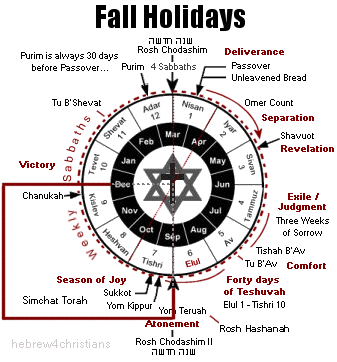 |
The Fall Holidays:

The fall festivals prophetically indicate the Day of the LORD, the second coming of Yeshua, the great national turning of the Jewish people, and the establishment of the reign of the Messiah upon the earth during the Millennial Kingdom in the world to come.
Note that in accordance with tradition, holiday dates begin at sundown. Moreover, some holidays may be postponed one day if they happen to fall on the weekly Sabbath:
1. Month of Tishri (Sun. Sept. 29th [eve] - Mon. Oct. 28th [day]) - Fall holidays begin
2. Month of Cheshvan (Mon. Oct. 29th [eve] - Wed. Nov. 27th [day])
- Four Sabbaths: Noach, Lekh-Lekha, Vayera, Chayei Sarah
- Yom Ha'Aliyah - Honoring Israel's immigrants (Mon. Nov. 5th; Cheshvan 7)
- Sigd - 50th day after Yom Kippur; Ethiopian Jewish holiday (Tues. Nov. 26th)
3. Month of Kislev (Wed. Nov. 27th [eve] - Fri. Dec. 27th [day])
- Four Sabbaths: Toldot, Vayetzei, Vayishlach, Vayeshev
- Winter Solstice: Fri. Dec. 21st Kislev 23)
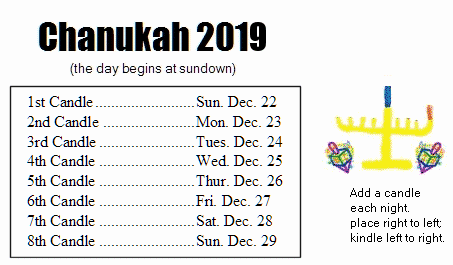
- Dates for Chanukah 2019 (5780):
- 1st Chanukah candle - Sun. Dec. 22nd [i.e., Kislev 25]
- 2nd Chanukah candle - Mon. Dec. 23rd [i.e., Kislev 26]
- 3rd Chanukah candle: Teus. Dec. 24th [i.e., Kislev 27]
- 4th Chanukah candle: Wed. Dec. 25th [i.e., Kislev 28]
Christmas: Wed. Dec. 25th (Kislev 28, 5780)
- 5th Chanukah candle: Thurs. Dec. 26th [i.e., Kislev 29]
4. Month of Tevet (Fri., Dec. 27th [eve] - Sun. Jan. 26th [day])
- Four Sabbaths: Miketz, Vayigash, Vayechi, Shemot
- Dates for Chanukah (continued):
- 6th Chanukah candle: Fri. Dec. 27th [i.e., Kislev 30] (Chodesh Chanukah)
- 7th Chanukah candle: Sat. Dec. 28th [i.e., Tevet 1]
- 8th Chanukah candle: Sun. Dec. 29th [Tevet 2] Zot Chanukah
- Asarah B'Tevet - Tues. Jan. 7th (dawn), 2020; fast over the seige of Jerusalem
- Secular New Year: Wed. Jan. 1st, 2020 (Tevet 4, 5780)
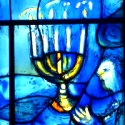 |
Note: For more about the dates of these holidays see the Calendar pages....
December 2019 Updates
Turning to a New Year...

12.31.19 (Tevet 3, 5780) The Book of Lamentations is an acrostic (alphabetic) poem that begins with the Hebrew letter Aleph (א) in the word "eichah" (אֵיכָה), which also marks the Hebrew name of the book. "How (eichah) lonely sits the city that once was full of people!" (Lam. 1:1). The sages note that this word "how" (i.e., eichah) could also be read as "where are you?" (i.e., ayeka: אַיֶּכָּה), God's first word spoken to Adam after he broke covenant in the Garden (Gen. 3:9). Note that God's question is often our own: "Where are you? Where are you, God? Are you here, in the midst of this tedious moment? Do you know my loneliness, my ache for love? Do you understand the troubles of my heart?" And yet how many people have faith that God's call is one of comfort and restoration? God uses our loneliness ("how lonely...") to search our hearts, asking each of us, ayeka – "Where are you?" "Why have you turned away from me and chosen a state of exile?" Our haunting sense of God's absence impels us to seek for him... God awaits our only possible response, "Hashivenu!" -- an imperative (urgent appeal) for the grace to repent: "Turn us back to yourself, O LORD, so that we may return to you; renew our days as of old" (Lam. 5:21).
הֲשִׁיבֵנוּ יְהוָה אֵלֶיךָ וְנָשׁוּבָה
חַדֵּשׁ יָמֵינוּ כְּקֶדֶם
ha·shee·vei'·noo · Adonai · ei·ley'·kha · ve·na·shoo'·vah
cha·deish · ya·mei'·noo · ke·ke'·dem

"Turn us back to yourself, O LORD, and we shall be turned;
renew our days as of old" (Lam. 5:21)
Hebrew Study Card
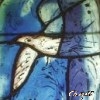
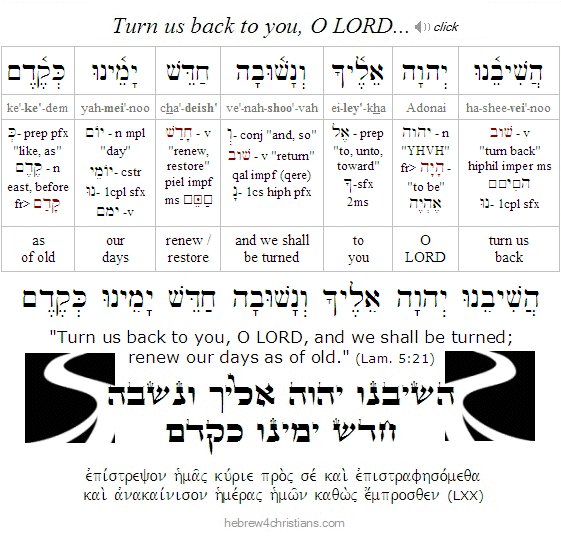
Our response to the questioning love of the LORD is called teshuvah ("turning [shuv] to God"). Teshuvah is an "answer" to a shelah, or a question. God's love for us is the question, and our teshuvah – our turning of the heart toward Him – is the answer.
Chanukah 5780 Pictures
Sacred Brevity of Life...
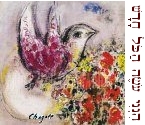
12.31.19 (Tevet 3, 5780) Many people live as if God doesn't exist and that death does not occur. Instead of soberly acknowledging that their days are numbered in this world, they act as if they will live forever, and they steadfastly ignore any idea of judgment to come. Yeshua warned us, however, that "nothing is hidden except to be made manifest; nor is anything secret except to come to light" (Mark 4:22). We should tremble before such words. Each of us will give account for what we have done with the time given us (Heb. 9:27; 2 Cor. 5:10; Matt. 12:36). Moses therefore prayed to God: "Teach us to number our days, that we may apply our hearts unto wisdom" (Psalm 90:12). Each soul is given a finite amount of time in this world, and therefore Moses asked God to teach us how to live in light of our ultimate end... For this we need wisdom, which primarily consists of knowledge of the holy (דַעַת קְדשִׁים) and the experience of the awe of the LORD (יִרְאַת יְהוָה, Prov. 9:10). Note then the connection between learning to "number our days" and apprehending the sacredness of life. As we learn to esteem our days, so we discover wisdom for our sojourn to eternity. Reflecting on the brevity of life awakens us to consciously reflect upon the course of our lives and to distill the ultimate concerns of our hearts.
Yet how many of us take all this to heart? How many of us "number our days" that we might attain wisdom? Do we appreciate the brief amount of time we are given in this life? When we are young we believe we will live forever. David prayed, "make me know my end and what is the measure of my days; let me know how fleeting I am!" (Psalm 39:4).
Life in this world is called chayei sha'ah (i.e., חיי שעה, "fleeting life") in Jewish thought. Chayei sha'ah is the life of "vanity of vanities" (הֲבֵל הֲבָלִים), a vapor that soon dissipates into the winds and vicissitudes of time. In light of eternity, King David reminds us that our days are as a few "handbreadths." We walk as "shadows" through the byways and wasteplaces of this world (Psalm 39:5; Psalm 89:47).
God sometimes brings affliction into our lives to help us regain a godly perspective. This is meant to shock us out of our lethargy. King David was at the point of death itself. He felt frail and alone. Like Solomon, he questioned the meaning of life. What good are riches or the esteem of others when everything is fading like a flower of the field (Psalm 103:15)? David realized that life itself is a kind of suffering. All of creation groans (Rom. 8:22).
The turning point came when David realized he was asking the wrong kind of question. Since the things of life are fleeting and empty, a mere change of circumstance is never enough to satisfy the heart's cry for lasting love. It is not a question of seeking a "what," but rather a "Who." Instead of focusing on external (and superficial) conditions, King David inwardly accepted the Presence of God in everything: "And now, my Lord, to what do I look? My hope is for you" (Psalm 39:7).
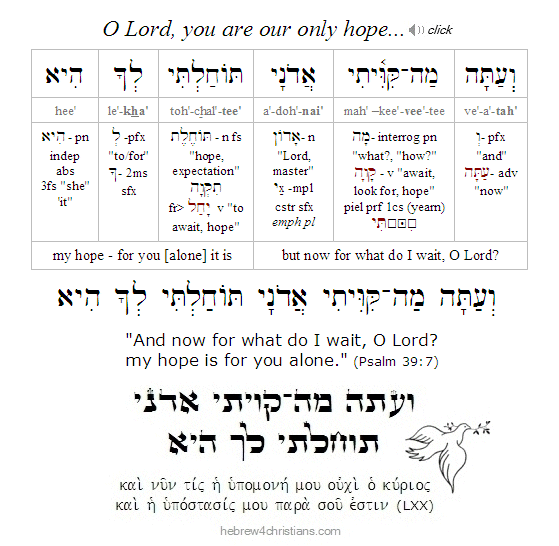 |
After Adam sinned in the Garden, he vainly tried to hide himself until he heard the Voice of God calling out: אַיֶּכָּה - ayeka? – "Where are you?" That is the question for each soul as we learn to discern the direction of our lives. Where are you today, and where are going? Our days are numbered, friend, and it is of utmost importance to apply our hearts unto wisdom while we still have the time and strength to do so. "No one knows the day or hour..." May God help us to learn how to make our days count for eternity, to have a weight of glory that will shine in the world to come. Amen.
Truth sets us free...
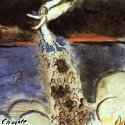
12.31.19 (Tevet 3, 5780) When Yeshua said that the truth would "set us free" (ἐλευθερώσει), he was referring to the acceptance of the Witness of Divine Reality (i.e., the Word, Breath, Spirit, Voice, Message, Meaning, and Love of God) that delivers us from the lies we habitually tell ourselves. If you "persevere in my word" (μείνητε ἐν τῷ λόγῳ τῷ ἐμῷ) he said, "then you are my disciples indeed, and you will know the truth, and the truth will set you free" (ἡ ἀλήθεια ἐλευθερώσει ὑμᾶς, John 8:31-32). In other words, as we identify with his vision and redemptive mission, we will "be free indeed" from the tohu va'vohu (Gen. 1:2) – the "chaos and unreality" – that inescapably besets the way of the lie... We will be delivered from vanity and delusions of this world and its diseased affections; we will be set free from the need to justify ourselves by religion (perfectionism); we will no longer crave other people's approval; we will not be moved by the crowd and its pressures; we will find courage to face our challenges without resorting to escapism; and we will learn how to experience peace even when we encounter frustrations. Despite our daily struggles and tests, we will be released from bondage to anger and resentment as we yield our will in trust that God is working all things together for our ultimate good (Rom. 8:28). Genuine freedom is not an "accidental property" of the heart, depending on "luck" or "fortune," but instead is a decision to believe in the Reality of the salvation of God given in Yeshua our LORD.
 |
Chanukah 5780 Pictures
Signs of the Time...
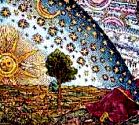
12.30.19 (Tevet 2, 5780) Despite the evident and manifold increase in the various prophetic "signs" that herald the return of Messiah, many people today seem apathetic and functionally agnostic regarding the imminence of the "End of Days..." Ironically, this indifference itself indicates the nearness of the hour, since Yeshua noted that just before the time of his return many would fall away because of a chosen ignorance of the truth and pervasive numbness of heart (Matt. 24:12). Therefore he rhetorically asked his followers, "When the Son of Man comes, will he find faith on earth?" (Luke 18:8). We are repeatedly urged to watch, to be vigilant, and to be ready: "Therefore you also must be ready, for the Son of Man is coming at an hour you do not expect" (Matt. 24:44).
יָקוּם אֱלהִים יָפוּצוּ אוֹיְבָיו
וְיָנוּסוּ מְשַׂנְאָיו מִפָּנָיו
yah·koom · e·loh·heem · yah·foo'·tzoo · oh·ye·vahv
ve·yah·noo'·soo · mei·san·ahv · mee·pah·nahv

"God shall arise and scatter his enemies;
those who hate him shall flee from his Presence."
(Psalm 68:1)
Hebrew Study Card

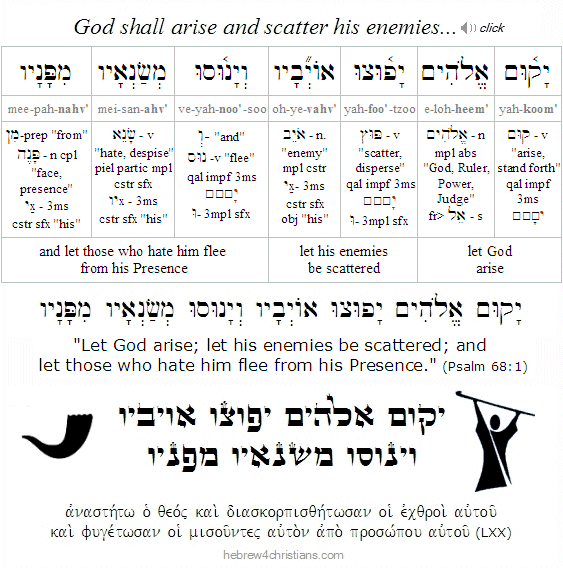
What does Chanukah mean if not resisting the darkness of the world's ignorance -- the matrix that seeks to coddle the flesh and pretend that there is no need for God's intervention and miracle? This is the victory that has overcome the world-- our faith.
Trust in Dark Hours...

12.29.19 (Tevet 1, 5780) "Let him who walks in darkness and has no light trust in the Name of the LORD (יִבְטַח בְּשֵׁם יְהוָה) and lean upon on his God" (Isa. 50:10). Spiritual darkness is permitted by God for his own sovereign purposes, perhaps as a means to teach us to abandon ourselves to his care. Trusting in God (i.e., bittachon - בִּטָּחוֹן) does not mean that we are obligated to affirm that this is "the best of all possible worlds," though it does mean we believe that eventually God will wipe away every tear and make all things right. Bittachon is a word for this world, which says, "Though he slay me, I will trust in him..." We do not need to trust for what is seen in this world but for an unseen good (Rom. 8:24). Those who call upon the LORD can trust not only in concealed good behind ambiguous appearances ("all things work together for good") but also in a future, real, substantive good that will one day be clearly manifest for us all... We fight the "good fight" of faith, which is a worthy struggle that eventually is realized for blessing. Meanwhile, we pray to God to be kept from such depth of sorrow that leads to sickness, darkness and despair.
מִי בָכֶם יְרֵא יְהוָה שׁמֵעַ בְּקוֹל עַבְדּוֹ
אֲשֶׁר הָלַךְ חֲשֵׁכִים וְאֵין נגַהּ לוֹ
יִבְטַח בְּשֵׁם יְהוָה וְיִשָּׁעֵן בֵּאלהָיו
mee · va·khem · ye·rei · Adonai · shoh·mei'·a · be·kohl · av·doh?
a·sher · hah·lakh · cha·shei·kheem · ve·ein · noh'·gah · loh?
yeev·tach · be·shem · Adonai · ve·yee·shah·ein · be·loh·hahv

"Who among you fears the LORD and obeys the voice of his Servant?
Let him who walks in darkness and has no light
trust in the Name of the LORD and lean upon on his God."
(Isa. 50:10)
Hebrew Study Card
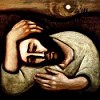
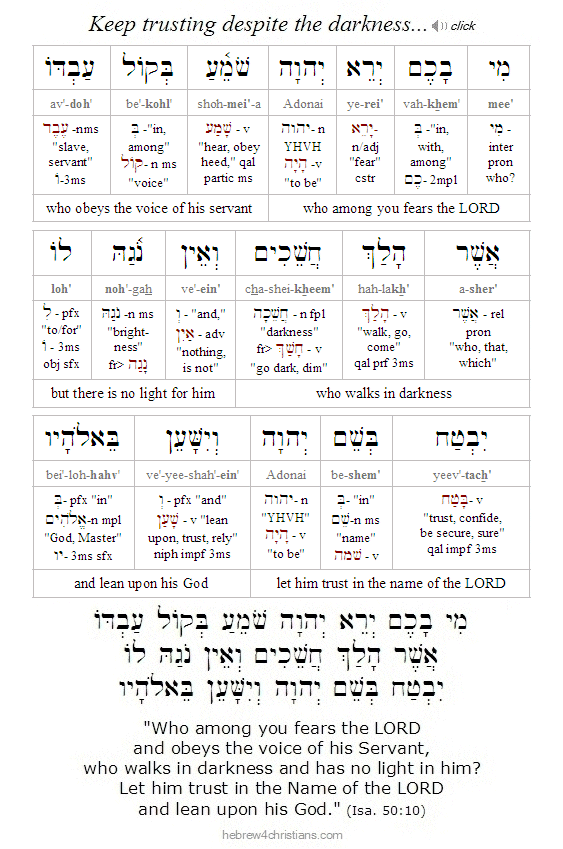
If you ask for bread, your heavenly Father will not give you a stone... Only God can deliver us from our "disordered loves" to take hold of what is truly essential. All we can do is ask, and keep on asking - even as we struggle on, despite ourselves, despite our losses... And we often revisit our sins over and over until we become "sick of our sickness," that is, until we begin to understand what our heart really needs. It's as if we are constantly being asked, "Is this what you want?" and our choices confess the truth... Only God does the miracle of real change within the human heart - only God can give life from the dead!
The Providential Prince...
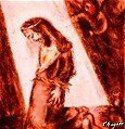
12.29.19 (Tevet 1, 5780) Though Joseph was given great wisdom to interpret Pharaoh's dreams and to serve as Egypt's regent, his foresight did not prevent the famine from coming in the first place, and the testing that came was part of God's hidden plan. The role of the true prophet is to bear witness to God's truth and to shepherd God's people through the unfolding vision. Joseph could not control the outcome, though he worked within the context of revelation to bring about deliverance. In both the "fat times and the lean" we look to God for comfort and strength: We "show up" every day to ready ourselves for what is coming, even if we currently find ourselves in darkness. We refuse fear because we trust that the LORD our God is guiding our way...
The term hashgachah pratit (הַשְׁגָּחָה פְּרָטִית) refers to God's personal supervision of our lives (hashgachah means "supervision," and pratit means "individual" or "particular"). Since He is the Master of the Universe, God's supervision and providence reaches to the smallest of details of creation - from subatomic particles to the great motions of the cosmos. God not only calls each star by its own name (Psalm 147:4), but knows each particular wildflower and sparrow (Matt. 6:28-30, 10:29). Each person created in the likeness of God is therefore under the direct, personal supervision of God Himself -- whether that soul is conscious of that fact or not. As Yeshua said, even the hairs on your head are all numbered (Matt. 10:30). The God of Israel is also called אלהֵי הָרוּחת לְכָל־בָּשָׂר / Elohei ha-ruchot lekhol-basar: "The God of the spirits of all flesh" (Num. 16:22), and that means that he has providential purposes for every human being brought into this world (John 1:4).
The Revelation of Joseph...
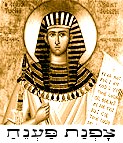
12.29.19 (Tevet 1, 5780) In this week's Torah portion (i.e., parashat Vayigash) we read about Joseph's dramatic revelation of his identity to his long lost brothers. Recall that Benjamin had been framed for stealing the Viceroy's chalice and was arrested and brought before Joseph for immediate judgment. Judah then "drew near" (vayigash) and offered to bear the penalty for his brother, pleading with Joseph to spare his aged father the loss of yet another son. Joseph was so moved by Judah's act of mesirat nefesh (self-sacrifice) that he decided the time had finally come for him to reveal his identity to his brothers. After clearing the room, he began speaking in Hebrew and said, אֲנִי יוֹסֵף הַעוֹד אָבִי חָי / ani Yosef, ha'od avi chai / "I am Joseph; is my father alive?" When the brothers drew back in dismay, Joseph said, "Draw near to me, please" (from the same verb nagash) and explained how God providentially brought him to Egypt to save the family's life....
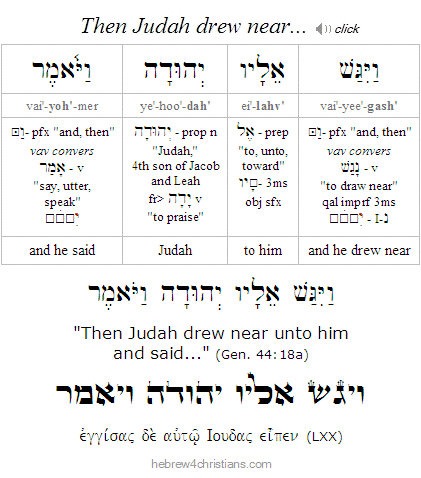 |
The revelation of Joseph and his reconciliation with his brothers is a prophetic picture of the acharit hayamim (end of days) when the Jewish people will come to understand that Yeshua is indeed the One seated at the right hand of the majesty on high as Israel's Deliverer. At that time Yeshua will speak comforting words to His long lost brothers and restore their place of blessing upon the earth. Indeed, the entire story of Joseph is rich in prophetic insight regarding our Lord and Savior. Vayigash (וַיִּגַּשׁ) means "and he drew near," referring first to Judah's intercession for the sins of his brothers, and then to Joseph's reciprocal desire for the brothers to draw near to him (Gen. 44:18, 45:4). Joseph initiated the reconciliation by saying, גְּשׁוּ־נָא אֵלַי / g'shu na elai - "Please draw near to me," and indeed there is a play on the verb nagash (נָגַשׁ), "draw near," throughout this story. Yeshua is depicted both in Judah's intercession (as the greater Son of Judah who interceded on behalf of the sins of Israel) and in Joseph's role as the exalted Savior of the Jewish people in time of tribulation. When Joseph disclosed himself and asked, "Is my father alive," we hear Yeshua evoking the confession of faith from the Jewish people: "I am Yeshua: do you now understand that My Father is alive?" Upon His coming revelation, all Israel will confess that indeed God the Father is "alive" and has vindicated the glory of His Son.
The Miketz Prophecies...
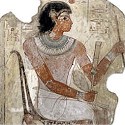
12.27.19 (Kislev 28, 5780) Our Torah portion this week is called "Miketz" (מקץ), a word that means "at the end," and therefore it points to the prophetic future (i.e., the "end of days" or acharit ha-yamim). Just as Joseph was a "dreamer" who was betrayed by his brothers but was promoted to a place of glory by the hidden hand of God, so Yeshua was betrayed by his people yet was exalted over all the nations (מֶלֶךְ הַגּוֹיִם). And just as Joseph later disguised himself as a "stranger" and an "Egyptian" to his brothers but was finally revealed to be their savior, so will the Jewish people eventually come to see that Yeshua is the true Savior of Israel. Then will come true the hope of Rav Sha'ul (the Apostle Paul) who wrote, "And so all Israel shall be saved: as it is written, 'There shall come out of Zion the Redeemer (גּוֹאֵל) who shall turn away ungodliness from Jacob'" (Rom. 11:26).
For more on this important topic, see "Joseph and his brothers."
About the Secular New Year...
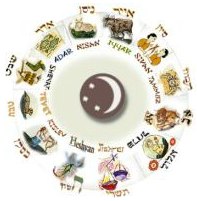
12.27.19 (Kislev 28, 5780) In most countries of the world, "New Year's Day" is usually celebrated (usually as a "carnival" or revelry) on January 1st, though this date comes from the arbitrary decree of the consuls of ancient (and pagan) Rome -- certainly not from anything taught in the Torah and the Hebrew Scriptures. According to Torah, however, there are two mirroring "New Years" observed during the year. The first occurs two weeks before Passover (Nisan 1) and the second occurs ten days before Yom Kippur (Tishri 1). The first is called Rosh Chodashim (see Exod. 12:2), which commemorates the month of the redemption of the Jewish people (i.e., the month Yeshua was sacrificed for our sins), whereas the second is called Yom Teru'ah that is associated with the "Feast of Ingathering" at the "end of the year" (Exod. 23:16, 34:22). Later Yom Terua'h became known as Rosh Hashanah ("the head of the year") which began a ten-day "trial" of humanity climaxing on the Day of Atonement (Yom Kippur).
The two "new years" of the Jewish calendar mirror each other and reveal the two advents of Messiah. For more on the secular New Year and its relationship to the calendar of Torah, see the page, "The Gregorian Calendar and Pagan Assumptions."
Personal Note: I have been in bed all day with a high fever and breathing issues, unable to work much at all. I wish you all Shabbat Shalom and Chanukah Same'ach. - John
Personal Prayer Request...

12.26.19 (Kislev 27, 5780) Shalom friends; here is a brief update from this side of the screen. My son Judah Avraham is healing from his surgery and is scheduled to go back to the surgeon to have his stitches removed and to have another cast put on in about ten days. He is doing well, only needing some pain relief at night (children's Motrin), and has a good attitude. Judah really loves Chanukah, and we've been careful to light candles every night this week. Emanuel, however, is very sick with a high fever and a persistent croup cough. We are taking him to the doctor today to have him looked at and to have a swab done to see if he has strep throat... As for me (John), I am now running a high fever as well and have swollen and sore throat. I have gargled with salt water and iodine and that helps a bit, but I am really wiped out with all-over body aches, so I will go with Emanuel to check whether I might also have a strep infection. Josiah is doing better, though he still says his ear infection is bothering him, so I will try to get him over to an ENT doctor for a follow up. Thank you for your prayers for my family, especially for the children. Shalom and happy Chanukah.
His Star Still Leads...

12.24.19 (Kislev 25, 5780) "A Star shall lead from of Jacob..." Amazingly, the pagan seer Balaam – who may have been the forebear of the "magi of the east" (Matt. 2:1-2) – foresaw the coming of the Messiah: "I see him, but not now; I behold him, but not near: a Star shall lead from Jacob (דָּרַךְ כּוֹכָב מִיַּעֲקב), and a Ruler shall arise from Israel" (Num. 24:17). Balaam's prophecy described the coming of the Messiah and his reign in two distinct aspects: "A star from Jacob shall lead the way (i.e., דָּרַךְ)," this refers to Messiah's first coming as the way of life (John 14:6), "and a scepter (i.e., Ruler) shall ascend (וְקָם שֵׁבֶט) from Israel," this refers to Messiah's second coming to establish the kingdom after the final redemption.
דָּרַךְ כּוֹכָב מִיַּעֲקב
וְקָם שֵׁבֶט מִיִּשְׂרָאֵל
da·rakh · ko·khav · mee·ya·a·kov
ve·kahm · she'·vet · mee·yees·ra·el

"A Star shall lead from Jacob,
and a Ruler shall rise from Israel"
(Num. 24:17)

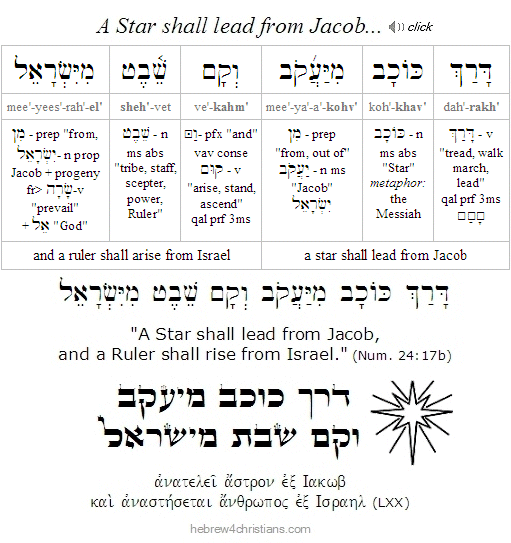
As I mentioned the other day, the very purpose and goal of salvation is for us "to turn from darkness to light and from the power of Satan to God" (Acts 26:18). Hashivenu, Adonai... When the darkness seems to enshroud your way, pray for God's star light to be rekindled within your soul. Happy holidays and love to you, friends.
Love not the World...

12.24.19 (Kislev 25, 5780) Regarding the verse, "And the earth was without form and void (תהוּ וָבהוּ), and darkness was upon the surface of the deep" (Gen. 1:2), the midrash comments: "Darkness – these are the Greeks who darkened the eyes of the Jewish nation with their evil decrees." The utter darkness of Hellenistic thought came disguised as an angel of light, as "enlightened" thinking, but whenever such humanism usurps the authority of divine revelation, the result is exile and darkness. Indeed, the very worst kind of exile is to be unaware that you are in exile, to be so blinded that you do not see that you do not see... As Yeshua said, "If the light in you is darkness, how great is the darkness!" (Matt. 6:23); and "be careful lest the light in you be darkness" (Luke 11:35). In the end, the world and its blind lusts will pass away, for it is "tohu" (תּהוּ) - confusion and unreality - but whoever does the will of God abides forever (1 John 2:15-17).
The realm of this "fallen world" -- understood in terms of the "fellowship" (κοινωνία) of darkness -- is something from which we are delivered and of which we are no longer to be enslaved. As it is written, "God has delivered us from the domain of darkness and transferred us to the kingdom of his beloved Son" (Col. 1:13). Likewise Yeshua said, "If you belonged to the world, the world would love you as its own" (John 15:19). In other words, we are "in" but not "of" this world (John 17:15), and though we physically coexist with others in this time-space, we are no longer citizens of this fallen world and its underlying value system. We are not to love this world, nor the things this world values, since doing so embraces a philosophy of life that is at war with the Father and contrary to the truth of eternity (1 John 2:16; James 4:4). The fallen world values "the flesh" and the "desire of the eyes" that is patterned according to the "arrogance of life." In other words, it is a "beauty pageant" that esteems others based on their accidental qualities instead of their inner and essential qualities. In this connection, let me quote from Henri Nouwen regarding slavery to the world and its perverse value system:
At issue here is the question: "To whom do I belong? God or to the world?"... As long as I keep running about asking: "Do you love me? Do you really love me?" I give all power to the voices of the world and put myself in bondage because the world is filled with "ifs." The world says: "Yes, I love you if you are good-looking, intelligent, and wealthy. I love you if you have a good education, a good job, and good connections. I love you if you produce much, sell much, and buy much." There are endless "ifs" hidden in the world's love. These "ifs" enslave me, since it is impossible to respond adequately to all of them. The world's love is and always will be conditional. As long as I keep looking for my true self in the world of conditional love, I will remain "hooked" to the world - trying, failing, and trying again. It is a world that fosters addictions because what it offers cannot satisfy the deepest craving of my heart." (Nouwen: Return of The Prodigal Son; p42-43)
"Love not the world, neither the things of this world" (1 John 2:15). We see then the connection between worldliness and idolatry, since idolatry essentially involves trying to find your identity, your worth, your satisfaction, and your ultimate fulfillment in the realm of the transitory and the finite rather than in God.... We are (rightly) warned against the vices of "worldliness" and are admonished to abstain from popular culture and its spurious values, but note well that worldliness extends well beyond all this, since it concerns understanding the identity and nature of the person as a whole. The fruit of worldliness is the result of being rooted in this world rather than in God's kingdom. The various desires of the human heart - even the desire for "normal things" like personal happiness in this world - may be regarded as entirely "worldly" if they are devoid of submission to God and His rule....
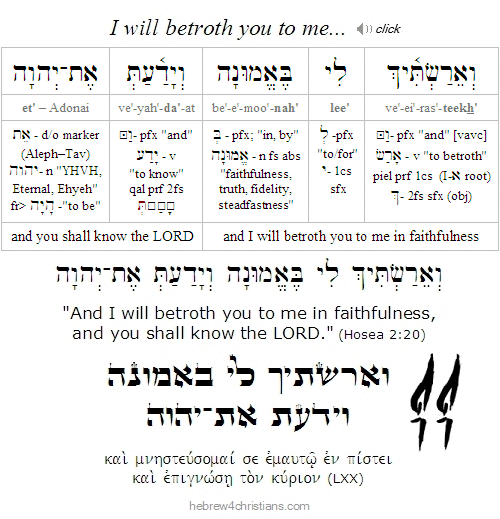 |
A principle of spiritual life is that the "inner is not the outer," and vice-versa. People are easily deceived by mere appearances, yet the eye of faith must be trained to look beyond surface phenomena to discern the underlying Reality that upholds the world. This is perhaps most evident in the case of the cross of Yeshua, which the carnal eye regards as a matter of shame and defeat, but the eye of faith regards as the very wisdom, power, and love of Almighty God Himself... Of Yeshua it is said, "he [Messiah] grew up before him like a young plant, and like a root out of dry ground; he had no form or majesty that we should look at him, and no beauty that we should desire him."
Those who rely on mere appearances will invariably find themselves confounded. The LORD therefore commissioned the prophet: "Go, and say to this people: 'Keep on hearing, but do not understand; keep on seeing, but do not perceive'" (Isa. 6:9). Where it is written, "God gave them over to their stubborn hearts, to follow their own devices" (Psalm 81:12; Rom. 1:24); and "they went backward and not forward" (Jer. 7:24), we learn there is no place of "neutrality" or studied indifference toward God... We are either going forward with Him or going backward; we are either drawing near or pulling our hearts away (Rev. 3:16).
The Revelation of Light...
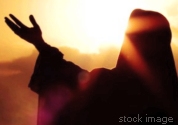
12.23.19 (Kislev 24, 5780) In the Gospel of John it is recorded that Yeshua said, "I am the way, the truth, and the life" (i.e., ᾽Εγώ εἰμι ἡ ὁδὸς καὶ ἡ ἀλήθεια καὶ ἡ ζωή; John 14:6). The Greek word translated "truth" in this verse is aletheia (ἀλήθεια), a compound word formed from an alpha prefix (α-) meaning "not," and lethei (λήθη), meaning "forgetfulness." (In Greek mythology, the "waters of Lethe" induced a state of oblivion or forgetfulness.) Truth is therefore a kind of "remembering" something forgotten, or a recollecting of what is essentially real. Etymologically, the word aletheia suggests that truth is also "unforgettable" (i.e., not lethei), that is, it has its own inherent and irresistible "witness" to reality. In that sense light is a metaphor for truth: "The light shines in the darkness, and the darkness has not overcome it" (John 1:5). People may lie to themselves, but ultimately truth has the final word.
Greek scholars note that the word lethei is derived from the verb lanthano (λανθάνω), which means "to be hidden," so the general idea is that a-letheia (i.e., truth) is non-concealment, non-hiddenness, or (put positively) revelation or disclosure. Thus the word of Yeshua - His message, logos (λόγος), revelation, and presence - is both "unforgettable" and irrepressible. Yeshua is the Unforgettable One that has been manifest as the Word of God (דְּבַר הָאֱלהִים). He is the Light of the world (אוֹר הָעוֹלָם) and the one who gives us the "light of life" (John 8:12). Though God's message can be suppressed by evil and darkened thinking, the truth is regarded as self-evident and full of intuitive validation (see Rom. 1:18-21).
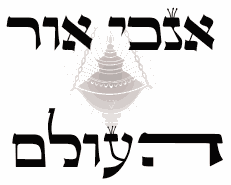 |
The Hebrew word for truth (i.e., emet: אֱמֶת) comes from a verb (aman) that means to "support" or "make firm." There are a number of derived nouns that connote the sense of reliability or assurance (e.g., pillars of support). The noun emunah (i.e, אֱמוּנָה, "faithfulness" or "trustworthiness") comes from this root, as does the word for the "faithful ones" (אֱמוּנִים) who are "established" in God's way (Psalm 12:1). A play on words regarding truth occurs in the prophet Isaiah: אִם לא תַאֲמִינוּ כִּי לא תֵאָמֵנוּ / im lo ta'aminu, ki lo tei'amenu: "If you are not firm in faith, you will not be firm at all" (Isa. 7:9; see Faith Establishes the Sign). Without trust in the LORD, there is no stability... Truth is something trustworthy, reliable, firm, or sure. In colloquial English, for example, this idea is conveyed when we say, "He's a true friend...", indicating that the loyalty and love of the person is certain. The familiar word "amen" likewise comes from this root. Speaking the truth (dibbur emet) is considered foundational to moral life: "Speak the truth (דַּבְּרוּ אֱמֶת) to one another; render true and perfect justice in your gates" (Zech. 8:16). Yeshua repeatedly said, "Amen, Amen I say to you...." throughout his teaching ministry to stress the reliability and certainty of God's truth (Matt. 5:18, 26, etc.). Indeed, Yeshua is called "the Amen, the faithful and true witness" (Rev. 3:14).
The relationship between the Hebrew and the Greek ideas seems to be that the revelation of God - the aletheia - is reliable and strong. The source for all truth in the universe is found in the Person and character of the God of Israel, blessed be He... The self-disclosure of the LORD is both unforgettable - both in the factual and moral sense - as well as entirely trustworthy. Aletheia implies that truth is something that should never be forgotten, and therefore we are regularly admonished not to "forget" the LORD (Deut. 8:11, Psalm 103:2), to "remember" his covenants, to "keep" his ways, to "guard" His precepts, and so on.
The Scriptures attest that Yeshua is the true Light (אוֹר אֱמֶת) that comes from eternity to give light and revelation for all mankind:
הָאוֹר הָאֲמִתִּי הַמֵּאִיר לְכָל־אָדָם
בָּא אֶל־הָעוֹלָם
ha·ohr · ha·a·mee·tee · ha·me·eer · le·khol · a·dahm
ba · el- ha·o·lahm

"He is the true light that shines to all men
who come into the world"
(John 1:9)
῏Ην τὸ φῶς τὸ ἀληθινόν, ὃ φωτίζει πάντα ἄνθρωπον
ἐρχόμενον εἰς τὸν κόσμον
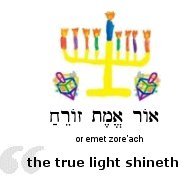
During this Chanukah Season -- and always -- may the LORD God of Israel help us walk in the unforgettable and irrepressible radiance of His glory. May God help us shine with good works that glorify God's Name (Matt. 5:16). "For God, who said, 'Let light shine out of darkness' (יְהִי אוֹר וַיְהִי־אוֹר), has shone in our hearts to give the light of the knowledge of the Glory of God in the face of Yeshua the Messiah" (2 Cor. 4:6).
The Source of Light...
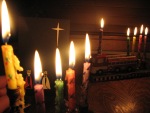
[ The Festival of Chanukah begins this evening after sundown... Happy Holidays, friends! ]
12.22.19 (Kislev 25, 5780) "God is Light; in Him there is no darkness at all" (1 John 1:5). Yeshua said: "I am come a light into the world, that whoever believes in me should not abide in darkness" (John 12:46). The ultimate message of Chanukah is eschatological and full of hope. This world is passing away and the Kingdom of Heaven will one day be established upon the earth. We live in light of this blessed hope (Titus 2:11-13). The world's rulers are "on notice" from God Almighty: their days are numbered and they will surely face the judgment of the LORD God of Israel (Psalm 2). We must stand against evil by refusing to conform to the world around us (Eph. 6:11-18). Now is the time. "Let your light so shine before others that they may see your good works and give glory to your Father who is in heaven" (Matt. 5:16). Followers of Yeshua are made part of His Dwelling - extensions of His Presence in this dark world - and during this Chanukah season may we remember the call to rededicate our lives to Him! יְהִי אוֹר - May your light shine!
כִּי־עִמְּךָ מְקוֹר חַיִּים
בְּאוֹרְךָ נִרְאֶה־אוֹר
kee · ee·me·kha · me·kohr · chai·yeem
be·ohr·kha · neer·eh - ohr

"For with You is the fountain of life;
in Your light do we see Light"
(Psalm 36:9)
Parashat Miketz - מקץ

[ The eight days of Chanukah run from Sun Dec. 22nd (i.e., Kislev 25) through Mon. Dec. 30th this year. The weekly Torah reading is not suspended for Chanukah (as it is for Passover and Sukkot), though additional Torah readings are read for each of the eight days of the holiday... ]
12.22.19 (Kislev 24, 5780) In our Torah portion for Chanukah week, we will read how Joseph successfully interpreted Pharaoh's dreams and rose to power in Egypt. Because of a famine in the land of Canaan, however, his brothers came to Egypt in search of food. A disguised Joseph then tested his brothers to see whether they were the same people who had callously sold him into slavery, or whether they had undergone teshuvah (repentance).
The eventual revelation of Joseph and his reconciliation with his brothers is a prophetic picture of acharit ha-yamim (the "End of Days") when Israel, in Great Tribulation, will come to accept Yeshua as Israel's true deliverer. Presently, the veil is still over the eyes of the Jewish people and they collectively regard Yeshua as an "Egyptian" of sorts. In this connection, I list some of the ways that Joseph is a "type" or foreshadowing of the coming Yeshua as the Suffering Servant (see "Mashiach ben Yosef").
Note: This year the eight days of Chanukah begin on Sunday, December 22nd at sundown (1st candle) and will run through Monday, Dec. 30th until sundown. The tradition is that on the first night of Chanukah one flame is lit, on the second night two, and so on until the eighth night when eight flames are lit. In this way we remember the 'growth' of the miracle. We also read a small section of Torah for each of the days of Chanukah.
From Darkness to Light...
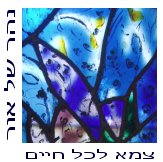
[ The Festival of Chanukah begins this evening after sundown... ]
12.22.19 (Kislev 24, 5780) It is written in our Scriptures that the very purpose and goal of salvation is for us "to turn from darkness to light and from the power of Satan to God" (Acts 26:18). Hashivenu, Adonai... When the darkness seems to enshroud your way, pray for God's light to be rekindled within your soul. Keep faith that your gloom will soon pass, and that darkness and despair will not be your final end. Your mourning will find its comfort, your tears will be wiped away, and your grief will find its solace... Ask God to transform your heartache into the holy resolve to live and die for the truth of His great love.
Personal Prayer Request: Our dear son Judah Avraham broke his arm Friday afternoon while playing at school and now needs surgery... Please remember him in your prayers. Thank you friends. Chag Chanukah Sameach. - John
His Miraculous Light...
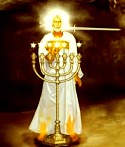
12.22.19 (Kislev 24, 5780) Chanukah isn't "Jewish Christmas," friends, though if Yeshua was born during the time of Sukkot (i.e., Tabernacles), he would have been conceived around the time of Chanukah... At any rate, some people may question whether followers of Messiah should celebrate Chanukah or whether they should reject it because it is associated with Jewish nationalism (and later rabbinical tradition). Well, first it's important to remember that had God not given the victory to the Maccabees, then the Temple would have been razed and Jewish identity would have been lost. Worse yet, Jewish assimilation into Greek culture might have jeopardized the coming of the Messiah Himself. Moreover Chanukah is a prophetic holiday: Just as Daniel prophesied about how the Messiah Himself would be "cut off" for the transgression of God's people (Dan. 9:24-27), so he foresaw the ultimate doom of the Antichrist by the hand of the Messiah himself (Dan. 8:23-25). Indeed Yeshua taught that the "little horn" (i.e., Antiochus) prefigured the greater "Abomination that makes Desolation" to come (Matt. 24:15-22, Mark 13:14; cp. Dan. 9:27, 11:31;12:11). Yeshua was of course speaking centuries after Antiochus set up an altar to Zeus and offered a pig in the Temple, and therefore it is clear that He was prophesying of a future "abomination that makes desolation" that would occur later in Jewish history (2 Thess. 2:3-4). Further note that the though the word "Chanukah" is not mentioned in the Tanakh, it is mentioned in the New Testament (John 10:22-ff) where Yeshua testified that he was the promised Messiah.
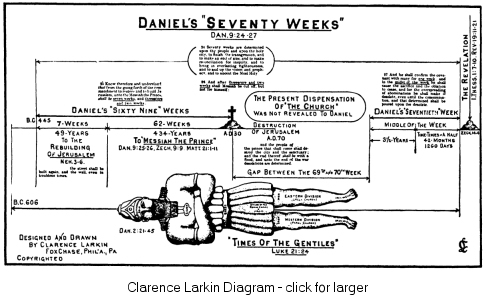 |
Secondly, as I've stated in my Christmas article, it is entirely possible that Yeshua was born during the festival of Sukkot (in the middle of the seventh month), when God chose to "tabernacle" with us (Immanuel), and this implies that Yeshua would have been conceived nine months earlier, during the season of Chanukah. (Put the other way around, if Yeshua were conceived in late Kislev (Nov/Dec), he would have been born 40 weeks later during Sukkot.) Chanukah then would commemorate the miracle of the Incarnation -- when God the Son chose to divest Himself of his regal glory to begin his redemptive advent into this dark world -- an event which undoubtedly is the among the most significant in all of sacred history... In that case the message of Chanukah is that the true Light of the World has come in the Person of Yeshua the Messiah (John 8:12; 9:5).
It is likely there is a Sukkot and Chanukah connection. According to early tradition (preserved in Megillat Antiochus, 2nd Century AD), since the Maccabees were unable to celebrate the holiday of Sukkot at its proper time in the fall, they decided that it should be observed after the Temple was restored, which they did on the 25th of the month of Kislev in the year 164 B.C. Since the festival of Sukkot lasts eight days, this was adopted for the "Winter Sukkot" of Chanukah as well.
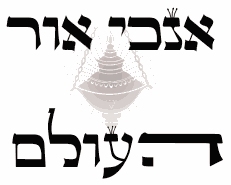 |
Unto us a Child is Born...

12.21.19 (Kislev 23, 5780) Regarding the birth of Messiah it is written in our Scriptures: "For unto us a child is born, unto us a son is given; and authority shall be upon his shoulder, and his name shall be called: 'The Wonderful Counselor' (i.e., pele yo'eitz: פֶּלֶא יוֹעֵץ), 'The Mighty God' (i.e., el gibbor: אֵל גִּבּוֹר), 'The Father of Eternity' (i.e. avi'ad: אֲבִיעַד), 'The Prince of Peace' (i.e., sar shalom: שַׂר־שָׁלוֹם)" (Isa. 9:6):
כִּי־יֶלֶד יֻלַּד־לָנוּ בֵּן נִתַּן־לָנוּ
וַתְּהִי הַמִּשְׂרָה עַל־שִׁכְמוֹ
וַיִּקְרָא שְׁמוֹ פֶּלֶא יוֹעֵץ
אֵל גִּבּוֹר אֲבִיעַד שַׂר־שָׁלוֹם
kee - ye'·led · yoo·lad - lah'·noo · bein · nee·tan - lah'·noo
va·te·hee · ha·mees·rah · al - sheekh·moh
va·yee·kra · she·moh · pe'·le · yo·eitz
el · gee·bor · a·vee·ad · sar - sha·lom

"For unto us a child is born, unto us a son is given;
and authority shall be upon his shoulder,
and his name shall be called: 'Wonderful Counselor,'
'the Mighty God,' 'Father of Eternity', the 'Prince of Peace.'"
(Isa. 9:6)
Download Study Card

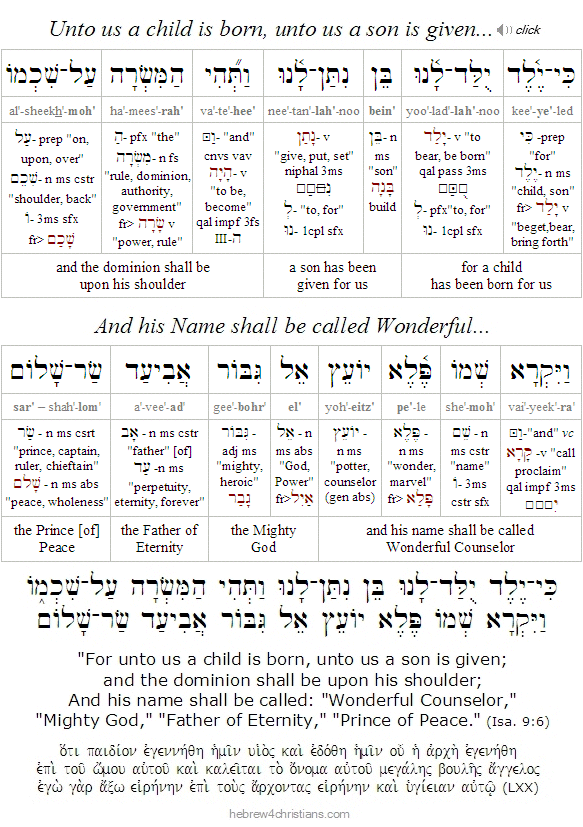
Notice that the four titles used to describe this coming King clearly transcend the historical figure of any earthly king of Israel. The word "pele" (פֶּלֶא) in the title "Wonderful Counselor" (פֶּלֶא יוֹעֵץ) is used in Judges 13:18 regarding the name of the Angel of the LORD who is identified as God (Judges 13:22); the title "Mighty God" (אֵל גִּבּוֹר) is a title for the Holy One of Israel (see Isa. 10:20-21; Psalm 24:8); "Father of Eternity" (אֲבִיעַד) refers to God as Avinu Malkenu (see Isa. 63:16, 1 Chron. 29:10; Psalm 68:5; Mal. 2:10); and as for the title "Prince of Peace" (שַׂר־שָׁלוֹם), both the Talmud and Scripture refer to "the Name of God as Peace" (Shab. 10b, Judges 6:24). It is clear, therefore, that these titles are designations for the LORD God of Israel and not merely that of a human king. In other words, the promised anointed King of Israel (Messiah) would be none other than God himself, as Scripture also attests: "Therefore the Lord himself will give you a sign. Behold, the virgin shall conceive and bear a son and shall call his name Immanu'el (עִמָּנוּ אֵל), "God is with us" (Isa. 7:14).
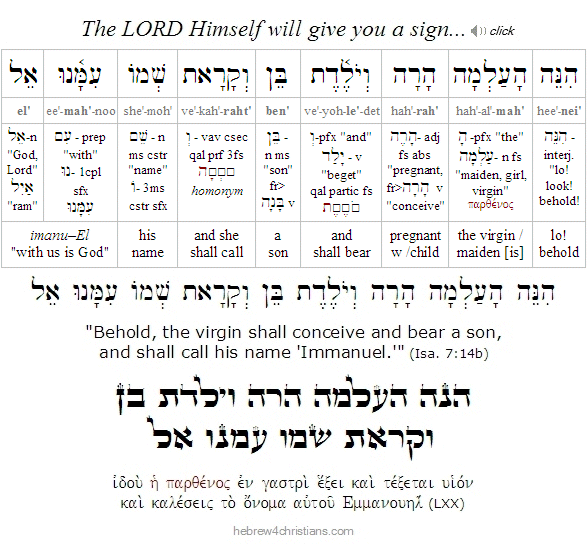 |
Many Christians focus on Isaiah 9:6 and rightly link it to the nativity account of the gospels, but it is important to understand that the promise is also linked to the eschatological future. "Unto us a child is born" - this is the first advent - when the Messiah would be rejected, suffer, and die for our sins; and "unto us a son is given" - this is the second advent - when the Messiah will reign as David's greater regent in the kingdom promised to Zion: "Of the increase of his dominion and of peace there will be no end, on the throne of David and over his kingdom, to establish it and to uphold it with justice and with righteousness from this time forth and forevermore. The zeal of the LORD of hosts will do this" (Isa. 9:7; Luke 1:32-33). Notice that the phrase "his rule will be increased" (לְםַרְבֵּה הַמִּשְׂרָה) is spelled using a closed Mem (ם) instead of the usual open Mem (מ), which suggests that the authority of the One to whom the rule will be given is final and complete. The "child that was born" will be soon be revealed as "the Son that is given" to Israel. One day soon Yeshua will return to Zion (i.e., Jerusalem) to establish His kingdom and fulfill God's promises to Israel. That day and hour are drawing close... Come quickly, LORD!
The Lights of Chanukah...
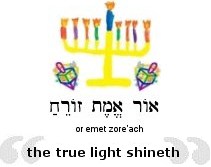
[ The eight-day Festival of Chanukah begins sundown on Sunday, Dec. 22nd this year... ]
12.20.19 (Kislev 22, 5780) For each of the days of Chanukah we light candles, kindling one for the first day, two for the second, and so on until we reach the climactic eighth day, when all shine together. Some of the sages say the word "Messiah" (i.e., mashiach: מָשִׁיחַ) may be regarded as an acronym for the phrase "we light throughout the eight days of Chanukah," i.e., מַדְלִיקִין שְׁמוֹנָה יְמֵי חֲנוּכָּה: madlikin (מ) shemonah (שׁ) yemei (י) Chanukah (ח). Indeed, the central lamp of the Chanukah menorah is called the shamash (שַׁמָש), the "Servant" that bears the original flame that kindles all the others. The salvations, wonders, and solace that God performed for us "in those days, at this time" therefore prefigure the greater deliverance we have in Yeshua, the Suffering Servant and Light of the World...
Note: The Chanukah Blessings page includes some free "Hebrew Study Cards" you can use for your Chanukah celebrations. Each card includes the Hebrew text, phonetic transliteration, and English translation for the blessing. In addition I have recorded Hebrew audio clips for the Chanukah blessings as well, so you can listen to the Hebrew as your learn to recite the blessings... To make it a bit easier during the candle lighting celebration, I have created a handy one page summary of the blessings you can download here (link below). I hope you find this material helpful, chaverim! Chag Chanukah Sameach (חַג חֲנֻכָּה שָׂמֵחַ)!
The Sigh of Faith...
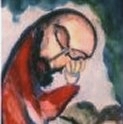
12.20.19 (Kislev 22, 5780) "We groan inwardly as we eagerly await our redemption..." (Rom. 8:23). We sigh deeply because we are suspended between two worlds, living in the ambiguity of an already-not-yet expectation, enduring ourselves as imperfect vessels longing for perfection, trapped between what is and what will be, seeing the unseen, yearning for healing, believing that we shall never die, even as we die (John 11:26). We are restless for our eternal home and long for God's presence as we walk through shadowy vales, facing various temptations, whispering our prayers in the dark. And though we must learn endurance and trust in God's sovereign purposes, our faith nevertheless compels us to cry out, "How long, O Lord?" and "Come, Lord Yeshua" (Rev. 22:20).
Our ongoing challenge is to keep a positive attitude despite the struggles we face, and therefore we inwardly pray: "Renew within me ruach nachon (רוּחַ נָכוֹן) - "a spirit that says Yes" (Psalm 51:10). Surrender means accepting God's will for our lives -- saying "yes" to the promise of love, even if we presently feel empty inside and wonder how long we can hang in there... Saying "yes" implies saying "no" to other things - no to fear, anger and doubt, for example. Tragically there are people who have given up hope for bitterness and despair. Asking God to give us a spirit of "yes" is really a prayer for focus, direction, and the willingness to keep pressing on to our heavenly destiny.
Though life is a struggle, we do not lose heart or faint, since even if the outer self is wasting away, our inner self is being renewed day by day. "For this light momentary affliction is preparing for us an eternal weight of glory beyond all comparison, as we look not to the things that are seen but to the things that are unseen. For the things that are seen are transient, but the things that are unseen are eternal. For we know that if the tent that is our earthly home is destroyed, we have a building from God, a house not made with hands, eternal in the heavens. For in this tent we groan, longing to put on our heavenly dwelling, that is, substance and reality..." (2 Cor. 4:16-5:3).
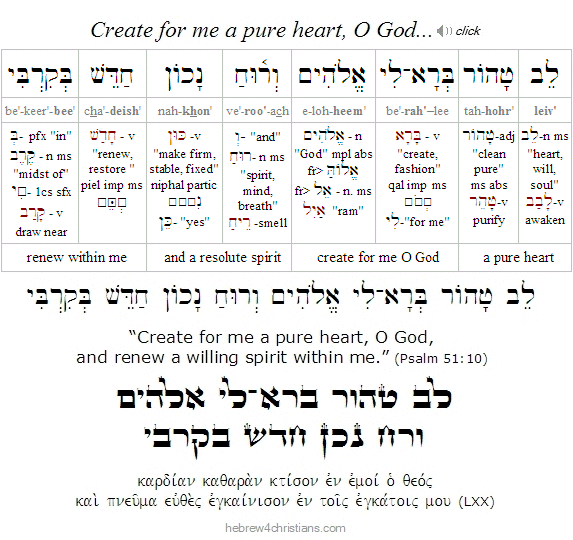 |
Replacement Theology of the Rabbis...
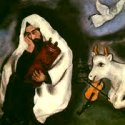
12.20.19 (Kislev 22, 5780) Although I have written about the prevalence of "replacement theology" within Christian tradition, in some ways rabbinical "Judaism" may also be regarded as a form of "replacement theology," since it systematically reinterprets the Torah (and the other Jewish Scriptures) by substituting theological fictions for the plain sense of the Hebrew texts. For instance, it uses analogical reasoning to decree that prayer (or charity) can take the place of sacrifices, that blood atonement is no longer required to be forgiven by God, and so on. If the Christian church has sometimes (rightly) been guilty of its own version of replacement theology, the same might be said of the rabbis who "replaced" Torah-based faith to become a religion without need of the priesthood and that rejected the message of the prophets -- most importantly, the message of Yeshua the Messiah....
Now when the Second Temple was destroyed by the Romans in accordance with Yeshua's prophecy in AD 70, the rabbis met (in Yavne) to create "Judaism without a Temple," and they assumed leadership of Israel -- supplanting the power of the priests (Sadducees) and other groups (e.g., the Essenes, Zealots, Messianic believers, and so on). Among other things, the rabbis authorized the people to disregard the plain teaching of Torah regarding the need for blood atonement, saying that prayer and good deeds will "reverse the divine decree" of judgment, and they further decreed that the study of Torah (as directed by them) would be accepted to God as if all the required sacrifices of Torah were performed by the priests on their behalf (for more on this see "Rabbis who deny blood atonement" on the H4C website). Eventually the Jewish people (including the Messianic believers) were scattered among the nations during the subsequent Diaspora... Meanwhile Gentiles believers in Yeshua were at first persecuted by the Romans as well, though after some time their leaders (most of whom were either ignorant or wary of the Jewish roots of the Christian faith) consolidated their power and finally influenced the waning Roman empire (under Constantine) to sanction and establish "Christianity" as the "official" religion of the empire (as later was proclaimed by Emperor Theodosius I in 380 AD). So an ironic picture emerges; the Jewish rabbis rejected their Messiah and created a "replacement theology" that substituted the Torah for made-man traditions; the Messianic Jewish believers had no choice but to separate themselves from the rabbis who rejected Yeshua, and the growing body of Gentile believers lost touch of the Jewish roots of the faith of Yeshua and thereby created their own "replacement theology," supposing that they were the new people of God... In both cases, however, note that it was the apotheosis and grandiosity of Roman political demagogues combined with the slavish machinery of the imperial government that was the true enemy of God's people....
The Chanukah Prophecies...

[ The eight day holiday of Chanukah begins sundown, Sunday December 22nd this year... ]
12.20.19 (Kislev 22, 5780) Many Bible scholars infer that the prophet Daniel (6th Century BC) foresaw the rise of Alexander the Great centuries beforehand in the vision of a "male goat running from the west" that had a conspicuous horn between its eyes (see Dan. 8:1-12; 21-22). This goat destroyed the power of the kings of Media and Persia (symbolized by two horns on a ram, see Dan. 8:20). Though the "goat" (Alexander) became exceedingly great, eventually its horn was "broken into four [kingdoms]," and out of these four horns arose a "little horn" (i.e., the Seleucid king Antiochus "Epiphanes," c. 175-163 BC) who had authority over "the glorious land" (i.e., Israel). This "little horn" (קֶרֶן מִצְּעִירָה) greatly magnified itself, cast down some of the stars (i.e., righteous souls), took away the sacrifices, and defiled the very Sanctuary in Jerusalem. As we will see, Chanukah ultimately is a prophetic message regarding the End of Days and the victory of our Messiah...
Antiochus is perhaps most notorious for setting up an altar to Zeus over the altar of burnt offering in Temple compound and sacrificing a pig within the Sanctuary of the Temple itself. This sacrilege is otherwise known as the "abomination of desolation" (שִׁקּוּץ מְשׁמֵם) that was decreed to occur 2,300 days into Antiochus' reign (Dan. 8:13-14). Notice, however, that Daniel's prophecy has a "dual aspect" to it, and the description of the rise of the "little horn" (in Dan. 8:9-10) suggested something far more portentous than the reign of a local tyrant. This horn "grew exceedingly great toward the south, toward the east, and toward the glorious land. It grew great, even to the host of heaven. And some of the host and some of the stars it threw down to the ground and trampled on them."
In light of other New Testament scriptures, it is clear that this "exceedingly great horn" refers to future world leader (sometimes called the "Antichrist") who would one day attempt to "assimilate" all of humanity into a "New World Order" (Dan. 9:26-27, 2 Thess. 2:3; Rev. 13:7-9, etc.). It is likely that it was this sense of the "abomination that makes desolation" that Yeshua referred to in Matt. 24:15 and Mark 13:14, and it is this "abomination that makes desolation" that will be overthrown by Yeshua at the end of the Great Tribulation period (Dan. 8:23-25; Matt. 24:30; Rev. 19:11-16; 20:2, etc.).
 |
The intertestamental Book of Maccabees (c. 2nd Century BC) tell us more about this "little horn" and his vicious oppression of the Jewish people. Antiochus installed Hellenistic Jews to the priesthood and demanded the adherence to Hellenistic cultural ideals. He established edicts that prohibited observing the weekly Sabbath and the other biblical festivals. The reading of the Torah was outlawed and all copies of it were ordered to be burned. Temple sacrifices were forbidden; circumcision was outlawed and the penalty for disobedience was death. Women who disobeyed the edict by circumcising their sons were paraded about the city with their babies hanging at their breasts and then thrown down from the top of the city wall (2 Macc. 6:1-11). Many Jews fled and hid in the wilderness and caves and many died kiddush HaShem - as martyrs (see Heb. 11:36-39). Eventually Jewish resistance to this imposed Hellenization meant war. In 164 BC, in Modin, a small town about 17 miles from Jerusalem, Mattityahu (Matthias), a Hasmonean priest, and his five sons took refuge. When Antiochus' soldiers arrived at Modim to erect an altar to Zeus and force the sacrifice of a pig, Mattityahu and his sons rose up and killed the Syrians. They then fled to the Judean wilderness and were joined by other freedom fighters. After some organizing, they soon engaged in successful guerrilla warfare against their Syrian/Greek oppressors. The three-year campaign culminated in the cleansing and rededication of the Temple (for more on this subject, see Chanukah and Spiritual Warfare).
Note: For more on this subject, see "Why Christians should celebate Chanukah."
Love's Greater Judgment...
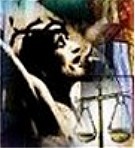
12.20.19 (Kislev 22, 5780) Yeshua warns us regarding the Day of Judgment (יוֹם הַדִּין) to come: "Not everyone who says to me, 'Lord, Lord,' will enter the kingdom of heaven, but the one who does the will of my Father who is in heaven" (Matt. 7:21). Yet what is the will of the Father but to trust in Messiah for life (John 6:40)? "What must we do, to be doing the works of God?" Yeshua answers: "This is the work of God, that you trust in the One whom he has sent" (John 6:28-29). The Torah of God centers on Messiah. On that day many will say to me, 'Lord, Lord, did we not ... do many mighty works in your name?' And then will I say to them, 'I never knew you; depart from me, you workers of lawlessness' (i.e., ἀνομία, from -α ('not') + νομος, 'torah') [Matt. 7:22-23]. From this statement we infer that ma'asim tovim (מַעֲשִׂים טוֹבִים), or "good works" -- even those done in the very Name of Messiah -- are insufficient for life, and that something more is therefore needed. Yeshua wasn't questioning their creed or theology, nor was he denying the good works done in his name. What he was questioning was their heart, how they knew him, and whether they trusted in his love. "As long as Christ remains outside of us we remain separated from him." Paradoxically, those who appealed to their good deeds were those who practiced "lawlessness," since they did not keep the the most essential law, that is, the law of faith (תורה של אמונה) in God's promise. Paul later said that whatever does not proceed from faith is sin (Rom. 14:23), or to put it another way, all sin is a matter of unbelief. As Kierkegaard said, "This is one of the most crucial distinctions, that that the opposite of sin is not virtue but faith."
You will be judged according to Yeshua's word, His Torah, His law (John 5:22). The Greek word translated "lawlessness" is anomia (i.e., ἀνομία, lit. a=without; nomos=law) and refers to the condition of "freely" and consciously rejecting Gods' will. These are people of whom King David said, "Let them be ashamed who are gratuitously faithless (הַבּוֹגְדִים רֵיקָם) (Psalm 25:3). God's will (i.e., his Torah) is for you to turn to Him and believe the message of salvation given through His Son (John 3:16; Acts 16:31; 2 Pet. 3:9, etc.). Any "Torah" that denies this great truth is therefore a false torah that leads to death.... "Whoever has the Son has life; whoever does not have the Son does not have the life" (1 John 5:12). "Unless you believe that I AM, you will die in your sins" (John 8:24).
Atonement and the Messiah...

12.19.19 (Kislev 21, 5780) How are we to understand the apparent contradiction that Yom Kippur is to be observed as a "statute forever" (Lev. 16:29) while the New Testament emphatically states that Yeshua puts an end to animal sacrifice and now is our eternal atonement (Heb. 9:12; 24-26)? To begin we must note that this contradiction only arises when we make the (false) assumption that the Sinai covenant could never be abrogated, which would imply that a new covenant is logically impossible. If we can only relate to God through the covenantal terms given at Sinai, in other words, then the Levitical priesthood (alone) serves to mediate us before God, and there would be no need for a covenant based on the better priesthood and promises of the Messiah (Heb. 8:6). Nevertheless, the new covenant was clearly foretold throughout the Torah, the writings, and the prophets, and the assumption that the Sinai covenant is "immutable" is therefore false. We can understand this by an analogy: If an employer makes a contract with an employee with certain provisions and conditional benefits that are subject to annual review, but later rescinds that contact and offers a new one with far better benefits, there is no contradiction involved. In our case a real contradiction would be, "you must observe Yom Kippur forever," and then - in the very same contract - later read, "you no longer need observe Yom Kippur forever."
Since the Torah says of the Yom Kippur ritual, "this shall be a statute forever (חֻקַּת עוֹלָם) for you, that atonement may be made for the people of Israel once in the year because of all their sins" (Lev. 16:34), it is urgent for us to explore what "forever" might mean in this case, especially in light of the atonement given in Yeshua. First, we note that the Hebrew word translated "forever" is olam (עוֹלָם), which is derived from a root verb alam (עָלַם) that means "to conceal" or "to hide." Olam may have its origins using spatial imagery, a distance so vast that it is unseen, beyond the horizon, and therefore it can also mean "world." When it is applied to the terms of the Sinai covenant (and the Tabernacle represents the "ritual expression" of that covenant), the word means perpetual, ongoing, etc., in that domain or "world." It is interesting to note that the Jewish sages never regarded "olam" as unchangeable, since in the world to come Torah from Zion (Isa. 2:3). For more on this important point, see the article "Olam HaTorah: The World of the Torah."
Second, we must remember that Torah (תּוֹרָה) is a "function word" that expresses our responsibility in light of the covenantal acts of God, and if you choose to relate to God by means of the Sinai covenant, you are liable to the terms and provisions of that contract (e.g., niddah laws, blood ritual laws, tithing laws, agricultural laws, etc.), and this includes being liable to the enumerated curses for disobedience. The covenant at Sinai is indeed eternal and never can change - it is brit olam, a perpetual covenant - but if you choose to abide by its terms, you are responsible for your side of the contract... The Book of Hebrews states: "When there is a change in the priesthood (הַכְּהוּנָּה), there is necessarily (ἀνάγκη) a change in the Torah as well" (Heb. 7:12). The Levitical priesthood expresses the Torah of the Covenant of Sinai (בְּרִית יְשָׁנָה), just as the greater priesthood of Yeshua expresses the Torah of the New Covenant (בְּרִית חֲדָשָׁה).
Third, Yeshua our Messiah came to deliver us from sin and to establish the new covenant with God, which both transcends the moral law of Sinai and provides an entirely new way to be in relationship with God by the power of the Holy Spirit. The new covenant sets us free from the terms of Sinai (by the death of the Testator, Heb. 9:15) so that we might serve God in a new and better way (see Jer. 31:33; Rom. 7:1-6; Heb. 8:6; Rom. 9:31-32; Acts 13:39; Gal. 4:21-5:1). We "die" to the terms of the former contract to serve God in a new and powerful way (Rom. 7:1-4), with the inner intent of the law written upon our hearts (Jer. 31:31-33). This is the "deeper Torah" that goes back to the original covenant made in the Garden of Eden (for more on this, see "The Gospel in the Garden").
Fourth, Yeshua is the King, the Lawgiver of Torah, and its Substance: he did not come to destroy the Law and the Prophets, but to fulfill their message and meaning (Matt. 5:17-18; Rom. 10:4). As the King, he has the authority to annul contracts with his subjects, and he has the authority to implement new agreements based on his sovereign will... The Torah of Moses commanded, "Thou shalt not kill..." but the King of Torah (מלך התורה) went to the heart of the matter, explaining that murder was a symptom of the deeper sin of anger...
Finally, those who follow the law of Moses simply cannot keep the Day of Atonement as clearly commanded in the Book of Leviticus, nor have Jews been able to do so since 70 AD, after the destruction of the Second Temple as foretold by Yeshua (Matt. 24:2; Luke 19:41-4). Note that this was by divine design, since the way into the Holy of Holies (i.e., kodesh hakodashim: קדֶשׁ הַקֳּדָשִׁים) was not yet open for all as long as the "outer tent" still stood (i.e., the Levitical priesthood as the ritualistic expression of the covenant made at Sinai), since that was symbolic of "the present age," or the "dispensation that was passing away" (Heb. 8:13, 9:8-9; for more, see "The Parochet Rent in Two"). Despite the later invention of "Judaism without the Temple," the life is indeed "in the blood" (Lev. 17:11) and in Messiah we are given fulness of life! Only Yeshua gives us true atonement, and that's the true Torah of the LORD! The redemption obtained by animal sacrifices was merely provisional and symbolic, "for it is impossible for the blood of bulls and goats to take away sins" (Heb. 10:4). For eternal remedy something far greater was needed, namely, the sacrifice of God Himself. Consequently, when Yeshua came into the world, he said, "Sacrifices and offerings you have not desired, but a body have you prepared for me," and "'Behold, I have come to do your will, O God, as it is written of me in the scroll of the book" (Heb. 10:5,7). As the Book of Hebrew states: "We have an altar, whereof they have no right to eat who serve the Tabernacle" (i.e., the Levitical system of worship). We are cleansed from our sins and made eternally right with God because of the cross of Yeshua...
The bottom line is this. We have a greater High Priest who intercedes for us by means of his own shed blood within the true Holy of Holies, "made without hands," in the olam of reality. We do not mix the covenants of God, for this leads to double-mindedness and is regarded as spiritual adultery (Rom. 7:1-4). It is chillul HaShem - the desecration of the Name above all Names - to turn away from the meaning and message of the cross of Messiah.
The Birth of the Messiah...

[ The "Christmas" season gives us an opportunity to focus on the truth of incarnational theology, to celebrate the revelation of God in Yeshua, and to proclaim the miracle that God "emptied Himself" by being clothed in human flesh as the great Lamb of God.... ]
12.19.19 (Kislev 21, 5780) Though the world system corrupts the message of the birth of Messiah for the sake of avarice and greed, take a moment to reflect on its ongoing spiritual significance, namely, that God emptied Himself (κένωσις) of His regal glory and power to become your High Priest, able to fully sympathize with your weakness, frailty, shame, and chronic sinfulness (Heb. 4:15-16; Phil 2:7-8). Almighty God, the Presence of Love, the Heart of Reality, clothed himself in human flesh and bone to become Immanu'el (עִמָּנוּ אֵל) - "God with us" - so that we could be touched by Him, healed by Him, and redeemed by Him... Therefore let's join the refrain of heavenly host: "Glory to God in the highest, and upon earth peace, good will toward men" (Luke 2:14). Yeshua is the Eternal Sign and Wonder of the LORD God Almighty...
כָּבוֹד לֵאלהִים בַּמְּרוֹמִים
וְשָׁלוֹם עֲלֵי אֲדָמוֹת בְּקֵרֵב אַנְשֵׁי רְצוֹנוֹ
kah·vohd · le·loh·heem · ba·me·roh·meem
ve·shah·lom · a·lei - a·dah·moht · bee·ke'·rev · a·ne·shei · re·tzoh·noh

"Glory to God in the highest,
and upon earth peace, good will toward men."
(Luke 2:14)

Hebrew Study Card
Consider the absolute humility of God as He chose to enter into this world as "baby Jesus." Meditate on the glory and sheer paradox of God's love! "Baby Jesus" is the perfect disguise to hide the truth from the proud eyes of the flesh, though the humble of heart can see... "For since in the wisdom of God the world by its wisdom did not know God, God was pleased to save those who believe by the foolishness of preaching" (1 Cor. 1:21). For "who comprehends the mind of the LORD, or gives him instruction as his counselor?" Through his great plan to redeem people from the dominion of Satan and his agents in this evil world, God emptied Himself to become clothed in the frailty human flesh, born in a barn as the great Lamb of God, and born to die as the ransom for all who will believe. Ah, what would we do without the gift of God, friends? What hope would we have? Regardless of the exact date of his birth of His birth, let's thank God that our Moshia (Savior) was willing to be born into this dark world to offer Himself as our sacrificial Redeemer! "For from him and through him and to him are all things. To him be glory forever. Amen."
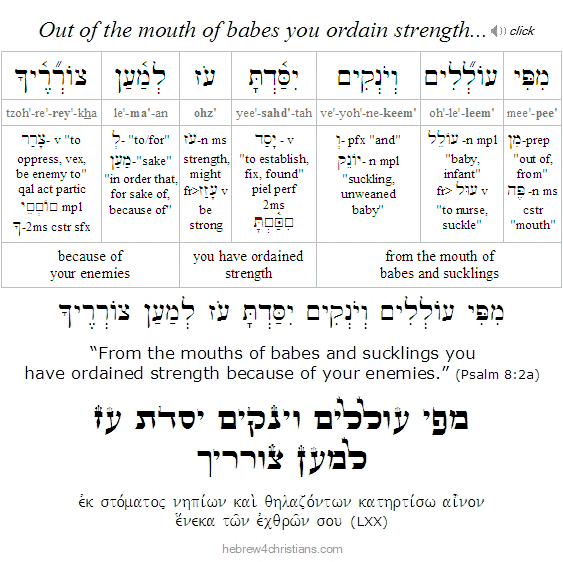 |
But what will you do, then, if you sincerely seek to follow the Torah's calendar in light of entrenched Christian customs? Well, we certainly may commemorate the birth of Messiah during the holiday of Sukkot (or Shavuot, etc.), though we must be careful to show charity and use the "good eye" toward those who may adhere to the traditional date for "Christmas." Likewise we commemorate the death and resurrection of Messiah during Passover and Firstfruits, respectively, though we do not begrudge those of good faith who honor these great events of salvation during what they call the "Pascha" or even the "Easter" season. Often we are tested in exactly this way, chaverim! We must not miss the "weightier matters" of extending love to others, as Yeshua clearly taught (Matt. 23:23). Moreover it is written, "Let every man be fully persuaded in his own mind" (Rom. 14:5; Col. 2:16). Friends, we must test the spirits -- and that includes our own! How do we treat the "stranger" among us? How do we regard the "weaker brother?" Do we demand that our doctrine be esteemed, or do we allow room for others to seek the Lord and his wisdom? Ask yourself: Does this person (or group) honor Yeshua as God the Son, the Redeemer of Humanity who died for our sins and rose from the dead? If so, then keep your heart warm and soft toward him or her, even if he or she has yet to discover the Jewish roots of their faith. "Strive for peace with everyone" (Heb. 12:14). "Let those of us who are mature think this way, and if in anything you think otherwise, God will reveal that also to you" (Phil. 3:15). Though we desire unity with one another (John 17:11), we cannot reasonably insist on doctrinal uniformity, especially in light of the frailty of our shared human condition... The truth of God is known in humility and love.
Why the Incarnation Matters...
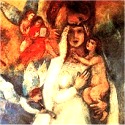
12.18.19 (Kislev 20, 5780) At Sinai we heard the Voice of God (קוֹל אֱלהִים) speaking from the midst of the Fire (Deut. 4:33), an event that foreshadowed the great advent of the King and Lawgiver Himself, when the Eternal Word (דְבַר־יְהוָה) became flesh and dwelt with us (Phil. 2:6-7; John 1:1,14). Any theology that regards God as entirely transcendent (i.e., God is beyond any analogy with the finite) will have a problem with divine immanence (i.e., God is inherent and involved within the finite), since the highness, holiness, and perfection of God will make Him seem distant, outside of us, far away, and unknown... Incarnational theology, on the other hand, manifests the nearness of God to disclose the divine empathy. Indeed, the LORD became Immanuel (עִמָּנוּ אֵל), "God with us," to share our mortal condition, to know our pain, and to experience what it means to be wounded by sin, to be abandoned, alienated, forsaken. It is God's own bittul hayesh (בִּטּוּל הַיֵּשׁ) - his self-nullification for the sake of love and truth. The "Eternal made flesh" bridges the gap between the realm of Ein Sof (אין סוף), the infinitely transcendent One, and the finite world of people lost within their sinful frailty. Of course we believe Adonai Echad (יְהוָה אֶחָד) - that the "LORD is One" - both in the sense of being exalted over all things but also in the sense of being compassionately involved in all things (Rom. 11:36). We therefore celebrate the giving of the Torah both at Sinai and especially at Bethlehem with the birth of Messiah. We celebrate that God is indeed the King and Ruler over all, but we further affirm that God's authority and rule extends to all worlds - including the realm of our finitude and need...
As I've mentioned elsewhere, the climax of Sinai was the revelation of the Sanctuary. The two tablets of the law, summarizing the Ten Commandments, were stored inside the famous Ark of the Covenant (אֲרוֹן בְּרִית־יְהוָה), a sacred "three-in-one" box placed in the innermost chamber of the Tabernacle called the Holy of Holies (קדֶשׁ הַקֳּדָשִׁים). As such, the Ark served as kisei ha-kavod (כִּסֵּא הַכָּבוֹד), the Throne of Glory itself. Upon the cover (or crown) of the Ark (i.e., the kapporet) were fashioned two cherubim (i.e., angel-like figures) that faced one another (Exod. 25:17-18). According to the Talmud (Succah 5b), each cherub had the face of a child - one boy and one girl - and their wings spread heavenward as their eyes gazed upon the cover (Exod. 25:20). It was here that God's Voice would be heard during the Yom Kippur service, when sacrificial blood was sprinkled upon the crown to symbolize the atonement of sin secured through Messiah, the Word that became flesh for us... In the very heart of the Sanctuary, then, we see the Word of God and the sacrficial blood.
The LORD God Almighty was clothed with human skin: our flesh, our bones... The miracle of the incarnation is the Absolute Paradox, as Kierkegaard said, wherein the infinite and the finite meet in mystery of the Divine Presence. Here God "touches a leper," eats with sinners and prostitutes, sheds human tears, and suffers heartache like all other men... The gloriously great God, the very Creator of the cosmos, has "emptied Himself" to come in the form of a lowly servant (δοῦλος) - disguised to the eyes of the proud and hardhearted, but is revealed as High Priest to those who are genuinely broken and in profound need. The LORD God is God over all possible worlds, and that includes both the celestial realms of the heavens but also the world of the fallen, the ashamed, the alienated, and the lost... God's infinite condescension reveals and augments the majesty of His infinite transcendence. There is no world - nor ever shall there be such - where the LORD God Almighty does not reign and have preeminence.
Do not suppose for a moment that the Torah of Moses does not teach "incarnational" theology. Since God created human beings in his image and likeness, the "anthropomorphic language" of Scripture is meaningful. The LORD reveals himself in human terms - using human language, expressing human emotions, and so on, as it says: Moses spoke to God panim el panim - "face to face" (Deut. 34:10). The Torah always has to take on human form - the Word made flesh - for the sake of human beings who live in flesh and blood reality...
The greatest expression of God's word is found in the Presence of Yeshua. This is the Word of God that "tabernacles" with us, full of grace and truth (John 1:14). Yeshua is the "Living Torah," Immanuel (עִמָּנוּ אֵל), "God with us," who enters our world to rescue us from death. Our Scriptures state that "in these last days God has spoken to us by his Son, whom He appointed the Heir of all things, through whom also He created the worlds" (Heb 1:2). Note that the Greek construction for the phrase translated, "by his son" is ἐλάλησεν ἡμῖν ἐν υἱῷ, which literally means "he spoke to us in Son" -- that is, in the language or voice of the Son of God Himself... God speaks the language "of Son" from the midst of the fire revealed at Zion. "Therefore, since we are receiving a kingdom that cannot be shaken, let us be thankful, and so worship God acceptably with reverence and awe (μετὰ αἰδοῦς καὶ εὐλαβείας) - for our God is Esh Okhelah - a Consuming Fire" (Heb. 12:28-29).
Addendum: Consider further the metaphorical and anthropomorphic language of the Scriptures: God "sees," God "hears," the "hand of the LORD" saves, etc. Without an implied incarnational theology, there would be no language that we could comprehend about God who is the Infinite One that transcends all things... God gets angry; God feels sorrow; God is jealous; God is a lover, etc. all these metaphors bring the language of heaven into the world of humanity... The Spirit that imparts revelation does so inside a human brain and is translated into human apprehension. Yeshua is the Substance of the shadowy talk of analogical language; he embodies God-life before us.... Yeshua is the Word of God made flesh -- able to touch us, know us, share in our suffering, heal us of our sin-sickness, etc.
Truth of the Heart's Passion...
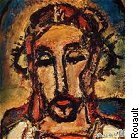
12.18.19 (Kislev 20, 5780) Soren Kierkegaard (1813-1855) notes that many people read the Bible after "skipping to the end" and pretending they know the "whole megillah," namely that love wins, and all shall be well... Nevertheless we must remember that the LORD is completely just and there is no intrinsic advantage given to Yeshua's contemporaries over those who are living today. The same message requires the same faith to encounter the truth of the Teacher. "I AM the resurrection and the life. Whoever believes in me, though he die, yet shall he live, and everyone who lives and believes in me shall never die. Do you believe this?" (John 11:25-26). Or do you suppose that you would have acted in faith had you been alive when Yeshua was here on earth? Consider well. When Mary held her newborn son and changed his soiled clothing, did she then believe he was the Savior of the world? Did she fully understand the "end of the story" at that time? When the disciples watched with horror as their Master was arrested, unjustly condemned, and then brutally crucified, did they then believe God was manifest in the flesh? Did they fathom the depths of God's providential love for them? And even after the resurrection from the dead, when Yeshua had directly appeared to his followers and they watched as he ascended on high, did they trust that eternal death was forever swallowed up by His overmastering and triumphant life?
Do you think our present generation would more readily accept the message of Yeshua more than that generation 2,000 years ago? That generation clamored: "We will not have this man rule over us!" (Luke 19:14), yet is this not the recurrent mantra of spiritual darkness spoken throughout the generations? How many of us read the Gospels and encounter something radically challenging, only to excuse ourselves and pretend that the question is not being asked of us? How many of us "take up our cross" and follow the path of sacrificial love? "But I say to you, love your enemies and do good to them that hate you, bless those who curse you, pray for those who abuse you" (Luke 6:27-28). Many want to believe they are following Yeshua's Torah here but hesitate when they hear such things; they don't really want to trouble themselves by changing or denying their natural impulses... Kierkegaard laments: "The matter is quite simple. The Bible is very easy to understand, but we Christians are a bunch of scheming swindlers. We pretend to be unable to understand it because we know very well that the minute we understand we are obliged to act accordingly."
With regard to matters of history, however, we must remember that often "facts" are identified by means of an interpretative bias that constrains what is seen. Inductive logic is based on the formal fallacy of "affirming the consequent" (if p then q; q; therefore p) which means that a "fact" is constructed as that which agrees with a given hypothesis. Knowledge of matters of fact ascertained empirically are always, by definition, inductive and therefore probabilistic, whereas knowledge of matters of faith are ascertained by means of the heart's inwardness, and thereby are matters of certainty and passion. In other words, there is "truth" regarding matters of empirical and logical fact, and there is capital "t" truth (i.e., "Truth"), the later being existential truth that concerns the ultimate concern of your heart.
When approached objectively, the question of truth is only about categories of thought; when approached subjectively [i.e., existentially] however, truth is about inwardness. At its maximum, the how of inwardness is the passion of the infinite, and the passion of the infinite is the essential truth. Decision exists only in subjectivity. Thus the passion of the infinite, not its content, is the deciding factor, for its content is precisely itself. In this way the subjective "how"... not the objective "what" .. are the truth.
Let us take the knowledge of God as an example. The way of objectivity concerns itself with what is reflected upon, of whether this is the true God. In the way of subjectivity, however, the individual relates to God in such a way that this relation is in truth a God-relation. Now, on which side is the truth? Is it on neither side? Or, better yet, does it lie somewhere in between? But how can this be? An existing person cannot be in two places at once. He cannot exist as a subject-object. God is a subject to be related to, not an object to be studied or meditated on... The person who chooses the subjective way immediately grasps the difficulty of trying to find God objectively. He understands that to know God means to resort to God, not by virtue of objective deliberation, but by virtue of the infinite passion of inwardness.
Whereas objective knowledge goes along leisurely on the long road of deliberation, subjective knowledge considers every delay of decision a deadly peril. Knowing subjectively considers decision so important that it is immediately urgent, as if the delayed opportunity had already passed by unused. (Soren Kierkegaard: Afsluttende uvidenskabelig Efterskrift, 1846)
We must listen with a heart of faith to unlock the truth that speaks to the heart. If you believe only what you can tolerate, however, your faith is actually grounded in your own interests, not in the Divine Voice of Love that seeks to heal the world. "For he is our God, and we are the people of his pasture and the sheep of his hand today -- if you hear his voice" (Psalm 95:7). Today, if you hear his voice and do not harden your heart (Heb. 3:15). "Take care, brothers, lest there be in any of you an evil, unbelieving heart, leading you to fall away from the living God, but encourage one another every day, as long as it is called "today," so that none of you may be hardened by the deceitfulness of sin" (Heb. 3:12-13).
Do you now believe?

12.18.19 (Kislev 20, 5780) "Do you now believe?" (John 16:31). Some people are scandalized by what they call "easy believism," or the idea that we only need to believe in Yeshua to be saved. Sometimes they malign this teaching as "cheap grace" or "sloppy agape," though in fairness it must be stressed there is nothing easy about truly believing. What is easy, however, is professing that you believe without undergoing a miraculous heart transformation. Anyone can say, "I believe in Jesus," but the test is whether he lives within you. Is he the source of your life? Do you draw life from Him? Anyone can claim they are saved, but it is a miracle greater than splitting the sea to undergo divine metamorphosis, to be given a heart that loves unconditionally, that dies to pride, and that lives as the servant of all. Yeshua asks, "Do you really believe? Many will say to me in that day, 'Lord, Lord...' but I will say to them, 'I never knew you...' (Matt. 7:22-23). It's not just hard to believe (obey), it's impossible apart from God's radical intervention. It is the Spirit that gives life; the flesh is no help at all (John 6:33).
Living by faith does not mean we profess Christianity or "talk theology" like some college professor. It's one thing to believe that, and another to believe in... Human reason can rightly infer that a morally good, all-powerful Creator exists, for example (Rom. 1:20), but it is unable to know God's love that way... Love requires trust, "taking to the heart." We are to "know this day and turn to your heart (והֲשֵׁבתָ אֶל־לְבָבֶךָ) that the LORD is God in heaven above and on the earth beneath; there is no other" (Deut. 4:39). We need to know truth (cognitive) and to be moved by the heart (emotional); we need both Spirit and Truth (John 4:24). "For all things come from You (כִּי־מִמְּךָ הַכּל), and from your hand we give to you" (1 Chron. 29:14). Teshuvah centers on Yeshua our Savior: turn to believe in Him!
Regarding the question of faith, Kierkegaard once wrote, "The easiness of Christianity is distinguished by one thing only: by the difficulty. Thus the Master's yoke it easy and its burden light -- for the person who has cast off all his burdens, all of them, the burdens of hope and of fear and of despondency and of despair -- yet it is difficult." The issue here has to do with certainty of faith, the "infinite certainty" that is faith's passion, versus the "probabilistic" apprehension of truth that comes from historical investigation... Yes, the difficult thing is to truly believe in the "for-you miracle" of God's love. Sins can be like great possessions that are difficult to give up. Among other things, we must forgive ("give away") our sins (both our own and those against us), and that means trusting God enough to bear our wounds for us. Forgiveness allows us to move on with our lives by letting go of the pain of the past (2 Cor. 5:16). The atonement cost God everything, and yet is of no spiritual value until it is accepted into the heart. It is "easy" to understand this, but it is difficult to live it. πιστεύω· βοήθει μου τῇ ἀπιστίᾳ - "I believe, help thou my unbelief" (Mark 9:24).
Birth Date of Jesus Revisited...
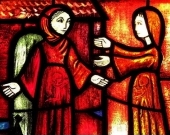
12.18.19 (Kislev 20, 5780) Was Jesus (Yeshua) really born on December 25th, as the Western Christian Tradition maintains, or does the careful study of Scripture allow us to infer a different time for His advent here on earth? Two cases can be reasonably made: one case for a Tishri (Sukkot) birth, and the other for the traditional late December date. As I hope you will see, the crux of the arguments both for and against the late December dating of the birth of Yeshua depend upon when we think Zechariah (John the Baptist's father) was in the Temple when he was visited by the angel Gabriel...
The Scriptures teach that King David divided the sons of Aaron (i.e., the priests) into 24 "courses" or groups to create an orderly schedule by which the Temple of the LORD could be staffed for the year (1 Chr. 24:1-4). Once these courses were established, lots were drawn to determine the sequence each group would serve in the Temple (1 Chr. 24:7-19) beginning with the first course in the Spring on Nisan 1 (Rosh Chodashim). Each of the 24 courses of priests would begin and end their service on the Sabbath day for a tour of duty of one week (2 Chr. 23:8, 1 Chr. 9:25).
Now recall that Jewish calendar begins in the spring (i.e., Nisan 1), so the first course of priests would serve for seven days and the following week the second course would serve. The third week would mark the festival of Passover when all priests would be present for service, so the schedule would be suspended until the following week when the third course of priests would serve. The weekly arrangement would then resume until the holiday of Shavuot (Pentecost) when the schedule was suspended again for the ninth week. By the tenth week the eighth course (of Aviyah) would be called for Temple service and the courses would continue without further interruption until the 24th course was completed (see table below). Note that after the 24th course served, the first half of the calendar would be complete and the schedule would then reset for the second half of the year. By means of this arrangement each group of priests would serve in the Temple twice per year (in addition to the three major festivals of Passover, Shavuot, and Sukkot).
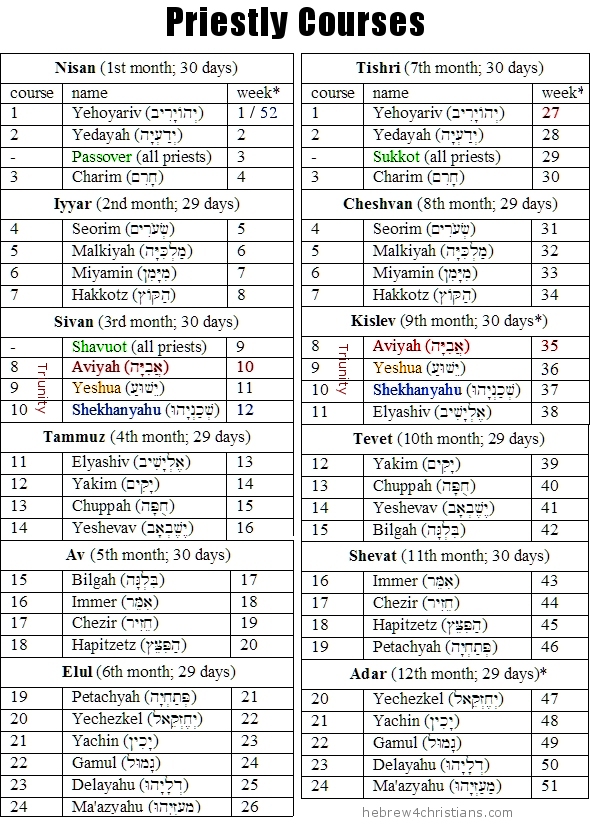
Note that this weekly schedule of the Temple service allows us to infer the birth date of both John the Baptist and Yeshua the Messiah. Of particular interest is the eighth course of the priests, called the "Course of Aviyah" (mentioned in 1 Chr. 24:10) which was the course that Zechariah served (Luke 1:5). Now since the eighth course would serve either during the month of Sivan or later during the month of Kislev (see see table above), we have two possibilities regarding establishing the birth date of Yeshua the Messiah. If the visitation of Gabriel occurred during Zechariah's first course of service (i.e., the 10th week), then John would have been conceived sometime during the month of Sivan (Luke 1:23-4), and adding 40 weeks to this (the normal time of human gestation) John would have been born sometime in the month of Nisan, perhaps around the time of Passover. Furthermore, since Yeshua was conceived six months after John was conceived (Luke 1:24-27, 36), adding six months (or 24 weeks) to the end of Sivan implies his conception would have occurred in mid to late Kislev (near the time of Chanukah). Adding 40 weeks to this (again, the approximate time of human gestation), Yeshua then would have been born sometime in the month of Tishri, during the season of Sukkot (i.e., "Tabernacles"). On the other hand, if the visitation by Gabriel occurred during Zechariah's second service (i.e., 35th week), then John would have been conceived after Yom Kippur (Luke 1:8-23) and born 40 weeks later in month of Tammuz. Again, since Yeshua was conceived six months after John was conceived (Luke 1:24-27, 36), adding six months (or 24 weeks) would imply he was conceived during Passover and born later during the month of Tevet, near the traditional late December birth...
For more on this topic see "Christmas Day: Was Jesus Really Born on December 25th?" or download the printable version here:
Note: The fact that different church groups have chosen one date over another to memorialize certain historical events (such as the birth date of the Messiah) is simply something we must tolerate, especially because the Scriptures do not provide enough information to conclusively determine the matter, and we are instructed to follow after peace (Heb. 12:14)... This is not a question regarding the historicity of the person of Yeshua, since that is not seriously questioned by historical scholars. However, the Scriptures do accommodate divergent convictions on such matters, as Paul gave the principle: ῝Ος μὲν κρίνει ἡμέραν παρ᾽ ἡμέραν, ὃς δὲ κρίνει πᾶσαν ἡμέραν. ῞Εκαστος ἐν τῷ ἰδίῳ νοῒ πληροφορείσθω - "One person esteems one day as better than another, while another esteems all days alike. Each one should be fully convinced in his own mind" (Rom: 14:5). "So then let us pursue what makes for peace and for mutual upbuilding" (Rom. 14:19).
You might not agree with my tentative conclusions here, but if you want to make a case for a different date, please do your own research on the question. Read the relevant Hebrew texts, do the math, consult the Jewish calendar, read the New Testament, check the Greek, and determine whether you think Zechariah was serving at the Temple during the month of Sivan or later, during Tishri, perhaps during the time of Yom Kippur. Shalom!
Footsteps of Messiah....
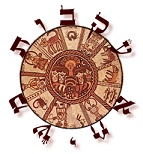
12.18.19 (Kislev 20, 5780) According to traditional Jewish sources (e.g., Pesachim 54b; Midrash Tehilim 9:2), no one knows the time when the Messiah will appear -- though there are some "signs" that indicate the nearness of the hour. Some of these signs include the rise of various false prophets, numerous wars and "rumors of wars" (including the rise of Magog), famines, earthquakes, worldwide apostasy from the faith, persecution, and a globalized sort of godlessness that is revealed in unbridled selfishness, greed, audacity, shamelessness, and a general lack of hakarat ha-tov (gratitude). People will become narcissistic and incapable of loving others. The greatest sign, however, will be that Israel will exist once again as a sovereign nation, despite the prophesied exile among the nations (Deut. 4:27-31; Jer. 30:1-3). The world will undergo various forms of tribulation, called chevlei Mashiach - the "birth pangs of the Messiah" (Sanhedrin 98a; Ketubot, Bereshit Rabbah 42:4, Matt. 24:8). These birth pangs are said to last for 70 years, with the last seven years as the most intense period of tribulation -- the "Time of Jacob's Trouble" / עֵת־צָרָה הִיא לְיַעֲקב (Jer. 30:7). The first wave of trouble came from Edom (i.e., "Rome/Europe") in the form of the Holocaust; the second is coming from Ishmael (i.e., the Arab states) in the form of the Arab-Israeli conflict. This accords with the teachings of Yeshua in the Olivet Discourse (Matt. 24-25). Concerning the tribulation that will come upon the earth before the final redemption takes place the sages comment: "If a pregnant woman goes into labor in the eighth month when her time is not yet come, they try to stop her labor, but not so in the ninth month. If the woman goes into labor then, they try to hasten it so that she may soon give birth. That is why formerly when people called to heaven begging God to free the earth some misery, their prayer was granted, for the time had not yet come. But now that redemption is near, no prayer that ascends on behalf of the sorrowful world is of avail, but sorrow is heaped upon sorrow, so that the birth may be accomplished" (Buber: Hasidim).
 |
For more see:
Coming to yourself...
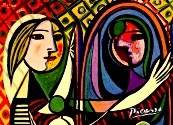
12.18.19 (Kislev 20, 5780) "And when he came to himself, he said, 'I will arise and go to my father'..." (Luke 15:17-18), yet behold! the father had remained all the while with his heart yearning for his lost child, eager to celebrate his homecoming when that day should come. His "address" (המקום) had not changed... But what if, then, the "prodigal" had left yet a second time? Would the heart of the father change toward his child? Would the father's heart turn cold? No, never! Every time the child would "come to himself" he would be welcomed back into the arms of his waiting father, unto "seventy times seven times" (Matt. 18:21-22). And therefore every time we remember the truth of who we are we rediscover the truth of God's love -- that God is ready to embrace us, to restore us, to robe us in splendor and celebrate the miracle of our lives...
"Come unto me, all who labor and are heavy laden, and I will give you rest" (Matt. 11:28), and that means we keep coming, despite the lonely wanderings we sometimes make into the darkness of our pain, our anger, our fear, and our sin... The heart of heaven beckons us to keep coming back; the Spirit invites us to turn again to face the light, to accept who we really are as God's child, and to receive the blessing of our place in God's heart. Therefore may you "come to yourself" and return to your father today.
The Father of Lights...

[ Chaunukah begins Sunday, Dec. 22nd at sundown this year... ]
12.17.19 (Kislev 19, 5780) It is written in our Scriptures: "God is light and in him is no darkness at all" (1 John 1:5). Our Savior is "the Light of the world," the Divine Message that gives light to every soul who is born (John 1:9). As the Source of all light, his power is irrepressible, invincible, and overcomes every shade of darkness. Yeshua is the Logos (Λόγος), the underlying "logic" of all of creation. Unlike the transient radiance of the heavenly bodies, the Divine Light remains constant and supreme over all of creation, without any diminution or variation: God is the "Father of Lights" (James 1:17). And just as we know that the sun still shines even on the most overcast of days, so we understand that the Divine Presence is always there -- always giving, always shining, always loving us... We can trust in the power of our God to help us, since His radiance and truth pervade the darkness to enlighten our way (Psalm 112:4). As Yeshua said of his mission, "I have come into the world as light, so that whoever believes in me may not remain in darkness" (John 12:46). Let us believe and behold the Light! Hashivenu! O LORD God, let your light shine upon us...
אֱלהִים יְחָנֵּנוּ וִיבָרְכֵנוּ
יָאֵר פָּנָיו אִתָּנוּ סֶלָה
e·lo·heem · ye·cho·nei'·noo · vee·va·re·khei'·noo
ya·eir · pa·nav · ee·ta'·noo · se'·lah

"May God be gracious to us and bless us
and make his face to shine upon us, selah."
(Psalm 67:1)

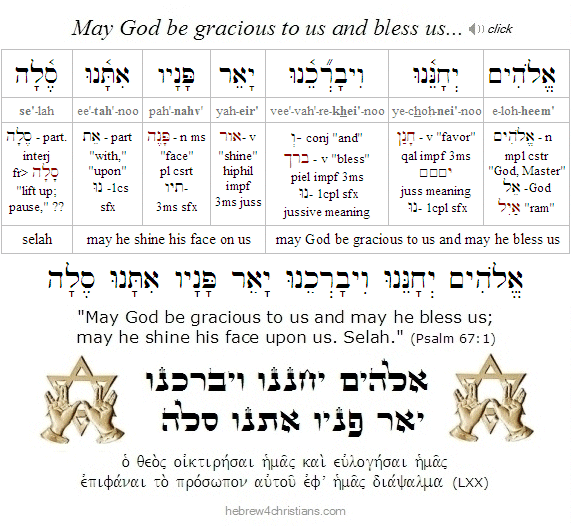
True spirituality is inner light that comes from union with Messiah. "God is light, and in him is no darkness at all." We "walk in the light," experiencing inner peace and joy in the Holy Spirit when we heed and obey the Voice of God's love and abide in the secret place of His grace. The people of God are united to one another by the power of God's love. O LORD God, "light up my eyes lest I sleep the sleep of death" (Psalm 13:3). May the light and love of the Lord our God shine within you, friends.
Torah of Miracles...
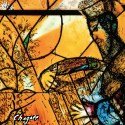
12.16.19 (Kislev 18, 5780) Perhaps you (like me) once learned Psalm 19:7 as, "The law of the LORD is perfect, converting the soul." However, the Hebrew text might better be translated as, "The instruction (i.e., Torah) of the LORD is perfect, returning the soul." This is the message of teshuvah (תְּשׁוּבָה), or "repentance." We turn away from ourselves to discover that only the love of God given in Yeshua gives life to our dead hearts (Mark 1:15). Teshuvah is therefore first of all a matter of faith, of trusting in the miracle of God. And though it is indeed a great gift from heaven, it requires that we pass through the "narrow gate" of humility by confessing the truth about who we are (Matt. 7:13). We turn away from our pride; we acknowledge our inner poverty, our neediness, and we mourn over the loss and hurt caused by our sin. Teshuvah turns us away from our attempts to defend or justify ourselves and instead turns to God to heal our separation from love (Rom. 8:3-4). The miracle of love buries our old nature and transforms us into a new creation (2 Cor. 5:17).
תּוֹרַת יְהוָה תְּמִימָה מְשִׁיבַת נָפֶשׁ
עֵדוּת יְהוָה נֶאֱמָנָה מַחְכִּימַת פֶּתִי
to·raht · Adonai · te·mee·mah · me·shee·vaht · na'·fesh
ei·doot · Adonai · ne·e·ma·nah · mach·kee·maht · pe'·tee

"The Torah of the LORD is perfect, returning the soul
The testimony of the LORD is reliable, making wise the simple."
(Psalm 19:7)
Download Study Card

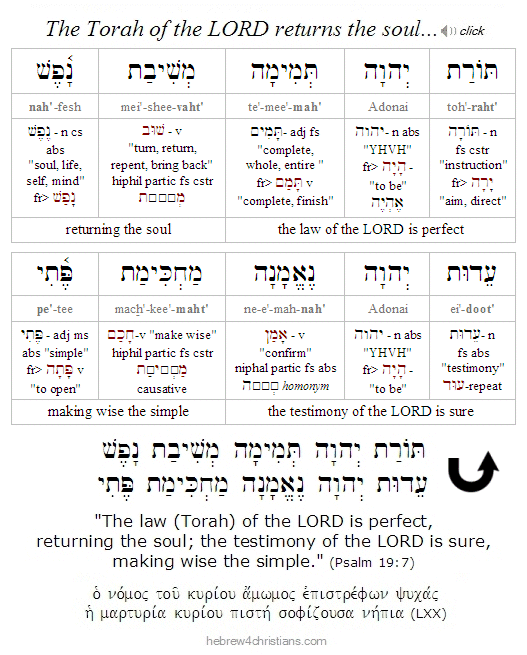
The Kotzker Rebbe is reported to have said, "There are miracles and then there are miracles... Some people regard as a miracle if God does someone's will; we regard as a miracle if someone does God's will." Amen, a true miracle - and one greater than the splitting of the sea - is that of a transformed heart that loves God and seeks to do God's will. Similarly, some people seek signs of the times and the End of the World, though the true "end of the world" arrives the moment you surrender your life to God's care...
Treasures of the Heart...

12.16.19 (Kislev 18, 5780) Our Lord appealed to us: "Do not lay up for yourselves treasures on earth, where moth and rust destroy and where thieves break in and steal, but lay up for yourselves treasures in heaven, where neither moth nor rust destroys and where thieves do not break in and steal. For where your treasure is, there your heart will be also" (Matt. 6:19-21). This teaches us that the good of the heavenly world is not subject to the decay of this world, and that God invites our hearts to find abiding treasure in His Presence.
This world is not our home; we are "strangers" here. It is an affliction to wait for the LORD, a blessed discontent, a "homesickness" of heart... The apostle Paul says our loneliness and alienation prepare for us an "eternal weight of glory" beyond all comparison, because we are not looking at what can be seen but at what cannot be seen. "For what can be seen is temporary, but what cannot be seen is eternal" (2 Cor. 4:17-18). Just as the "two-souled" man is unstable in all his ways, so the process of being "educated for eternity" means learning to focus our heart's passion and hope on the glory of heaven. "For where your treasure is, there will your heart be also."
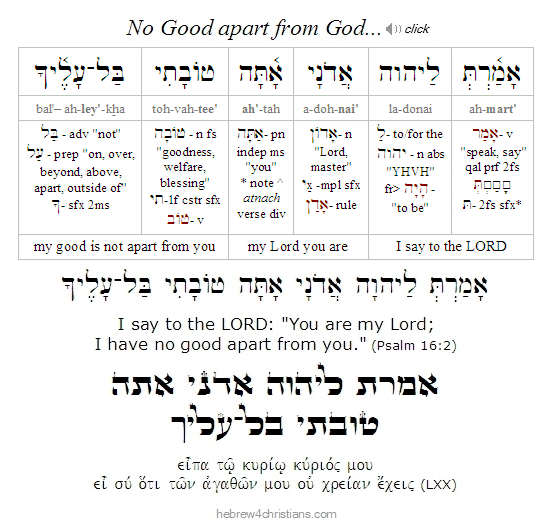 |
Lonesome Visions...
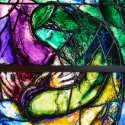
[ The following is related to this week's Torah reading, Parashat Vayeshev... ]
12.16.19 (Kislev 18, 5780) People often resist when they are asked to face reality, and therefore a true prophet is often misunderstood... We see this, for instance, in the case of Joseph, the family's prophet, who, after he related his visions, found the contempt of his brothers and the incredulity of his father (Gen. 37:10-11). This is the heartache of the prophet who is so impassioned about truth that it may lead him to lonely places, set apart from others, yet burdened to share his vision with those who are willing to hear. What good is prophecy, after all, apart from love? Or what good is knowledge, and even faith? (1 Cor. 13:2). The prophet "crosses over" and then is burdened with his vision. Rarely does he gain acceptance, since he asks us to see differently; unsettling our convictions, challenging our certainties. To a culture immersed in its delusions (including religious delusions) the prophet will always be marginalized, since the "world" constantly seeks to escape from reality and therefore cannot tolerate voices of real conviction.
"All truth passes through three stages. First, it is ridiculed. Second, it is violently opposed. Third, it is accepted as being self-evident" (Arthur Shopenhauer).
Chanukah and Humanism...
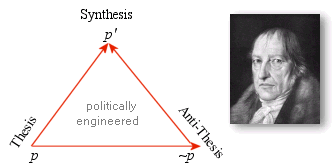
12.16.19 (Kislev 18, 5780) The holiday of Chanukah reminds us that we must remain committed to Torah truth in a godless, and therefore insane, world. After all, since reality is the "handiwork" (i.e., conscious design) of an all-powerful, all-knowing, all-loving, morally perfect, purposive, personal, and spiritual Agency who has been revealed in the Jewish Scriptures, those who deny this reality are living in a state of ongoing delusion. In a sense, the history of humanity - especially as it has been expressed philosophically and politically -- has been nothing less than the conscious design to redefine reality as something that it isn't. "The kings of the earth station themselves, and the dignitaries take counsel together against the LORD and His Messiah" (Psalm 2:1-3). Spiritual warfare is therefore the fight for sanity and truth in a world that prefers madness and self-deception.
In a prophetic sense the story of "Epihpanes" foreshadows the coming time of the "Messiah of Evil" (antichrist) who will one day attempt to "assimilate" all of humanity into a "New World Order" (Dan. 9:27, 2 Thess. 2:3; Rev. 13:7-9, etc.). At first he will appear to be a "world savior" who will broker peace for Israel and the Mideast, but after awhile, like his archetype Epiphanes, he will savagely betray the Jewish people and set up a "desolating sacrilege" in the Holy Place of the Temple (Matt. 24:15). His satanic rise will occur during acharit hayamim - the "End of Days" - otherwise called the period of the Great Tribulation (Matt. 24). The Final Victory of God will be established when Yeshua returns to destroy this Messiah of Evil at His Second Coming. The Holy Temple will then be rebuilt and dedicated by the hand of the true Mashiach of Israel.
The Gemara says that Javan, the descendant of Noah's son Japheth (Gen. 10:2), became the founding father of ancient Greece who inherited Japheth's blessing: "May God give beauty to Japheth (יַפְתְּ אֱלהִים לְיֶפֶת) and let him dwell in the tents of Shem" (Gen. 9:27). This blessing gave him the special ability to found the arts, philosophy, and science, though if these were exercised apart from the influence of Shem, that is, apart from a Torah perspective, such pursuits would ultimately become vain and even dangerous. In other words, even though "all truth is God's truth," human learning must be contextualized in light of the divine revelation. The humanistic mindset deifies knowledge and technique; it understands to believe, instead of believing to understand. For this reason, among others, the spiritual war between Zion and the secular world rages to this hour...
Note: For more on this, please see "Chanukah and Spiritual Warfare."
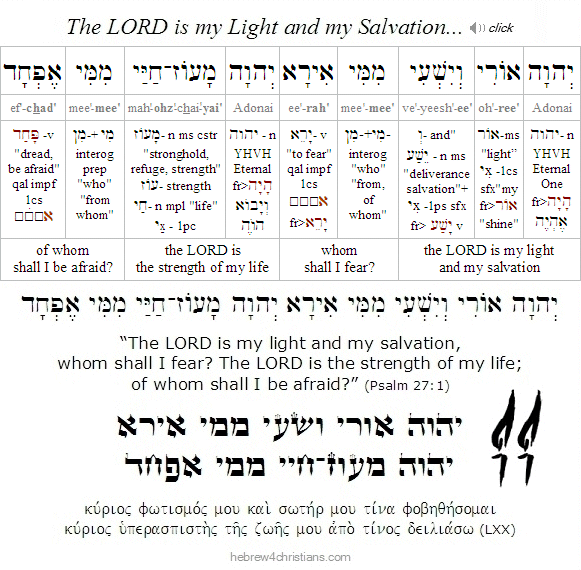 |
Parashat Vayeshev - וישב
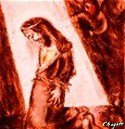
[ In our Torah for this week we read how Joseph's jealous brothers stripped him of his "coat of many colors" and threw him into a pit -- a providential event that eventually led to the deliverance of the Jewish people by the hand of a "disguised savior." Indeed, the life of Joseph foreshadowed the two advents of Yeshua our Messiah: first as Israel's Suffering Servant and second as the national deliverer of the Jewish people during the time of great tribulation... ]
12.15.19 (Kislev 17, 5780) Last week's Torah (i.e., parashat Vayishlach) recounted how Jacob had wrestled with a mysterious Angel before returning to the Promised Land to be reconciled with his brother Esau. This week's portion (i.e., parashat Vayeshev) begins with Jacob living back in the land promised to Abraham and Isaac with his 12 sons, but the narrative quickly turns to Jacob's favorite son Joseph, who was seventeen years old at the time. The Torah states that Jacob loved Joseph more than all his other sons since he was "the son of his old age," and he was the firstborn son of his beloved wife Rachel. Indeed, Jacob made him an ornamented tunic to indicate his special status in the family.
As the favored son, Joseph's job was to oversee the activities of Jacob's concubines sons (Dan, Naphtali, Gad, and Asher) and to bring "reports" about their activities back to Jacob. However, this role as the overseer and "favored son" was too much for the other brothers, and they became jealous of him and hated him. To make matters worse, Joseph related two dreams to his brothers that foretold that he was destined to rule over them, increasing their envy and hatred of him (the implication of the dreams was that all of Jacob's family would become subservient to him). Jacob rebuked Joseph for arousing his brothers' hatred, but he inwardly took note and waited for the fulfillment of the dreams.
The portion records that one day the brothers went out to pasture their herds, but when they saw Joseph coming to check on them, they conspired to kill him, though later they decided to sell him to some slave traders instead. The brothers then staged Joseph's death by dipping his special tunic into goat's blood and bringing it to their father, who was deceived into thinking that Joseph had been killed by a wild animal.
Meanwhile Jospeh was purchased at a slave trade by Potiphar, a captain of Pharaoh's guard. The LORD was "with Joseph," however, and blessed everything he did. In fact, soon he was promoted to be the head of Potiphar's entire household affairs. Potiphar's wife then began enticing Joseph to have an affair with her, and though he steadfastly refused her advances, she later falsely accused him of attempted rape. Potiphar was understandably outraged (at his wife?) and threw Joseph into the royal prison, but again God showed him favor there and soon was appointed to a position of authority in the prison administration.
The portion ends with two prophetic episodes in Joseph's life that eventually would bring him to the attention of Pharaoh himself. While in prison, Joseph met Pharaoh's wine steward and chief baker, both incarcerated for offending their king (according to Rashi, a fly was found in the goblet prepared by the butler, and a pebble in the baker's confection). Both men had disturbing dreams which Joseph correctly interpreted; in three days, he told them, the wine steward would be released but the baker would be hanged. Joseph then asked the wine steward to advocate for his release with Pharaoh. Joseph's predictions were fulfilled, but the wine steward forgot all about Joseph.
Holiday Alert: Chanukah...

This year the eight days of Chanukah begin on Sunday, December 22nd at sundown (1st candle) and will run through Monday, Dec. 30th (until sundown). The tradition is that on the first night of Chanukah one flame is lit, on the second night two, and so on until the eighth night when eight flames are lit. In this way we remember the 'growth' of the miracle.
The Way of your Life...
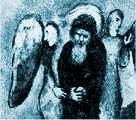
12.13.19 (Kislev 15, 5780) The Hebrew word derekh (דֶּרֶךְ), often translated as "way," can refer to a physical road or pathway, but metaphorically it often refers to the journey, manner, or course of one's life. Everyone who is alive and conscious is "on the road," and every day presents us with choices about how we will walk down that road. If you are reading these words, you are presently on the way, and there is no escape from this journey you are on...
Walking a road implies decisions. You simply cannot walk anywhere without having a "where" or destination in mind (even the decision to be aimless is itself a decision). When we make decisions, consciously or not we are choosing what we believe will bring us nearer the goal or end or our journey. Along the way we will always encounter "forks in the road" – junctions where we must decide whether to turn to the left or the right, or to go backward in our journey. Such decisions are unavoidable, though many will choose to become victims of their own unreflective consciousness by choosing the path of "least resistance." People choose this path because they do not know "the end thereof" they walk…
So there is a way, or road, that you are walking, comprised of a (finite) series of choices you have made, are making, and will make, which are leading you somewhere. You cannot get off this road, and no one can walk it for you. Since this road represents the way of your life, you are ultimately responsible for how you choose to walk it. You are not free to choose the "what" of your journey (which is a brute fact), but you are free to choose its "how." The LORD offers wisdom to all those who wish to make their days count for eternity...
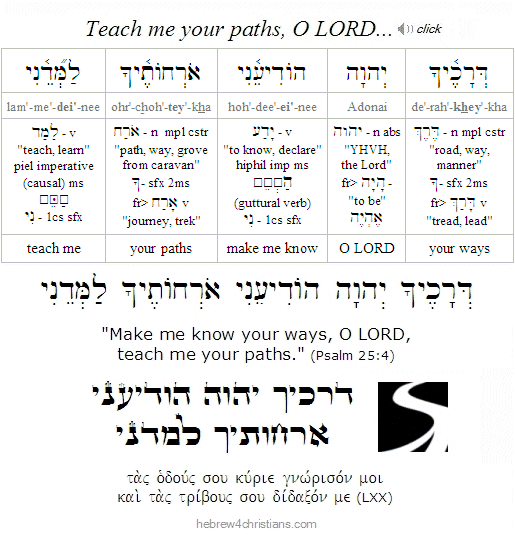 |
For more on this topic see: "Derekh HaYashar: Finding the Straight Way."
Remaining Steady...

12.13.19 (Kislev 15, 5780) The essential thing is to remain focused on what is ultimately real, true, and abiding. We do this by praying "without ceasing," which means intentionally focusing our thoughts and desires in light of God's Presence. King David said that he always "set" the LORD before him and therefore he was made strong in times of testing (Psalm 16:8). To know the truth means choosing before the audience of God's reality, before the holy witnesses of heaven and the sacredness that inheres in all things, as it is written: "Sanctify yourselves and be holy; for I am holy" (Lev. 11:44; 1 Pet.1:16). We know this truth as we live it - as we trust in the God's guidance in our decisions. Most especially we must learn the truth of God's comfort in Yeshua, for he promises never to leave nor forsake us.
אַל־תִּירָא כִּי עִמְּךָ־אָנִי
אַל־תִּשְׁתָּע כִּי־אֲנִי אֱלהֶיךָ
אִמַּצְתִּיךָ אַף־עֲזַרְתִּיךָ
אַף־תְּמַכְתִּיךָ בִּימִין צִדְקִי
al - tee·ra kee ee·me·kha - a'·nee
al - teesh·ta kee - a·nee e·lo·hey'·kha
ee·matz·tee'·kha af - a·zar·tee'·kha
af - te·makh·tee'·kha bee·meen tzeed·kee

"Fear not, for I am with you;
be not dismayed, for I am your God;
I will strengthen you, yea, I will help you,
yea, I will uphold you with the right hand of my righteousness."
(Isa. 41:10)
Download Study Card

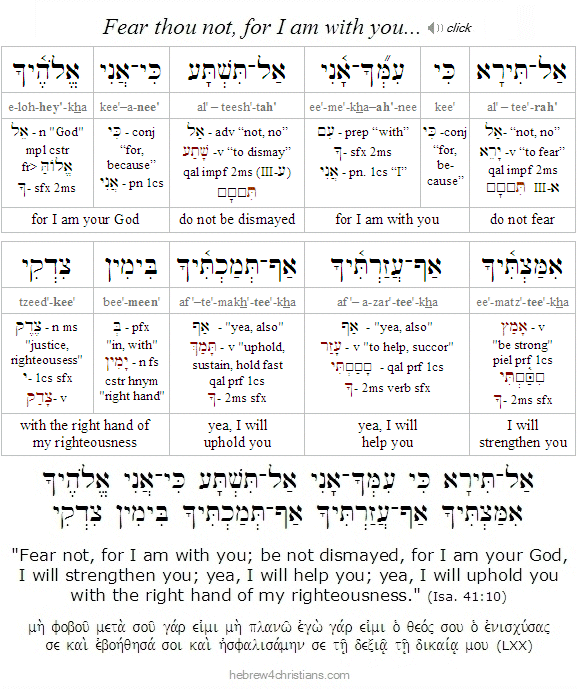
Hebrew Lesson:
Psalm 63:8 Hebrew reading (click):
Redeeming the Time...

12.13.19 (Kislev 15, 5780) "Teach us to number our days, that we may apply our hearts unto wisdom" (Psalm 90:12). Each soul is given a finite amount of time in this world, and therefore Moses asked God to teach us how to live in light of our ultimate end... For this we need wisdom, which primarily consists of knowledge of the holy (דַעַת קְדשִׁים) and the experience of the awe of the LORD (יִרְאַת יְהוָה, Prov. 9:10). Note then the connection between learning to "number our days" and apprehending the sacredness of life. As we learn to esteem our days, so we discover wisdom for our sojourn to eternity. Reflecting on the brevity of life awakens us to consciously reflect upon the course of our lives and to distill the ultimate concerns of our hearts. After Adam sinned in the Garden, he vainly tried to hide himself until he heard the Voice of God calling out: אַיֶּכָּה - ayeka? – "Where are you?" That is the question for each soul as we learn to discern the direction of our lives. Where are you today, and where are going? Our days are numbered, friend, and it is of utmost importance to apply our hearts unto wisdom while we still have the time and strength to do so. "No one knows the day or hour..." May God help us to learn how to make our days count for eternity, to have a weight of glory that will shine in the world to come. Amen.
לִמְנוֹת יָמֵינוּ כֵּן הוֹדַע
וְנָבִא לְבַב חָכְמָה
leem·noht · ya·mei'·noo · kein · ho·da
ve·na·vee · le·vav · chokh·mah

"Teach us to number our days
that we may apply our hearts unto wisdom."
(Psalm 90:12)
Hebrew Study Card

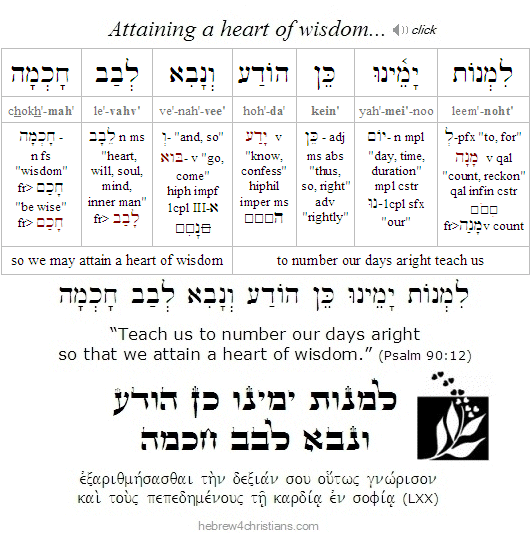
Notwithstanding the frailty and brevity of our days, may it please God to shine the power of His radiance upon us and to establish our works for His praise: "May the beauty of the LORD our God be upon us and establish the work of our hands upon us; yes, establish the work of our hands" (Psalm 90:17). May the LORD our God teach us to "number our days" so that we may obtain levav chokhmah (לְבַב חָכְמָה) - a heart of wisdom to live according to His will (James 1:5). And above all else, may the "God of our Lord Yeshua the Messiah, the Father of Glory (אֲבִי הַכָּבוֹד), impart to you a spirit of wisdom and of revelation in the knowledge of Him, having the "eyes of your hearts" (ὀφθαλμοὺς τῆς καρδίας) enlightened, that you may know what is the hope to which he has called you" (Eph. 1:17-18). May you be strong, resolute, and fully focused on our LORD, chaverim. Amen.
Matters of First Importance... 

[ I wrote a new article about the Gospel according to Paul that I hope you will find encouraging and helpful. Please see the link at the end of this entry for the entire read. Shalom chaverim... ]
12.13.19 (Kislev 15, 5780) The Apostle Paul summarized the message of the gospel by means of four empirical propositions, namely: 1) that Messiah died for our sins according to the Scriptures; 2) that he was buried; 3) that he was raised on the third day according to the Scriptures; and 4) that he was seen alive by various eyewitnesses after his death (see 1 Cor. 15:1-8). Paul went on to argue that the reality of the resurrection is the center of salvation, for if Yeshua had not been raised from the dead, his repeated declarations that he would suffer, die, and come back to life would be untrue, and therefore we would still be captive to our sins. The great fact that Yeshua was indeed raised from the dead, however, demonstrates that his mission to redeem humanity was successful, and that death has been "swallowed up" by means of his victory over the curse of sin (1 Cor. 15:36). This is the core message that Paul regarded as being of "first importance" and essential to salvation.
Now if we take a moment to reflect on Paul's summary, we soon realize that he had made certain assumptions that were presupposed in his description of the essential gospel message. First, of course, is that his summary declaration appeals to the reliability and trustworthiness of the Jewish Scriptures (as clearly indicated by the repeated phrase "according to the Scriptures" (κατὰ τὰς γραφάς). If someone were to question why they should believe what the Jewish Scriptures say, Paul would have had to provide "evidential reasons" for their authenticity, veracity, and credibility, since he couldn't just appeal to the Scriptures to establish their truth without begging the question. This in turn would have implied appealing to the historical experience of the Jewish people, including their origin as the descendants of the patriarchs Abraham, Isaac, and Jacob, their 400 year enslavement in Egypt, their deliverance from bondage during the Exodus, the awesome revelation of the Torah given at Mount Sinai, and so on.
As one trained in the learning of the Pharisees (Acts 22:3), it is likely Paul would have retold the grand narrative of the Jewish Scriptures, beginning with the creation of Adam and Eve, their transgression and exile from the original paradise, and the subsequent degeneracy of the human race. Paul would have explained the deliverance of Noah from the worldwide judgment of the flood and the subsequent genealogy of Noah's sons culminating in the advent of Abraham, the first patriarch of the Jewish people. The history of Abraham, Isaac, and Jacob would be retold particularly in relation to the oath of blessing and the divine promise regarding the coming "Seed" (i.e., descendant) who would be the Heir and Savior of the world. Paul would then have reviewed the history of the Israelites and their deliverance from slavery in Egypt under Moses, the giving of the law code and the covenant at Sinai, the vision and establishment of the Tabernacle (and later the Temple in Jerusalem), and so on.
Throughout his historical review Paul would have focused on how Yeshua fulfilled the prophetic promises of God regarding the coming of the Messiah, quoting from the Torah, the Writings, and the various prophets of Israel. Moreover Paul would have appealed to the great oral tradition of the tzaddikim, the faithful ones of Israel, who were eagerly awaiting the coming of the Messiah.
If someone persisted to question the truth of the testimony of Scripture, it is likely Paul would have appealed to the meticulous scribal traditions of Israel, how the texts were scrupulously preserved for millennia using the most rigorous of standards of scribal transmission (soferut), and so on. Regarding the identity of Israel's promised Messiah, Paul would have appealed to the various prophetic witnesses recorded in Scripture, words from Abraham, Jacob, Moses, King David, Isaiah, Jeremiah (among others), as well as eyewitness reports regarding the miracles of Yeshua, including his own personal encounter with the risen Lord on the road to Damascus (Acts 9:3-19; Acts 26:12-18; Gal. 1:11-16; Phil. 3:3-7; Acts 17:17). Paul also would have appealed to extra-biblical sources of confirmation of the testimony, such as historical accounts of the life of Yeshua by his contemporaries, including accounts provided by the Jewish Sanhedrin and Roman officials regarding his crucifixion. In addition, Paul would have provided logical reasons for faith, including the argument from creation (Acts 17:24-28; Rom. 1:20), arguments from moral experience and conscience (Rom. 2:14-15; 2 Cor. 5:11), and arguments from intuitive awareness of God's existence as the first cause of existence (Rom. 1:18-20; Acts 17:28). It was Paul's custom to reason with his fellow Jews from the Scriptures regarding the truth of the gospel message (Acts 17:2, Acts 18:4), but to Gentiles who did not know the Torah he used logic, appeals to empirical fact, common religious sentiment, and sometimes philosophical reasoning to make his case for the truth of special revelation (Col 2.8; 1 Cor. 9:22; Eph. 4:17-24).
Concerning the more philosophical approach, Paul would have argued on behalf of basic monotheistic personalism, that is, the idea that there is one (and only one) God who is a omniscient (all-knowing), omnipotent (all-powerful), omnibenevolent (all-good), and who is the Source of all moral truth (Deut. 6:4-6; Psalm 139:17; Psalm 78:41, etc.). As the Supreme Being, God is One (not two or more) and the universe is a "creature" brought into existence yesh me'ayin, "out of nothing," that is, by an act of God's sovereign will. God is transcendent over creation yet immanent within its sustenance (Heb. 1:3; Col. 1:16-17, John 1:3; Rom. 11:36). This implies that reality is "two-tiered," composed of both material and spiritual dimensions, though humanity is thought to bridge both realms by being a physical creation endowed with a spiritual soul. God is reveal in "anthropomorphic" terms because human beings are made in the divine image and likeness (Gen. 1:26), and the spiritual is discerned through analogy with the physical (2 Cor. 2:11-13). The spiritual realm is revealed by God in two primary ways: 1) by general revelation (i.e., intuitive awareness of first principles of reason and logic that God exists and is the source of reality, see Rom. 1:19-20; Acts 14:17; Psalm 19:1, etc.) and 2) by special revelation (i.e., God interacting with select individuals in history who were entrusted to preserve and proclaim his message to others, see Deut. 4:7-8; Psalm 103:7; 147:19-20; John 4:22; Rom. 3:1-2; 9:4, etc.). Those narratives and words of special revelation esteemed as Scripture provide a semantic matrix for understanding the human condition of alienation, suffering, and the problem of death, apart from which the gospel message cannot be understood or proclaimed. For instance, the revelation at Sinai to the Jewish people distills and enshrines both the moral imperatives of human conscience as well as the need for blood atonement and deliverance from the guilt of sin (Lev. 17:11). The "korban principle" of "life-for-life" vicarious substitution was prefigured in the primordial garden (Gen. 3:21), symbolized in the sacrifice of Isaac (Gen. 22; Heb. 11:19), foretold in the Passover sacrifice of the lamb of God (Exod. 12:21-27), enshrined in the sacrificial system of the Mishkan by the "korban tamid," or daily offering, of the lamb (Num. 28:1-8); dramatized in the elaborate Yom Kippur ritual that culminated with the sacrificial blood being put over the broken tablets of the law in the holiest place (Lev. 16; Heb. 9), and so on. All of these special revelations signified the coming Redeemer of Israel, the great Lamb of God who takes away the sins of the world (John 1:29).
The advent of "God in the flesh," that is, incarnation of Yeshua, however, is the climax of all special revelation, the ultimate "Word of God" (John 1:1-14). Yeshua, who is fully God and the Creator of the universe (John 1:1-3; Col. 1:15-17; Heb. 1:3; Isa. 44:6; Rev. 22:13, etc.), emptied himself of all regal glory by clothing himself in human flesh to become the "Second Adam" and the atoning sacrifice for the fallen human race (Phil. 2:7; 2 Cor. 8:9; Rom. 8:3). Yeshua was "born to die" as humanity's exchange (1 Cor. 15:45; 2 Cor. 5:21). The "deeper truth" of grace is thereby revealed: because of Yeshua's intercession, the verdict of the law is overcome by God's mercy and yet God is both fully just (in upholding the verdict of the law) yet the justifier of the ungodly who trusts in the divine work of deliverance given in Messiah (Rom. 3:26; Psalm 85:10; John 1:17). The resurrection further reveals not only that Yeshua died for our sins but that his sacrifice was fully accepted for our atonement. Faith in his sacrifice for your sins means you trust that his blood was shed for you, that his resurrection means that he is alive, your Living God, Redeemer, and Savior.
Note: Charles Spurgeon once prophetically said: "A time will come when instead of shepherds feeding the sheep, the church will have clowns entertaining the goats." The following article, I hope, moves in the way of the Shepherd who offers the bread of truth for his sheep: "Matters of First Importance: The Gospel According to Paul."
Finding Real Treasure...

12.12.19 (Kislev 14, 5780) "The kingdom of heaven is like treasure hidden in a field, which a man found and covered up. Then in his joy he goes and sells all that he has and buys that field. Again, the kingdom of heaven is like a merchant in search of fine pearls, who, on finding one pearl of great value, went and sold all that he had and bought it" (Matt. 13:44-46). Here Yeshua teaches us that a relationship with God is the true source of joy and value in life, and that all other passions and desires are like "fools gold" when compared with its overwhelming worth... In this connection Soren Kierkegaard wrote: "If anyone thinks he is a Christian and yet is indifferent toward being that, then he really is not one at all. Indeed, what would we think of a person who gave assurances that he was in love and also that it was a matter of indifference to him?" (Works of Love). The Shema, the "first and greatest commandment," is to love God "bekhol levavkha" (בְּכָל־לְבָבְךָ) with all our hearts, and yet how is that love possible apart from the revelation of the passion of love itself? "We love because God first loves us" (1 John 4:19), and therefore teshuvah ("repentance") is a matter of being in love, celebrating God's heart for us, awakening to its wonder, and being thrilled and overjoyed at its reality. Is this not the essence of the matter? "Shimon ben Yonah, atah ohev oti?" – "Simon son of Jonah, do you love me?" (John 21:17). But how can we love the Lord apart from trusting his heart for us? "Come unto Me," Yeshua says, "live in Me and I will live in you." O Lord God our Savior, deliver us from apathy and indifference! Soften our hearts and awaken us to our great desire and need for you! Hashivenu, Adonai: turn us, O LORD, and we shall be turned; heal us, and we shall be healed... Help us to come to you and to know the breadth and length and height and depth of your great love for us.
 |
So for what do you hope, friend? What are your dreams? Your deepest desires? Where is your treasure? Yeshua cautioned those who sought their happiness in this world: "Do not store up for yourselves treasures upon earth... be rich toward God" (Matt. 6:19-20; Luke 12:21). When we treasure God, our focus is directed toward the eternal reality, and our interest in this world is minimal. We trust God to meet our daily needs and surrender our future to His care. The only worry we face concerns our own deficiencies in our obligations to the Savior. Our duty is to love God in the truth - bekhol levavkha - with all our heart, having no thought of ourselves. Indeed, self-denial means to quit thinking about yourself (from α-, "not," + ῥέω, "to speak") by accepting what God has done for you. "It is not my business to think about myself. My business is to think about God. It is for God to think about me" (Simone Weil).
מִי־לִי בַשָּׁמָיִם
וְעִמְּךָ לא־חָפַצְתִּי בָאָרֶץ
mee'·lee · va·shah·ma'·yeem
ve·ee·me·kha · loh · cha·fatz'·eei · va·a'·retz

"Whom have I in heaven but you?
And there is nothing on earth that I desire besides you."
(Psalm 73:25)

Download Study Card
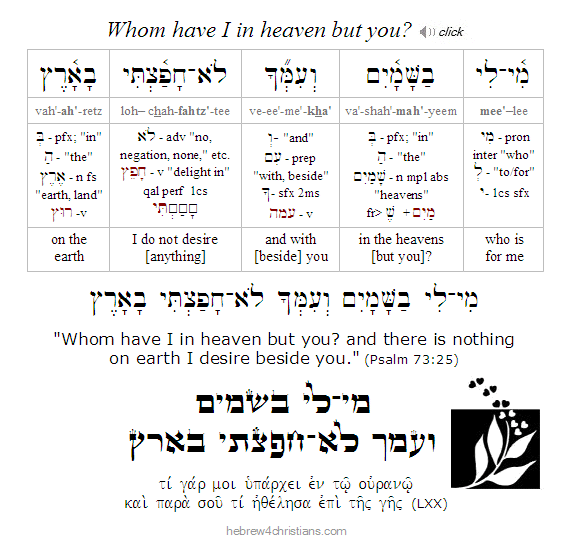
Site Update: I have spent the better part the day trying to recover from another web host "upgrade" that has impacted the Hebrew for Christians website and email server.... Every time a new patch is added to the web servers, I spend days repairing broken links, restoring lost images, and recovering other damage caused to the site. I have also discovered that my web host provider has NOT been delivering email I have sent from hebrew4christians.com for the last month or two, so if you have written me but heard nothing back, it's not because I have not responded but because of mail server issues. I have been trying to contact my ISP to get some technical support with no success. Thank you for your patience...
Chanukah and Vigilance...
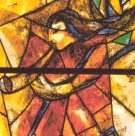
[ The eight-day Festival of Chanukah begins at sundown on Sunday, Dec. 22nd this year... ]
12.12.19 (Kislev 14, 5780) The message of Chanukah is to resist being "assimilated" into this dark world and its benighted culture. As it says in our Scriptures, "Do not be conformed to this world, but be transformed (i.e., transfigured by the light) through the renewal (ἀνακαίνωσις) of your mind, that by testing you may discern what is the will of God" (Rom. 12:2). Notice that the Greek word translated "conformed" is a passive verb (συσχηματίζω, derived from σύν, "with," + σχῆμα, "matrix") which means that we must consciously resist being lulled into accepting this world's various ideologies (matrix) that are crafted to ignore Divine the Presence and Truth. In the realm of the spiritual, there is simply no place of neutrality, and if we are not going forward, then it's likely we are going backward... Therefore we are repeatedly commanded to test the spirits and to examine truth claims. We ask God for wisdom and use the insight that comes from the Holy Spirit.
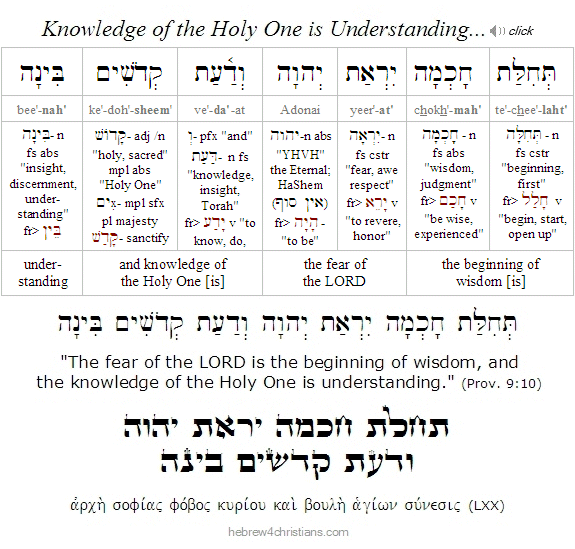 |
Again do not let your mind be conformed (lit., "squeezed into the matrix") of this world (for example, by believing the propaganda delivered by the social engineers of mass media), but be transformed (μεταμορφόω, i.e., "metamorphosized" like a caterpillar is changed into a butterfly) by the renewal of your mind (Rom. 12:2). The Greek word translated "renewal" is ἀνακαίνωσις, from ἀνά, meaning "up, into the midst," and καινός, meaning "newness." The idea here is that we are inwardly transfigured as we take hold of the truth of the new covenant and make it central to our lives. For this we must "put on the mind of Messiah" and repudiate the world's values and vain philosophies (1 Cor. 2:16). "When the devil is called the god of this world, it is not because he made it, but because people serve him with worldliness." The "god of this world" blinds the eyes of those who do not believe so they cannot see the truth of the gospel of Messiah (2 Cor. 4:4). The philosophy of this world is always based on lies, propaganda, fear, lust, pride, anger, appeals to vanity, and so on. We must use discernment and test the world's assumptions against the truth of the Scriptures.
Through the Wound...
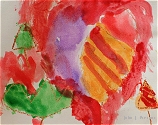
12.11.19 (Kislev 13, 5780) "Find God or die" is a slogan for those who are desperate for deliverance. Many of us have felt abandoned at some time, perhaps because of a tragic event that happened when we were vulnerable or unable to defend ourselves. The painful message implied in any kind of abandonment is, "You are not important; you are not of value." Because of this, we may endlessly search for approval from others, even supposing that God's very love is conditional... We may be tempted to engage in "magical thinking" that God can be bribed with ritual acts or flattery. Part of the healing process is to discover that God comes "through the wound." Despite the pain of our past, we come to trust that all of our life is redeemed, not only that which we can accept, but also that which we can do nothing but agonize and protest. God's grace goes there, too. Yeshua said, "I will not leave you comfortless: I will come to you... Because I live, you shall live also" (John 14:18-19). Amen, the promise of God says: "You shall not die, but live, and declare the works of the Lord" (Psalm 118:17). God will wipe away your tears, friend...
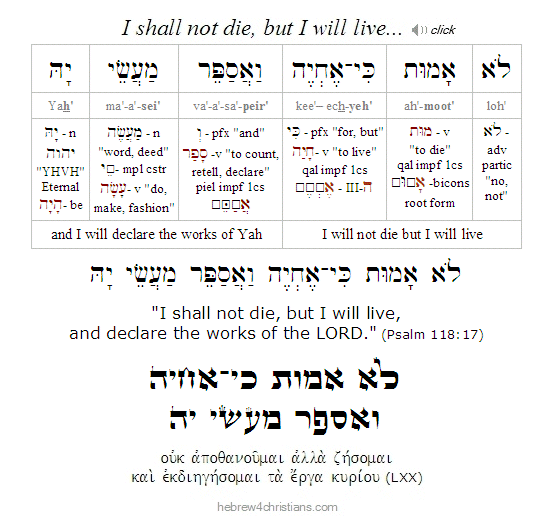 |
Jacob's Surrender...
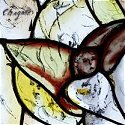
[ The following entry is related to this week's Torah reading, parashat Vayishlach... ]
12.11.19 (Kislev 13, 5780) Among other things, our Torah portion this week tells the story of how Jacob fled from the land of Haran to return home, but this forced him to directly face the pain of his past (Gen. 32:3-36:43). Jacob was especially anxious about seeing his aggrieved brother again, and therefore he prayed to God in humility for deliverance (Gen. 32:9-11). He then sent messengers ahead with gifts for Esau, and when he finally approached him, Jacob humbly bowed down "seven times" in deep respect. The sages comment that Jacob realized the only hope he had of protecting himself and his family was to diminish himself... His long-standing battle with Esau had really been an inner struggle with his own ego - his own insatiable desire to be first, to secure his father's favor, and so on. Because of this, Jacob realized he could only find peace with his brother if he first found peace within himself, and therefore he let go of his need to be first and surrendered himself. Paradoxically this teaches that we must descend in order to ascend, and the "the way up is the way down" (John 12:24). As Yeshua said, "The first shall be last and the last shall be first," and "Whoever would be first among you must be the servant of all" (Mark 9:35; 10:44). Becoming "nothing" (i.e., ayin) in this world is the condition for life in the world to come (Gal. 6:3). When you are "not there," you are no longer enslaved to the lower nature, and therefore you are set free to serve God (Col. 3:1-3).
Of course we are only enabled to extinguish the demands of the ego by trusting in the miracle of God, not by trying to efface ourselves... Genuine surrender is not another venture of the ego, after all. Life in the Spirit means trusting that God will do for you what you cannot do for yourself... We can only take hold of what God has done for us by "letting go" of our own devices (Phil. 2:13). When we really let go and trust, we will be lifted up by the "Torah of the Spirit of life" (Rom. 8:2). The way is not trying but trusting; not struggling but resting; not of clinging to life, but of letting go...
Note: While it's true Esau was profane and wicked, it is also true that Jacob wrongfully deceived his father, stole the blessing from his brother, and even used the Name of God in vain (Gen. 27:20). However, whereas Jacob lied to obtain the blessing, Esau lived a lie with his life... Moreover Jacob was punished by being sent into exile for his sin, whereas Esau lived off the "fat of the land" and enjoyed worldly prosperity. Jacob grew into a small clan of eleven sons and a daughter, whereas Esau had many children and an entire army at his disposal. It is dangerous to judge the brothers based on appearances, especially since the tzaddik will be tested in ways that the wicked is not... God let go of Esau because Esau had let go of God; but Jacob held on for dear life and was wounded in the process. In the end, God chose Jacob because he loved him - and for no other reason (Rom. 9:10-18).
Wresting the Blessing...

[ The following entry is related to this week's Torah reading, parashat Vayishlach... ]
12.10.19 (Kislev 12, 5780) In our Torah portion for this week (i.e., Vayishlach), we read how Jacob wrestled with a mysterious "Man" until the break of dawn, but refused to let go until he had secured God's blessing (Gen. 32:24-26). This climactic moment marked a "rebirth" experience for Jacob as signified by his new name "Israel" (יִשְׂרָאֵל), meaning "one who has striven (שָׂרָה) with God (אֱלהִים) and prevailed" (Gen. 32:28). It is fascinating to notice that Jacob was not renamed "God-fearer," or "God-lover," or even "Man of faith," but rather "God-wrestler" – one who struggles with God until the blessing comes... As Yeshua said, "Blessed are those who hunger and thirst for righteousness" – that is, for those who struggle and search for truth – "for they shall be filled" (Matt. 5:6). The blessing comes with a wound, however: The limp that Jacob acquired constantly reminded him of his ongoing need for God's help as he walked through this life. "The one who falls on this Stone will be broken to pieces; but when it falls on anyone, it will crush him" (Matt. 21:44).
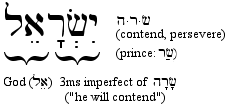 |
So how are you struggling? How does that feed your hunger for God? The characteristically Jewish approach to life is to struggle, to fight, and to ask hard questions until we find out who we really are and what we call ourselves... We can change what has happened in our past by changing what is happening in our present: "For thus says the LORD to the house of Israel: dirshuni vichyu (דִּרְשׁוּנִי וִחְיוּ) - "Seek me and live" (Amos 5:4).
Blessed Need of Heart...

12.10.19 (Kislev 12, 5780) "I need Thee every hour..." More than anything else, God's love is what we desperately need, isn't it? In moments of testing when we feel wounded, alone, unworthy, afraid, and needy; and especially when we succumb to the depths of despair... God's love descends to the depths of our soul - to the very dust of death itself - to hear our cries and to profoundly touch us... Praise the Name of Love - despite everything, God saves us from ourselves, from our worst fears, and from the hell of shame and abandonment. My soul yearns for you in the night; my spirit within me earnestly seeks you (Isa. 26:9). I say to the LORD, Adonai atah: "You are my Lord; I have no good apart from you" (Psalm 16:2).
אָמַרְתְּ לַיהוָה אֲדנָי אָתָּה
טוֹבָתִי בַּל־עָלֶיךָ
ah·mart · la·doh·nai: · A·doh·nai · ah'·tah
toh·vah·tee · bal - ah·ley'·kha

"I say to the LORD, "You are my Lord;
I have no good apart from you."
(Psalm 16:2)
Hebrew Study Card

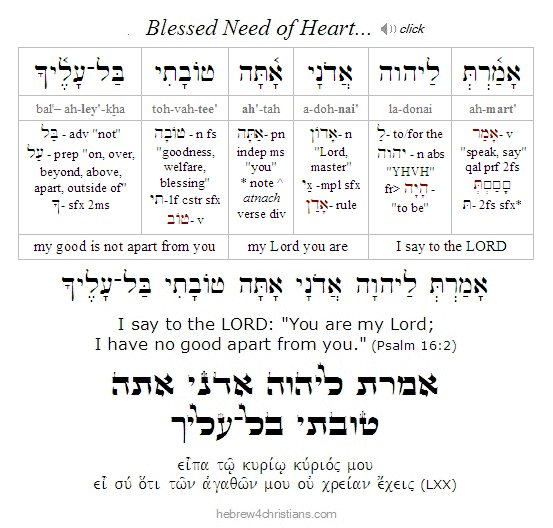
The ongoing need for the LORD is perhaps the highest estate of the human soul, even if it is nevertheless attended with heartsickness and unrelenting longing. It is a great, great gift from heaven to know God as your heart's true desire - to fully understand that your relationship with Him is the ultimate concern and treasure of your existence.
Torah of Brokenness...
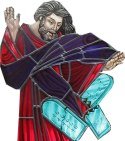
12.10.19 (Kislev 12, 5780) "The LORD is the healer of the brokenhearted and the One who binds up their sorrows" (Psalm 147:3). It was only after Moses experienced brokenness and confession (prefigured by the shattering of the first set of tablets and the 40 days of teshuvah) that the inner meaning of God's Name (יהוה) was revealed as "mercy, grace, longsuffering, great in faithfulness, compassion," and so on (see Exod. 34:6-7). The passion of Moses prefigures the inner breaking necessary before the law of God can be "written upon the heart." As it is written of the New Covenant, "I will put my Torah within them, and I will write it on their hearts" (Jer. 31:33).
הָרפֵא לִשְׁבוּרֵי לֵב
וּמְחַבֵּשׁ לְעַצְּבוֹתָם
ha-ro·fei · leesh·voo·rei · leiv
oo·me·cha·beish · le'at·tze·vo·tahm

"He is the healer of the brokenhearted
and the One who binds up their sorrows."
(Psalm 147:3)
Download Study Card

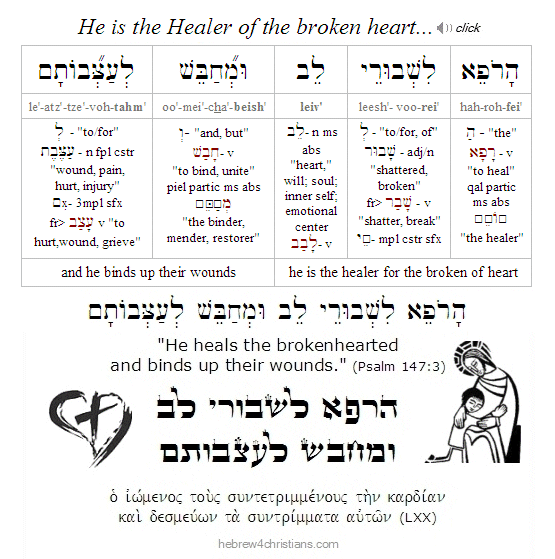
Crucified with Him...
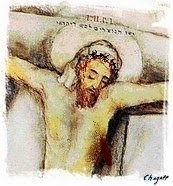
12.09.19 (Kislev 11, 5780) Are you hungry for real change? Do you thirst for new life? Turn to the Source... Only God can help us die to ourselves - to let go of the "self life" and to be set free from the tyranny of what we naturally are... The old nature is never "reformed" by religion but is put to death by a supernatural act of God, as it says: "I have been crucified (συνεσταύρωμαι) with Messiah; it is no longer "I" who live, but Messiah who lives in me. And the life "I" now live in the flesh "I" live by faith in the Son of God, who loved me and gave himself for me" (Gal. 2:20). By faith we trust that we already have been crucified with him, just as by faith we trust that we already have newness of life, though all this is only "theoretical" unless and until the Spirit of God makes it real in our lives. Only the LORD can put a new heart within us; only God can make the new "I" walk in the flesh; only the Spirit can breathe upon dry bones raised from the dust to make them live (Ezek. 37:5). We must believe not only that Yeshua died as our substitute for sin - saving us from its penalty - but also that our old nature has died with him - delivering us from its power. As it is written, "We know that our old self was crucified with him in order that the body of sin might be brought to nothing, so that we would no longer be enslaved to sin" (Rom. 6:6).
"Do you not know that all of us who have been baptized into Yeshua the Messiah were baptized into his death? We were buried therefore with him by baptism into death, in order that, just as Messiah was raised from the dead by the glory of the Father, we too might walk in newness of life" (Rom. 6:3-4). "For as many of you as were baptized into Messiah have put on the Messiah" (Gal. 3:27) [by "baptism" think identification, not some ritual act]. Yeshua not only died for our sins, but he also has released us sin's power, that is, from the power of death itself. May the LORD our God make the truth of what He has done for us alive and breathing in us -- by the power of his salvation in Yeshua!
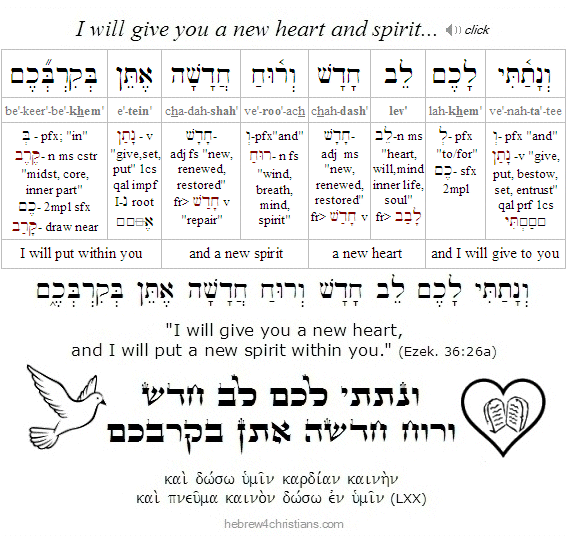 |
Eternal life is found in the righteousness of Yeshua, and self-denial means to quit thinking about yourself (from α-, "not," + ῥέω, "to speak") by accepting what he has done for you. We have been (already) crucified with Messiah (the verb συνεσταύρωμαι is a perfect passive form), and just as we are identified with him in his death, so we are identified with him in his resurrected life. This is a matter of faith, trusting that God's love for your soul overcomes the law's powerlessness and your own inability to save yourself...
Telling God your name...
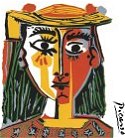
[ The following entry is related to this week's Torah reading, parashat Vayishlach... ]
12.09.19 (Kislev 11, 5780) Some people make it the business of theology to know God's Name, but God begins by first asking for our name instead. Recall that Jacob had disguised who he really was in the hope of obtaining the blessing (Gen. 27), though his duplicity forced him into an exile that lasted until he was finally willing to be honest with himself. And like Jacob, each of us must answer God's question: "What is your name?" (Gen. 32:27). When we "wrestle through" this question to face who we really are, we encounter God and find our blessing, that is, our true identity. Each of us has to go through the process of being renamed from "manipulator" (i.e., Yaakov) to "one in whom God rules" (i.e., Israel). But note the order: it is only when we "tell God our name," that is, own who we really are, that He meets with us "face to face" (Gen. 32:30). You will not be able to say, "I will not let you go unless you bless me," until you are willing tell God your name (Gen. 32:26-27).
Let me add that while "telling God your name" can be painful and even frightening, it is not the last word about who you really are. We are faced with an inner dualism as we struggle to take account of our lives. On the one hand, we need to confess the truth of our sinfulness, brokenness, and so on, while on the other we must endure ourselves and find faith that God's blessing nevertheless belongs to us, despite the mess we've made of our lives.... We have to be willing to accept God's new name for us and to believe that God will miraculously transform our inner nature for good. We are renamed from Yaakov to Israel, though we still know ourselves as both. Jacob was renamed "Israel" but afterward he walked with a limp, seeing both the new and the old natures within him. Jacob still struggled, though his struggle was now focused on walking as God's beloved child in this world: the limp was given to help him lean on the Lord for support.
Part of spiritual growth involves learning to "endure yourself." Many are able, it seems, to receive the hope that they are forgiven for their past sins, but they are subsequently scandalized by encountering their own inner struggles, and they eventually despair over their ongoing weakness... Tragically, some are even tempted to regard the warfare within the heart as a sign of being devoid of all saving grace! We must remember, however, that there is a real struggle between the desires of the flesh and the desires of the Spirit (Gal. 5:17). We must never move away from simple trust in the message of God's unconditional love demonstrated at the cross; we must never seek to legitimize our place in God's heart. When we walk by the Spirit, we are no longer under the law (Gal. 5:18), which is to say, we no longer need to justify ourselves but instead trust in God's power to transform us. Just as we are saved by the love of God, so are we changed, so do we grow.
Parashat Vayishlach...

[ We always read Vayishlach a couple weeks before Chanukah when we connect the vision and ministry of Joseph with that of Yeshua, the Suffering Servant Savior of the world... ]
12.08.19 (Kislev 10, 5780) Our Torah portion this week (i.e., parashat Vayishlach) contains the famous account of how Jacob "wrestled" with the Angel of the LORD (מַלְאַךְ יְהוָה) just before he encountered his estranged brother Esau. During the "grappling" session (recall the meaning of Jacob's name), the Angel injured Jacob's thigh, but Jacob refused to release his hold until he received the blessing (הַבְּרָכָה). The LORD then asked him, "What is your name (מַה־שְּׁמֶךָ)?" And he said, "Jacob" (i.e., Ya'akov: יַעֲקב). The Angel then replied, "Your name shall no longer be Ya'akov (i.e., "heel holder" [of Esau]) but Yisrael (i.e., "contender with God"), for as a prince (i.e., sar: שַׂר) you have contended (i.e., sarita: שָׂרִיתָ) with God and with men and have prevailed" (Gen. 32:28). This encounter teaches that Jacob finally received the blessing when he refused to let his past determine his spiritual identity and destiny. With God's help he overcame the pain and shame of his past through faith.
Likewise each of us must "go to Peniel" to wrestle with the Angel, just as each of us must be renamed from Ya'akov ("a supplanter") to Israel ("a prince with God"). When the Spirit of Truth asks, "What is your name," may the LORD God grant you the courage to refuse to "let go" until you receive the divine blessing of love and acceptance...
The word vayishlach (וַיִּשְׁלַח) means "and he sent" (from the verb shalach, שׁלח, "to send"). The sages comment that like Jacob, each person of faith is a shaliach (שָׁלִיחַ), or an "emissary" sent out to bear witness to others of the reality and true blessing of God. And may the LORD God of Israel help you, friend, serve as an extension (שְׁלוּחָה) of His loving and gracious Presence to all you may encounter this day.... L'shavuah tov b'Yeshua Adoneinu, chaverim...
Preparing for Chanukah 2019
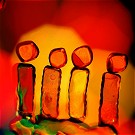
12.08.19 (Kislev 10, 5780) On the Biblical calendar the month of Kislev (כִּסְלֵו) is the ninth of the year (counting from Nisan), and also one of the "darkest," with the days progressively getting shorter and the nights getting longer. Indeed, the Winter Solstice often occurs during the last week of Kislev, and therefore the week of Chanukah (which straddles the months of Kislev and Tevet) often contains the longest night of the year. It is no wonder that, among other things, the holiday of Chanukah represents an appropriate time to kindle the lights of faith - and to remember the Light of the World in the Messiah's advent to earth...
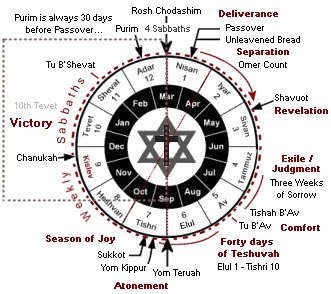 |
The Hebrew word Chanukah (חֲנֻכָּה) means "dedication" and marks an eight day winter celebration that commemorates the victory of faith over the ways of speculative reason, and demonstrates the power of the miracle in the face of mere humanism. Although it is customarily observed as a "Festival of Lights," Chanukah is a "fighting holiday" -- a call to resist the oppression of this world and to exercise faith in the LORD (Rom. 13:12).
This year the eight days of Chanukah will begin on Sunday December 22nd at sundown (1st candle) and will run until Monday, December 30th just before sundown. On the first night of Chanukah one flame is lit, on the second night two, and so on until the eighth night when eight flames are lit. In this way we remember the 'growth' of the miracle.
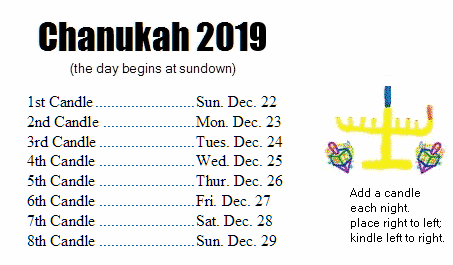
Torah of Promise...
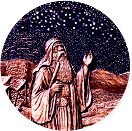
12.08.19 (Kislev 10, 5780) Regarding Abraham it is written: "And he believed the LORD, and he counted it to him as righteousness" (Gen. 15:6). Here note the distinction between the promise of God and the commandments of God. The promise of God focuses on God's heart - his desire and goal, his character and passion - but the commandments of God focus on man's heart, in his desire and will to obey (or not). Receiving God's love is not based on imperative and the language of conditional acceptance, but is based on the invitation and promise of love and grace. The "work of faith" (מַעֲשֶׂה הָאֱמוּנָה) is to believe that God accepts you despite your unacceptability, and that you are esteemed righteous for believing the truth of God's heart. Faith justifies the ungodly because faith accepts the promise, just as Abraham was justified because he trusted in the promise of the seed to come. Therefore, as Rabbi Paul taught, we maintain that a person is justified apart from the law (Rom. 3:28), which is to affirm that eternal life is found exclusively in the grace and promises of God. This is the Torah of "faith, hope, and love," and it is a lifelong discipline to know it in the truth. "Blessed are those who hunger and thirst for God's righteousness, for they shall be satisfied" (Matt. 5:6).
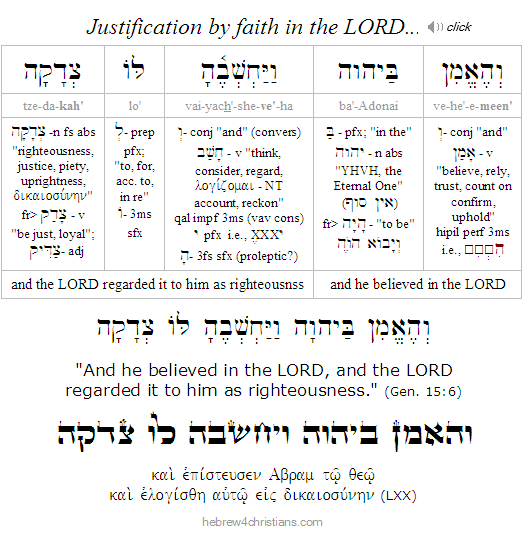 |
Thank you all for remembering the Hebrew for Christians ministry in your prayers, friends... May you be filled with God's faith, hope, and love as you hold fast to God's precious promises.
The Ladder of Truth (סולם האמת)
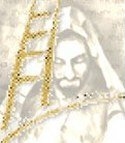
[ The following is related to this week's Torah reading, Parashat Vayetzei... ]
12.06.19 (Kislev 8, 5780) The Hebrew idea of "truth" (i.e., emet: אֱמֶת) is richer than factual description or "correspondence" between language and reality, since it contains moral implications and possibilities: what is true is also right, good, reliable (honest), beautiful, and sacred. The Hebrew word comes from a verb (aman) that means to "confirm" or establish, and the noun form (i.e, emunah: אֱמוּנָה, "faithfulness" or "trustworthiness") expresses the will to live by what is ratified, the "amen" of decision. The Hebrew concept is therefore existential: truth that is not lived is not really truth. Speaking the truth (dibbur emet) and abhoring dishonesty are considered foundational to moral life, as it says: "Speak the truth (דַּבְּרוּ אֱמֶת) to one another; render true and perfect justice in your gates" (Zech. 8:16). Yeshua said, "Amen, amen I say to you...." throughout his ministry to stress the reliability and certainty of God's truth (Matt. 5:18, 26, etc.). Indeed, Yeshua is called "the Amen, the faithful and true witness" (Rev. 3:14). In that sense truth is not a "what" of correspondence but rather a "who," since reality turns on the magnetism of the divine presence (Col. 1:16).
The ancient Greek word translated "truth" is aletheia (ἀλήθεια), a compound formed from an alpha prefix (α-) meaning "not," and lethei (λήθη), meaning "forgetfulness." Greek scholars say the word lethei itself derives from the verb lanthano (λανθάνω), which means "to be hidden," so the general idea is that a-letheia (i.e., truth) is non-concealment, non-hiddenness, or (put positively) revelation or disclosure. Thus the word of Yeshua - His message, logos (λόγος), revelation, and presence - is both "unforgettable" and "irrepressible." Yeshua is the Unforgettable One that is manifest as the express Word of God (דְּבַר הָאֱלהִים). He is the Light of the world (אוֹר הָעוֹלָם) who imparts the "light of life" (John 8:12). Though God's message can be supressed by evil and darkened thinking, the truth is regarded as self-evident and full of intuitive validation (see Rom. 1:18-21).
Note that the LXX (i.e., the ancient Greek translation of the Torah and OT otherwise known as the Septuagint) dates from the time of the philosopher Plato, though of course the Hebrew text dates back to the time of Moses (13th century BC) and even earlier. About 300 BC, "Theophrastus," a student of Aristotle, wrote of the Jews that 'being philosophers by race, they converse with each other about the Divine." Abraham, who dates from about 2,000 BC, was the first avowed monotheist who openly repudiated the polytheism and idolatry of ancient Ugaritic culture (Abraham long predates the rise of Hinduism and the animistic hymns of the Vedas and their priestly commentary found in the Upanishads by a thousand years, just as ancient Judaism predates "Islam" by thousands of years). Similarly, both David and his son Solomon (10th century BC) wrote "existential" works of philosophy, predating the modern world by nearly 3,000 years...
הַדְרִיכֵנִי בַאֲמִתֶּךָ וְלַמְּדֵנִי
כִּי־אַתָּה אֱלהֵי יִשְׁעִי
אוֹתְךָ קִוִּיתִי כָּל־הַיּוֹם
ha·dree·khei'·nee · va·a·mee·te'·kha · ve·la·me·dei'·nee
kee · a·tah · e·lo·hey · yeesh·ee
oh·te·kha · kee·vee'·tee · kohl · hai·yohm

"Lead me in your truth and teach me, for you are the God of my salvation;
for you I hope all the day long" (Psalm 25:5)
Hebrew Study Card

The use of the word "law" in the NT
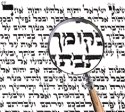
12.06.19 (Kislev 8, 5780) The Torah of Moses (תורת משה) is filled with various imperatives of one kind or another. The term mitzvah (מִצְוָה) is a general term used to refer to any commandment given by God. Mitzvot can be further divided into the subcategories of chukkim u'mishpatim (Deut. 4:5). Chukkim (חֻקִּים) are statutes given without a reason (i.e., fiats or divine decrees), whereas mishpatim (מִשְׁפָּטִים) are laws given for a clearly specified reason (i.e., logical laws). In addition eidot (עֵדוֹת) are testimonials (from the root 'ed, "witness") that commemorate something that we are instructed to observe. Finally, the word "Torah" (תּוֹרָה) is a general concept that implies a wide range of related ideas and concepts that focus on discerning God's will. Note further that the word brit (בְּרִית) refers to a specific agreement or "covenant" made between the Sovereign LORD and his people. All the various commandments, statutes, decrees, and so on are contextualized in terms of the underlying covenant and are expressed as obligations of the covenant.
When the Lord said to Isaac, "I will multiply your offspring as the stars of heaven and will give to your offspring all these lands. And in your offspring all the nations of the earth shall be blessed, because Abraham obeyed my voice and kept my charge, my commandments, my statutes, and my laws" (Gen. 26:4-5), we note immediately that Abraham is described as being one who kept God's Torah even though he lived several centuries before the time of Moses and the revelation of the law code at Sinai, thus indicating that "Torah" is something more (and more foundational) than the idea of a set of various laws, commandments, ordinances, and rules embodied in the Sinai "covenant..." Indeed Paul's argument that the meaning of the new covenant is based on "Torah" is based on this very distinction, that is, between the faith of the patriarchs in God's promise (which is the ultimate meaning of Torah) and the later giving of the law at Mount Sinai... Now that said, it is unfortunate that the distinction between "Torah" and "covenant" is not strongly distinguished in the Greek New Testament, and therefore we must discern the proper meaning of these Greek words by context and by seeing how these words were used to translate the original Hebrew texts in the ancient Greek Torah (i.e., the Septuagint).
Now a source of potential confusion for translators of the Greek New Testament concerns how the Greek word "nomos" (νόμος), which is often simply translated as "law," is to be understood. Does "nomos" always refer to the law code of Moses or does it perhaps more generally refer to the "Old Testament"? Does it go beyond the idea of a commanded imperative to include general principles, such as the "law of sin and death"? Of particular importance is how are we to distinguish between the use of nomos as "law" as opposed to the word "Torah"? Put the other way, is it right to substitute the idea of "Torah" for the word "nomos" (and vice-versa) when we translate and read the New Testament?
The word nomos (νόμος, "law") has a range of semantic meanings in Koine Greek and therefore should not necessarily be regarded as an exact equivalent for the term Torah (תּוֹרָה). As explained elsewhere on this site, the word "Torah" is derived from the verb yarah (יָרָה) meaning to "shoot" (as an arrow), or to indicate direction. It is therefore a general term that refers to instruction or guidance, and should be carefully distinguished from other Hebrew words such as "commandment" (i.e., mitzvah: מִצְוָה), "statutes" (i.e., chukkim: חֻקִּים), "judgments" (i.e., mishpatim: מִשְׁפָּטִים), and so on. To traditional Jewish thinking, the legal aspect of Torah is generally called halakhah (from halakh: הָלַךְ, "to walk") and includes the ideas of case law (תַּקָּנָה), custom (מִנְהָג), and the use of tradition (מָסרֶת) as expressed within the Oral Law. The legal aspects of Torah have roots in the system of judges (שּׁפְטִים) that Moses commissioned (Exod. 18:13-24; Deut. 16:18, 19:17-18, etc.) and in the Bet Din (בֵּית דִן), or religious system of justice that culminated in the supreme court of Israel called the Sanhedrin (סַנְהֶדְרִין). These legal aspects of Torah are usually distinguished from the homiletic or exegetical understanding of the Scriptures (e.g., midrash), which is generally called aggadah (אֲגָּדָה).
In light of these distinctions, it is unfortunate that the ancient Jewish translators of the Scriptures (i.e., the Septuagint) chose to use the word "law" (i.e., nomos) for the word Torah, since this can lead to essential misunderstanding about the meaning of the Torah. For example, they chose to translate the Hebrew name of the last book of Moses (i.e., devarim: דְּבָרִים, "words") as "the Second Law" (i.e., Δευτερονόμιον, fr. deutero + nomos), since many Hellenistic Jews at that time regarded the book as a summary (or retelling) of the various laws of Moses. Indeed, in most cases the Septuagint translates the word "Torah" (תּוֹרָה) as "nomos" (νόμος). In Deuteronomy 4:8, for instance, the word nomos is used to denote to the collection of mishpatim, chukkim, and mitzvot representing all of Israel's covenantal obligations before the LORD. This idea that "Torah" meant "nomos" was carried over to New Testament usage, of course, and the distinction between the idea of "law" and "instruction" was thereby made unclear...
To the classical Greek mind, nomos referred to an idealized standard, often linked with the ontology of Plato's forms (ιδέες) or the laws of nature, though in other senses it referred to social standards and norms of the community (i.e., the legal definition). The Jewish Hellenistic theologian Philo of Alexandria (20 BC - 50 AD), for example, attempted to harmonize Platonic philosophy with the Torah, and therefore combined the idea of moral law with cosmic law and the order of nature (i.e., λόγος). For Philo, the idea of "Torah," then became reduced to the concept of natural law (i.e., nomos as expressed as logos in Greek speculations).
In the New Testament, nomos is used in varied ways. James used it to refer to the moral will of God (James 2:9-11, 4:11). The Apostle John quotes Yeshua using it to refer to the Tanakh in general (John 10:34; 15:25), though it is most often used to refer to the writings of Moses in the Gospels (Matt. 11:13, Luke 16:16; 24:44; John 12:34; Acts 13:15; 28:23). Certainly the moral and ritual aspects of the writings of Moses are represented using the word (Matt. 7:12; 22:40; Luke 2:22,39;8:5; John 1:17; 7:19,23, etc.).
In Paul's letters, the use of the word nomos is likewise varied. In most cases it follows the Septuagint's usage by regarding it as the collective set of commandments given by Moses (Rom. 2:12-29; 3:19; 5:20; 7:7; Gal. 3:21; 1 Cor. 9:8; 14:34), whereas in other places it refers to the Tanakh in general (Rom. 3:19, 1 Cor. 14:21). Still in other cases, nomos appears to be used by Paul to refer to "principles," such as his description of the "law of sin and death" as opposed to the "law of the Spirit of life" (Rom. 7:23, 8:2). For Paul, the overarching principle of the law is the ethic of love (Gal 5:14; Rom. 13:8-10). In each case of Paul's use of the word nomos, however, we must carefully examine the flow of Paul's reasoning as well as the historical context of a given letter.
Some have claimed that Paul sometimes used "nomos" to refer to a legalistic perversion of the law imposed by the oral tradition of the sages, and therefore the statement that "no one is justified by the law" (ἐν νόμῳ οὐδεὶς δικαιοῦται) should be understood in this light (Gal. 3:11). However, in Galatians 3:21, Paul clearly used nomos (νόμος) to refer to the Law of Moses (תּוֹרַת משֶׁה) since he referred to the law that "had been given" (i.e., mattan Torah) 430 years after the time of Abraham (Gal. 3:17). When Paul rhetorically asked if this law ("which had been given but was not able to impart life") was contrary to the original promise given to Abraham, it is again clear he is again referred to the Sinai revelation. "Legalism" wasn't given at Sinai, but the direct revelation of the will of God was. The Messiah came to redeem us from the curses contained in the Book of the Law (i.e., the sefer ha-brit of Moses detailing the various commandments), and this line of argument only makes sense if we understand nomos here to refer to the written law code of Moses.
Often it is helpful to study how a Hebrew word was translated into ancient Greek (i.e., the Septuagint, or LXX) to get some idea of how the New Testament writers might have used the word. In the case of the word "Torah," however, this methodology breaks down, since the ancient Greek translators used a general word that was not an adequate equivalent, and this lack of precision makes it difficult to determine the precise sense of the word as it is used in the New Testament. For example, when Paul writes that "we do not nullify the law (nomos), but rather affirm it" (Rom. 3:31), and later writes that we are "dead to the law (nomos) by our faith in Yeshua" (Gal. 2:19; Rom. 7:4), and furthermore identifies a "law (nomos) of sin that works in our bodies" (Rom. 7:23; 8:2), then it's clear that we need to make some distinctions in our understanding of his use of the word "law" lest we become hopelessly befuddled. The only viable method here is to carefully consider the overall context of the passage for additional clues as to the author's meaning, and then compare Scripture to Scripture to attempt to discover the usage for the word in this particular case. It is admittedly a bit tedious sorting this all out, but God will help us understand if we sincerely ask Him...
Note: For more information see the article, "Nomos and Torah."
Paul and the Meaning of the Gospel...
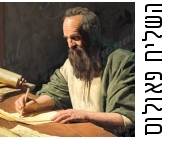
12.05.19 (Kislev 7, 5780) One of the earliest challenges to the integrity of the gospel message came from certain "false brethren" (ψευδαδέλφοι) from Jerusalem who went about teaching that Gentile followers of Yeshua must "follow the law" of Moses in order to be saved (Acts 11:1-3, Acts 15:1; Gal. 2:4). Apparently Paul had to deal with this challenge repeatedly during his years of ministry, but when the apostle Peter himself appeared to agree with this doctrine by disassociating with Gentile believers in Atioch, Paul publicly rebuked him for turning away from the essential truth of the gospel (Gal. 2:11-14). Paul's correction of Peter provided him with the opportunity to clarify the meaning of the gospel, however, and to settle the burning question of whether believers in Yeshua were in fact required to keep the law of Moses. Paul's answer to this question constitutes the substance of the Book of Galatians.
By way of context, note that Paul was deeply troubled by Peter's pretense to be a follower of the law of Moses when some of these false brethren visited Antioch: "For before the time these certain men came from James, Peter was eating with the Gentiles; but once they had arrived, he stopped doing this and separated himself because he was afraid of those who were pro-circumcision" (Gal. 2:12). Peter's anxiety to be "approved" by the legalists gravely concerned Paul, especially because Peter was a leader of the early church, and many people (including his companion Barnabas) were misled by his bad example and likewise pretended to keep the law of Moses (Gal. 2:13). In response to this charade, Paul confronted Peter in front of them all and said, "If you, although you are a Jew, live like a Gentile and not like a Jew, how can you try to force the Gentiles to live like Jews?" (Gal. 2:14). Paul then reminded Peter that even though he was Jewish and not born a Gentile, no one is justified by doing "works of the law" (ἐξ ἔργων νόμου) but solely by trusting in Yeshua for life, for "by the works of the law no one will be justified" (Gal. 2:15-16; Psalm 143:2).
Paul then rhetorically asked Peter that if believers seek to be justified by Yeshua alone - and not by works of the law - would that imply that Yeshua leads them to transgress the law (Gal. 2:17)? God forbid, since Yeshua did not come to destroy the law but to fulfill it, and it is through faith we establish the truth and meaning of the law (Matt. 5:17; Rom. 3:31). After all, only those who understand that the law is to be obeyed, and who futher understand that disobedience results in the curse of God, are those who "establish" the law, certainly not those pretenders who claim that certain ritual acts or ethnic identity will suffice for justification (Lev. 26:14-46; Deut. 15-68). Likewise, only those who understand that "the life is in the blood" and that the law therefore requires substitutionary sacrificial blood for atonement are those that "establish" the law, and certainly not those who pretend that ritual prayers and good deeds will suffice (Lev. 17:11). So no, following Yeshua does not lead to sin, but to the contrary, because of the deliverance from the curse of the law secured by the Messiah, the real sin is to discount the meaning of the cross by returning to the legal relationship with God as ratified in the Sinai covenant (Gal. 2:18; Exod. 19:8, 24:3,7; Deut. 27:26).
In effect Paul presented an exclusive dilemma: either the law (understood in terms of the Sinai covenant) is binding and it is forbidden to give it up, or else the new covenant is binding and it is forbidden to return to the older covenant. In this connection note that the issue is not about "Torah" per se, since Torah (תּוֹרָה) simply means "teaching" or "direction" and its significance is contextualized by the covenant of which it is a part. In other words, there is a "Torah" based on the covenant made Sinai, and there is a "Torah" based on the new covenant made at Zion. Regarding the Torah of the new covenant, however, the prophets had foretold that it would be supplanted by a new and better covenant: "Behold, the days are coming, declares the LORD, when I will make a new covenant (בְּרִית חֲדָשָׁה) with the house of Israel and the house of Judah, not like the covenant that I made with the fathers on the day when I took them by the hand to bring them out of the land of Egypt (i.e., the Sinai covenant) -- my covenant that they broke, though I was their husband, declares the LORD. But this is the covenant that I will make with the house of Israel after those days, declares the LORD: I will put my Torah within them, and I will write it on their hearts. And I will be their God, and they shall be my people" (Jer. 31:31-33). This new covenant was based on the promise of God and his righteousness (Psalm 40:6-8; Heb. 10:5-9). "For if that first covenant had been faultless, there would have been no occasion to look for a second... And in speaking of a new covenant, he makes the first one obsolete (ἀφανισμός). Indeed Yeshua has obtained a ministry that is as much more excellent than the old as the covenant he mediates is better, since it is enacted on better promises" (Heb. 8:6-13). The former covenant foreshadowed the substance of things to come, primarily the advent of Messiah as the great Lamb of God who would secure for us an eternal and everlasting atonement (Heb. 10:1-10; John 1:29, Rev. 5:12, etc.). The Torah of Moses was not given in vain, of course, as Yeshua himself said that it bore witness of his mission to redeem Israel (Luke 24:27; 24:44; John 5:46, 8:56, etc.). Nevertheless, regarding the covenant at Sinai, "He does away with the first to establish the second" (Heb. 10:9-10).
Paul then began to unfold the essential meaning of the gospel to the believers at Galatia. First he explained that the law served only to convict him of his sin: "For I through the law died to the law (᾽εγὼ γὰρ διὰ νόμου νόμῳ ἀπέθανον), so that I might live to God" (Gal. 2:19). The phrase, "I through the law" refers to the law's testimony of truth, and the phrase I "died to the law" refers to the law's verdict before the bar of divine justice (James 2:10). The problem is not with the law itself, since it is holy and good, but with the human will and its inherent inability to keep the law of God (Jer. 17:9; Eccl. 9:3; Mark 7:21; Rom. 3:23). In another place Paul said, "I am not suggesting that the law of God is sinful, of course, though the law showed me my sin. I would never have known that coveting is wrong if the law had not said, "You must not covet." But the power of sin, aroused by the commandment, came to life, working within me sinful desire... When the commandment came, sin came alive and I died. I discovered that the law's commandments, which were supposed to bring life, brought spiritual death instead. Sin took advantage of those commandments and deceived me; it used the commandments to kill me... So the trouble is not with the law, for it is spiritual and good; the trouble is with me, for I am all too human, a slave to sin" (Rom. 7:7-14).
Now the power of the gospel is that "God has done what the law, weakened by the flesh, could not do. By sending his own Son in the likeness of sinful flesh and for sin, he condemned sin in the flesh, so that the righteousness of the law might be fulfilled in us, who walk not according to the flesh but according to the Spirit" (Rom. 8:3). What the law was powerless to do (τὸ ἀδύνατον τοῦ νόμου) God did by means of Yeshua: "For the one who knew no sin on our behalf he made sin for us (ὑπὲρ ἡμῶν ἁμαρτίαν ἐποίησεν) that we would become the righteousness of God in him (2 Cor. 5:21). Paul later later would ask, "Why then the law?" and answered that it was "added to reveal transgressions until the promised Messiah would come (Gal. 3:19). The purpose of the law, in other words, was first of all to reveal and to denounce our sinful condition, serving as a "school master" to teach us of our need for Messiah (Gal. 3:24). The law taught Paul that he needed to be rescued from himself, that is, from the desires of the lower nature (yetzer ha'ra) inherited from Adam, and therefore that he needed a radically new nature so that he could "live to God." Recall that when the Ten Commandments were first uttered at Sinai, the people drew back in dread because the truth of their inner condition was exposed (Deut. 5:5-6). Paradoxically, the first great lesson of the law is that we are lawbreakers who are in lethal need for deliverance (1 Tim. 1:8-10). For this the miracle of regeneration is needed, as Yeshua clearly taught us (John 3:3-7). The law is good, Paul affirmed, if it is used "lawfully" (1 Tim. 1:8), that is, to reveal our need for mercy and to anticipate the coming Redeemer and his sacrifice as foreshadowed by the sacrificial rites enshrined in older covenant (Tabernacle). Nevertheless, Messiah our Savior is the "end of the law for righteousness" (τέλος γὰρ νόμου χριστὸς εἰς δικαιοσύνην) to all who believe (Rom. 10:4).
"For I through the law died to the law so that I might live to God" (Gal. 2:19). That is the essential spiritual point, after all - to be forgiven so I might genuinely live unto God - but the means to that end was procured through the cross of Messiah, as Paul then said: "With Messiah I have been crucified (χριστῷ συνεσταύρωμαι); it is no longer I who live, but Messiah who lives in me, and the life I now live in the flesh I live by faith in the Son of God, who loved me and gave himself for me" (Gal. 2:20). Being "crucified with Messiah" means being identified with Yeshua as your personal sin bearer - so identifying with him that the exchange of his life is accounted as "for you" - the semichah of the spirit - whereby the fellowship of his sufferings becomes sufficient for the forgiveness of your sins, and the power of his resurrection becomes sufficient for your eternal life. "It is no longer I who live but Messiah lives in me," that is, the "I" that was under the curse of the law has died in my connection with Messiah and now a new life with God has come into being... The ego or "I" is known in relationship, and since God's relationship with us in Yeshua is different than his relationship to us under the terms of the Sinai covenant, the "I" (or self) has been transformed by God's grace. This is the spirit of "adoption" (πνεῦμα υἱοθεσίας, lit. "the spirit of sonship") mentioned elsewhere in Paul's writings, whereby we cry out "Abba, Father" to the LORD (see Rom. 8:15; Gal. 4:5). The death of Messiah for our sins opens a radically new connection with God, a new identity, a new mode of being. We can come boldly before the throne of grace, into the "holy of holies" made without hands (Heb. 4:16; Heb. 9:11). We live by faith in Yeshua, the one who "loved me and gave himself for me," holding to the promise and joy of eternal life...
Paul sternly warned that any compromise on this point is not an option for followers of Yeshua. He said: "I do not nullify the grace of God, for if righteousness were through the law, then Messiah died for no purpose" (Gal. 2:21). Yeshua is "the end of the law for righteousness to everyone who believes" (Rom. 10:4). If we could keep the law to be made right with God, the cross would be unnecessary and Yeshua would have died in vain. The scandal of the gospel message is that we cannot save ourselves, that our best efforts are powerless to give us life, and therefore we need salvation from ourselves. The righteousness of God (not man) is what saves us, and such is received as a gift, not the result of merits or self-vindication. Indeed any attempt to add to the redemption of God by means of human effort not only disparages the significance of the cross but constitutes a form of spiritual adultery: "Do you not know, brothers -- for I am speaking to those who know the law -- that the law is binding on a person only as long as he lives? For a married woman is bound by law to her husband while he lives, but if her husband dies she is released from the law of marriage. Accordingly, she will be called an adulteress if she lives with another man while her husband is alive. But if her husband dies, she is free from that law, and if she marries another man she is not an adulteress. Likewise, my brothers, you also were made dead to the law through the body of Messiah (ἐθανατώθητε τῷ νόμῳ διὰ τοῦ σώματος τοῦ χριστοῦ), so that you may belong to another, to Him who has been raised from the dead, in order that we may bear fruit for God" (Rom. 7:1-4). Saying you have "died to the law" means that you cannot save yourself, and therefore deliverance must come from a source other than the human will, that is, by means of righteousness that comes from God "apart from the law, although the Law and the Prophets bear witness to it, namely the righteousness of God through faith in Yeshua the Messiah for all who believe" (Rom. 3:21-22). This righteousness of God (δικαιοσύνη θεοῦ) comes by trusting in God's promise, for the realm of divine promise is certain since it is God Himself who is the agency that secures its reality (Isa. 59:16; Psalm 98:1; 2 Cor. 5:21). Paul anticipates the objection that someone might think that the law is contrary to the promises of God by answering, "Certainly not! For if a law had been given that could give life, then righteousness would indeed be by the law" (Gal. 3:21). In other words, there was no other way to redeem fallen humanity apart from the cross. "Let this cup pass from me, if it be possible," Yeshua prayed at the Garden of Gethsemane, yet it was not possible for incurable sinners to be made right with God apart from his sacrificial death offered up in exchange for them. As C.S. Lewis said, "It cost God nothing, so far as we know, to create nice things: but to convert rebellious wills cost Him crucifixion" (Mere Christianity).
This is the "simple" message of the gospel that must be remembered over and over again, since the perpetual temptation is to think we must "add" something to the finished work of Yeshua to effect a right standing before the LORD. We must be careful not to confuse cause and effect in the realm of the spiritual. After the original transgression of Adam and Eve, death became the root problem of the human condition, with indwelling sin as its fruit (i.e., the "works of the flesh"). It is this inherited "spiritual death" that causes sin. To focus on outward behavior without first of all dealing with the underlying problem of death is therefore a spiritual misstep. It is to clean the outside of the cup or to wash the outside of a tomb in a vain attempt to disguise the truth about our unclean and dead condition. The good news is not that God wants to make bad people good, but rather wants to make dead people alive... The cure for spiritual death is to be reborn and to partake of the resurrected life of Yeshua.
It should be clear that the gospel is not a sort of "moral reformation" or "self-improvement" program designed to make us acceptable to God. Yeshua did not die on the cross so that we would become entangled in the old ways of being; much less should He be regarded as the "second coming of Moses." No! Yeshua is Lord and Master over all, and we find new life in His acts of deliverance done on our behalf and for our benefit. The temptation is always to go back to the law of sin and death (i.e., the principle of self-justification), but as Martin Luther once said: "The sin underneath all our sins is the lie of the serpent that we cannot trust the love and grace of Christ and that we must take matters into our own hands."
Particularly when you hear an immature and unripe saint trumpet that he knows very well that we must be saved by the grace of God, without our own works, and then pretend that this is a snap for him, well, then have no doubt that he has no idea of what he is talking about and probably will never find out. For that is not an art that can be completely learned or of which anyone could boast that he is a master. And all those who do understand and practice it do not boast that they can do everything. On the contrary, they sense it like a wonderful taste or odor they greatly desire and pursue; and they are amazed that they cannot grasp it or comprehend it as they would like. They hunger, thirst, and yearn for it more and more; and they never tire of hearing about or dealing with it, just as St. Paul himself confessed that he had not yet attained (Phil. 3:12). And in Matt, 5:6 Christ calls those blessed who hunger and thirst after righteousness." (Luther's Works, Vol. 14).
The righteousness of God (δικαιοσύνη θεοῦ) is attained by trusting in God's promises, as it is written "And he [Abraham] believed in the LORD, and he [the LORD] accounted it to him as righteousness" (Gen. 15:6; Rom. 4:4-8; Gal. 3:6; Hab. 2:4). God's promises call for faith, whereas God's commandments call for action. Salvation is based on God's promise rather than our action, since only God can secure our righteousness. "Through the law" we therefore "die to the law," meaning that we understand how desperate our situation is. Abraham was justified because he believed the promise, and not because of something he could do to commend himself before God. For what does the Scripture say? "Abraham believed God, and it was counted to him as righteousness. Now to the one who works, his wages are not counted as a gift but as his due; and to the one who does not work but believes in him who justifies the ungodly, his faith is counted as righteousness, just as David also speaks of the blessing of the one to whom God counts righteousness apart from works: "Blessed are those whose lawless deeds are forgiven, and whose sins are covered; blessed is the man against whom the Lord will not count his sin" (Rom. 4:3-8). Abraham "did not weaken in faith when he considered his own body, which was as good as dead (since he was about a hundred years old), or when he considered the barrenness of Sarah's womb. No unbelief made him waver concerning the promise of God, but he grew strong in his faith as he gave glory to God, fully convinced that God was able to do what he had promised. That is why his faith was "counted to him as righteousness" (Rom. 4:19-22). Now it is evident that no one is justified before God by the law, for "The righteous one shall live by faith" (Gal. 3:11).
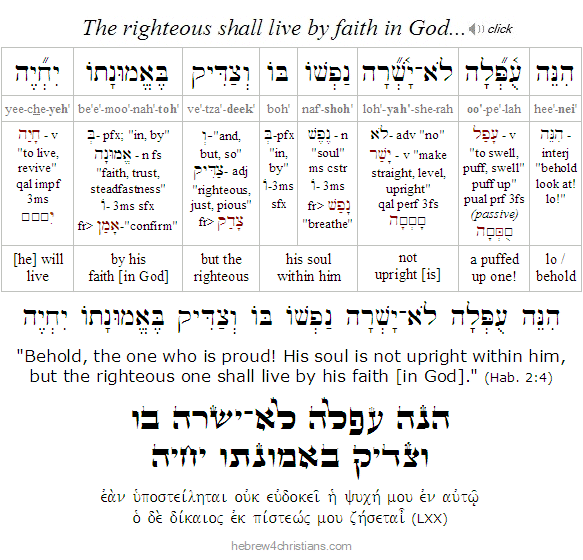 |
Ironically, those who attempt to establish their own righteousness by attempting to adhere to the law are regarded as slaves, the "children of Hagar," whereas those who trust in the promise of God are regarded as free, the "children of Sarah," inhabitants of Jerusalem that is above (see Gal. 4:21-5:1). The "works of the law," here understood to mean actions performed with the intent of commending the self before heaven, do not effect real righteousness, since Yeshua is the "end of the law" – the goal, purpose, and inner meaning – of eternal righteousness. Therefore Yeshua is Adonai Tzidkenu (יְהוָה צִדְקֵנוּ) – the LORD our Righteousness!
Note: The obedience of faith (ὑπακοὴν πίστεως), which Yeshua called the work of God (John 6:28-29), is the Torah "written upon the heart" so that we fulfill the heart of the law by means of the heart of God given to us... I am not advocating "anti-nomialism," or moral anarchy, of course: those who are truly people of faith walk in the law of God's love, which is the fulfillment or goal of the law (Rom. 13:10). People who think that we are set "free" from the law do not fully understand either what the law means nor what freedom means. The "work" of faith is real work, though it is the "work" of believing or trusting the promise of God, surrendering the heart to God's love, "accepting that you are accepted despite your unacceptability," and so on. The "work of faith" (מַעֲשֶׂה הָאֱמוּנָה) is the practice of receiving the blessing that you are a child of God by means of our Savior Yeshua's avodah for us... Yes, it's a balance to understand how the law and faith are related, though the power to obey the Shema (i.e., to love God in the truth) comes by receiving the promise of God's heart, not by adherence to a lawcode... The Torah is eternally true; the covenant is truly new.
Jacob's Vision of Messiah...
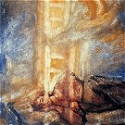
[ The following is related to this week's Torah reading, Parashat Vayetzei... ]
12.05.19 (Kislev 7, 5780) The revelation at Sinai and Jacob's vision of the ladder share something in common. Just as Yeshua was the "Voice of the Living God (קוֹל אֱלהִים חַיִּים) speaking (davar) from the midst of the fire" at Sinai (Deut. 5:26), so He was the Ascended LORD standing above the ladder speaking the word of promise (Gen. 28:12-15). In this connection we note that the words for "ladder," (i.e., sullam: סֻלָּם), "voice" (i.e., kol: קל), and "Sinai" (סִינָי) have the same numerical value, which suggests a connection between the great visions. Yeshua is the Ladder to God, the means by which the Living Torah both descends and ascends for the sake of our deliverance (John 1:51). The "ladder of Sinai" is not meant for us to ascend but rather is for the LORD our Savior to descend and ascend on our behalf. This is always the way of the Righteousness of God rather than the religious aspiratoins of man... Yeshua is the way, the truth, and the life (הדֶּרֶךְ וְהָאֱמֶת וְהַחַיִּים): no one can draw near to the Heavenly Father apart from Him (John 14:6).
Note: For more on this subject, see "Jacob's Dream of Messiah."
Finding Inner Peace...

12.05.19 (Kislev 7, 5780) The ultimate question is whether you feel "safe" with the truth of who you really are... When you are all alone, in a moment of still silence, when the entire world is asleep and suspended, what is the message of your heart's cry? Are you okay? Do you trust who you are or what is happening to you, or do you experience anxiety, a sense of lostness, inner pain? Comfort is found in God's grace. His promise is given to the sick at heart, to those who understand their need for a physician (Matt. 9:12). Since there is nothing about you to commend before God, you are made free to abandon yourself to the divine love. This is the "Name of the LORD," after all, and your heart's cry for love is a "prayer" uttered in that Name. Your heavenly Father sees in secret (Matt. 6:6). Consider the birds of the air; they are unreflective, alive in the atmosphere of God's care. What a great blessing to let go of your fear; what sweet relief! Surrender to the truth of your helplessness; rejoice that you are "poor in spirit," and discover that yours is the Kingdom of Heaven (Matt. 5:3). So don't give up your faith, my friend. God promises to be with you to the end, leading you to the place where your heart will forever be satisfied in his love.
Keep on Trusting...
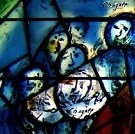
12.04.19 (Kislev 6, 5780) When Yeshua said, "Let not your heart be troubled... I go to prepare a place for you" (John 14:1-2), he was assuring us that he had matters well under his control, and therefore we need not worry, since his passion rendered our salvation completely secure... The future is a "prepared place" for you, even if life in this world is often marked by testing and various refining fires. God has not promised to rescue us according to our own schedule, however, so if it appears that your prayers are not immediately answered, keep waiting in faith: "Rejoice, even if you have been grieved by various trials, because the tested genuineness of your faith -- more precious than gold that perishes though it is tested by fire -- may result in praise and glory and honor at the revelation of Yeshua the Messiah" (1 Pet. 1:6-7). God works "all things together for good," and since the exercise of faith is your good, he engineers all things to build your faith. "For my thoughts are not your thoughts, neither are your ways my ways, says the LORD" (Isa. 55:8).
Recall the words: "Let him who walks in darkness and has no light trust in the name of the LORD and rely on his God" (Isa. 50:10). Trusting in God (i.e., bittachon - בִּטָּחוֹן) doesn't mean that we are obligated to say this is "the best of all possible worlds," though it does mean we believe that eventually God will wipe away every tear and make all things right... Bittachon is a word for this world, which says, "Though he slay me, I will trust in him..." Those who call upon the LORD can trust not only in concealed good behind ambiguous appearances ("all things work together for good") but also in a future, real, substantive good that will one day be clearly manifest for us all... We fight the "good fight" of faith, which is a worthy struggle that eventually is realized for blessing. Meanwhile, may the LORD our God keep us from such depth of sorrow that leads to sickness, darkness and despair.
בִּטְחוּ בַיהוָה עֲדֵי־עַד
כִּי בְּיָהּ יְהוָה צוּר עוֹלָמִים
beet·choo · va·Adonai · ah·dey–ad
kee · be·Yah · Adonai · tzoor · oh·la·meem

"Trust in the LORD forever,
for in Yah the LORD is everlasting strength."
(Isa 26:4)
Hebrew Study Card

The last promise of Scripture is "I come quickly" (אֲנִי בָא מַהֵר) and the last prayer is, "Amen, come, Lord Yeshua" (אָמֵן בּאָה־נָּא הָאָדוֹן יֵשׁוּעַ) [Rev. 22:20]. Meanwhile we "inwardly groan" for the fulfillment of our redemption, since presently we are suspended between worlds, walking in hope yet subject to the vanities that befall all flesh... And though God may tarry, He declares, "I am the LORD; in its time I will hasten it" (Isa. 60:22). So we are made captives to hope, clinging to the promise of our ultimate healing and redemption. Our hearts therefore affirm that God is faithful "to keep you from falling, and to present you faultless before the presence of his glory with exceeding joy" (Jude 1:24). Amen. God will help us before He will help us, and may He come speedily, and in our day....
Postmodern Despair...

12.03.19 (Kislev 5, 5780) It is written in our Scriptures: "The fool says in his heart, 'There is no God' (אָמַר נָבָל בְּלִבּוֹ אֵין אֱלהִים). Indeed Psalm 14 teaches us that the willful denial of reality is an affront to heaven, contempt shown for the gift of life, and sacrilege of all that is worthy. It is sheer folly to regard life apart from the fear of the LORD, for that is reishit chokhmah - the beginning of wisdom (Psalm 111:10). The existence of God is the First Principle of all sound reasoning regarding reality. The so-called "postmodern world" is notorious for failing to explain anything of substantive meaning. Everything is left unexplained; no narrative is permitted (except the narrative that there is no narrative, of course); no logical connections to a "real world" are sound; there is no "story" to our lives, and therefore postmodernism fatuously misses the essential point of everything. King David asked, "Who shall abide before the Presence of the LORD?" and the Spirit replied: "the one who walks blamelessly and does what is right and speaks truth in his heart" (Psalm 15:2). It is the one who is honest – "the one who speaks truth within his heart" (דבֵר אֱמֶת בִּלְבָבוֹ) that dwells in the "tent of the LORD," for God is called the God of Truth (אֵל אֱמֶת), the Faithful God (אֵל אֱמוּנָה). In heaven there is only the language of truth, and truth is the language of heaven. The "pure in heart" – that is, those who accept the truth of their inner condition, who acknowledge their lost condition, mourning over their lives, and who humbly find themselves starving for God's deliverance – these are the ones who shall behold God (Matt. 5:2-6). Blaise Pascal once wrote: "I can feel nothing but compassion for those who sincerely lament their doubt, who regard it as the ultimate misfortune, and who, sparing no effort to escape from it, make their search their principal and most serious business. But as for those who spend their lives without a thought for this final end, I view differently. This negligence in the matter where they themselves, their eternity, their all are at stake, fills me more with irritation than pity: yea, it astounds and appalls me..." (Pensees).
Beware the Seeming Way...

12.03.19 (Kislev 5, 5780) "There is a way that seems right to a person, but its end is the way to death" (Prov. 14:12). Our postmodern culture celebrates "relativism," or the spurious notion that there is no such thing as objectively knowable truth... Apart from the self-contradiction that arises by saying that it is (objectively) true that there is no objective truth, the unthinking acceptance of this sophistical perspective leads to mindlessness, the lack of creativity, moral stupidity, apathy, and delusional thinking. Popular culture inculcates and preaches there are no moral absolutes and therefore terms like "right" and "wrong," "just" and "unjust," "true" and "untrue" should (ahem) be translated as expressions of subjective preference without any reference to moral categories or structures that extend beyond the individual (or a particular "group"). According to this backwards view, Mother Theresa was no better a person than was Adolf Hitler; and therefore genocide, slavery, murder, and so on, are "lifestyle choices" that express individual or collective preference, but nothing else. Indeed such a viewpoint claims there is no way to infer an "ought" from an "is" (no "prescription" from "description") and therefore assigning moral praise, blame or responsibility is ultimately meaningless.
Understand, then, that the uncritical acceptance of epistemological and moral relativism stifles the life of the mind by implying that there is no difference between truth and error, between good and evil, between beauty and ugliness, between logical and illogical thinking, and so on. It is therefore a form of insanity, or of a deranged thinking. However, since language and meaning are necessarily grounded in logic, naive relativism is ultimately unintelligible and incommunicable, since logic assumes that meaning and rules of inference serve as the conditions of any expression of thought. I share this to point out that the thinking of our culture is not based on careful reflection or reasoning but is essentially a matter of brute force, and therefore it is rightly to be regarded as irrationalism, an implied appeal to violence, and depraved thinking. Of course this sort of relativism is a very useful indoctrination technique regularly used by political agitators, the mass media, by government propagandists, con artists, and by all those who rely on dimwitted people to manipulate and control. Therefore the thoughtful person of truth, that is, the person of genuine moral conviction derived from intuitive axioms of reasoning, will always be regarded as an enemy to those who live and practice the lie.
יֵשׁ דֶּרֶךְ יָשָׁר לִפְנֵי־אִיש
וְאַחֲרִיתָהּ דַּרְכֵי־מָוֶת
yesh · de'·rekh · yah·shar · leef·ney-eesh
ve·a·cha·ree·tah · dar·khei - ma'·vet

"There is a way that seems right to a person,
but its end is the way to death."
(Prov. 14:12)
Hebrew Study Card

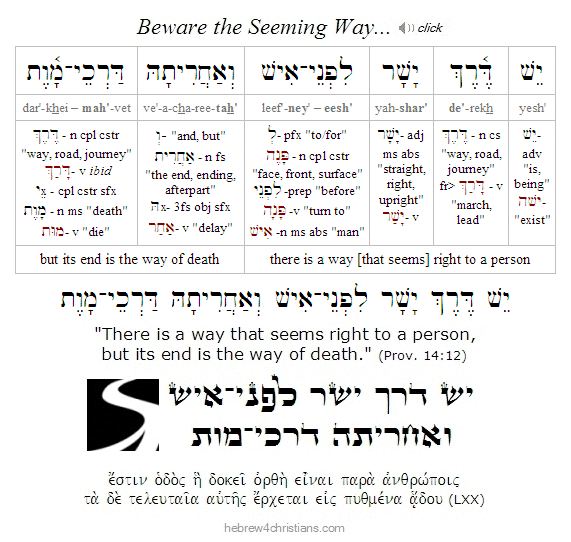
Martin Buber once said, "What is accomplished through lies can assume the mask of truth; what is accomplished through violence can go in the guise of justice, and for a while the hoax may be successful. But soon people realize that lies are lies at bottom, that violence is violence - and that both lies and violence will suffer the destiny history has in store for all that is false." As Yeshua himself said, "For this purpose I was born and for this purpose I have come into the world -- to bear witness to the truth. Everyone who is of the truth listens to my voice" (John 18:37). "Blessed are those who wash their robes, so that they may have the right to the Tree of Life and that they may enter the city by the gates. Outside are all those who love and practice the lie..." (Rev. 22:14-15).
The Reward of Faith...

12.02.19 (Kislev 4, 5780) "Without faith it is impossible to please God, for whoever would draw near to God must believe that he exists and that he rewards those who seek him" (Heb. 11:6). Note that the word translated "impossible" in this verse (ἀδύνατος) means powerless, incapable, and so on, which implies that faith is the key that opens the door to God's presence. It is not possible to relate to God, after all, if you do not trust in his Reality and concern for your life. Indeed confidence in God's promises is the foundation of everything; it is the source of your inner life connection and the answer to your prayer for healing. As our LORD Yeshua said: "Take heart; your faith has made you whole" (Matt. 9:22).
God rewards those who earnestly seek him. This hearkens to the promise made to our father Abraham: אל־תִּירָא אַבְרָם - "Fear not, Abram," אָנכִי מָגֵן לָךְ – "I am your Shield," שְׂכָרְךָ הַרְבֵּה מְאד - your reward shall be very great" (Gen. 15:1). "For the LORD God is a sun and shield; the LORD bestows favor and honor. No good thing does he withhold from those who walk in trust" (Psalm 84:11). God imparts favor to those who honestly seek Him, as it is written: "and you will seek me, and find me, when you shall search for me bekhol levavkha - with all your heart" (Jer. 29:13). "With all your heart" -- with both your "good" heart and with your "evil" heart -- that is, with all that is within you shall you seek... You don't wait until you are "cleaned up" to reach out to God, but come "just as you are" -- in the midst of the messiness and sin of your life. That is the teshuvah (answer) to God's haunting question regarding your life; you find "all your heart" as you seek God's presence in all your ways (Prov. 3:6). Faith is its own reward since it imparts the blessing of Reality. The Greek word used to translate "those who seek" is a present active participle (ἐκζητοῦσιν) that refers to those who continue to search for God's Presence and truth - even in the midst of the struggle of life. Like the prophet Enoch, this is the way to "walk with God." So do not lose heart or throw away your confidence, dear friend, because it has great reward (Heb. 10:35).
וּבִקַּשְׁתֶּם אתִי וּמְצָאתֶם
כִּי תִדְרְשֻׁנִי בְּכָל־לְבַבְכֶם
oo'veek·kash·tem · oh·tee · oo'me·tza·tem
kee · teed·re·shoo'·nee · be'khol · le'vav·khem

"You will seek me and find me
when you search for me with all your heart."
(Jer. 29:13)
Hebrew Study Card

Seeing the Unseen...
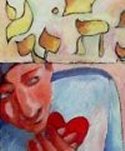
12.02.19 (Kislev 4, 5780) Yeshua told us: "Blessed are those who have not seen and yet have believed" (John 20:29). Despite the struggle of this life - our sorrows, pains, and even death itself - we believe in God's love and promise for us, even if we do not presently see the fulfillment of our hope, just as Abraham believed the promise that he would be the father of an innumerable multitude long before he saw any sign of its fulfillment. Abraham "believed the impossible" and "hoped against hope" (παρ᾽ ἐλπίδα ἐπ᾽ ἐλπίδι), meaning that hope kindled within him even though there was nothing to see in the realm of the natural -- he believed in an unseen good; he trusted in the One who gives life to the dead and who "calls into existence the things that do not exist" (Rom. 4:17). The Scripture comments: "He did not weaken in faith when he considered his own body, which was as good as dead (since he was about a hundred years old), or when he considered the deadness of Sarah's womb. He did not stumble over the promise of God through unbelief but was strong in faith, and gave glory to God, fully persuaded that God was able to do what he had promised, and that is why his faith was counted to him as righteousness" (Rom. 4:19-22). Likewise we believe in an unseen good, an unimaginably wonderful destiny for our lives, as it says, "Things no eye has seen, nor ear heard, nor mind imagined, are the things God has prepared for those who love him" (1 Cor. 2:9). Faith does not use natural reason or the evidence of the senses to see the unseen, but it "believes to see" through "eyes of the heart" to know the hope of God's calling and to attain the blessing (Eph. 1:18). Faith in God's love comes from a different source and has a different means of apprehension than human wisdom, so that no matter how things appear in this fallen world, God may be known and trusted to work all things for our ultimate good. "Blessed are those who have not seen and yet have believed." Amen.
Parashat Vayetzei - וַיֵּצֵא
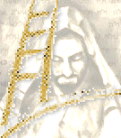
12.01.19 (Kislev 3, 5780) Our Torah portion for this week (Vayetzei) includes Jacob's dream of a ladder (סֻלָּם) extending from earth to heaven, with the angels of God ascending and descending, and the LORD Himself standing above assuring Jacob of his safe return to the land he had fled. Jacob awoke and responded to the dream with awe: "Surely the LORD is in this place (בַּמָּקוֹם הַזֶּה), and I did not know it." And he was afraid and said, "How awesome is this place! This is none other than the house of God, and this is the gate of heaven." And he called the name of that place Bethel (בֵּית־אֵל) i.e., "the house of God."
The sages interpret ha-makom (הַמָּקוֹם), literally "the place" that Jacob saw, as Mount Moriah, the exact location where Jacob's father Isaac was bound as the "sacrificed seed" and which later became the site of the Holy Temple. Indeed the word makom comes from a verb (קוּם) meaning "to arise," suggesting resurrection and ascension. In later Rabbinical thought Ha-Makom became synonymous with the Name or Presence of God Himself ("God is the place of the world, but the world is not God's only place").
Yeshua referred to Jacob's dream when he said, "Truly, truly, I say to you, you will see heaven opened, and the angels of God ascending and descending on the Son of Man" (John 1:51). Just as Jacob saw the ladder ascending to heaven with the angels of God ascending and descending upon it, so Yeshua told Nathanael that He was the Ladder to God, the sha'ar ha-shamayim (שַׁעַר הַשָּׁמָיִם) - the way into heaven (John 14:6). Indeed, Yeshua is the true Place or "house of God" and its Chief Cornerstone (Rosh Pinnah, Matt. 21:42). The LORD is the resurrection and life, the One who prepares a place for you (John 11:25; 14:2).
|




